PO Box 2222 Kolonia, Pohnpei, FM 96941


PO Box 2222 Kolonia, Pohnpei, FM 96941

FSM Information Services
May 20, 2025
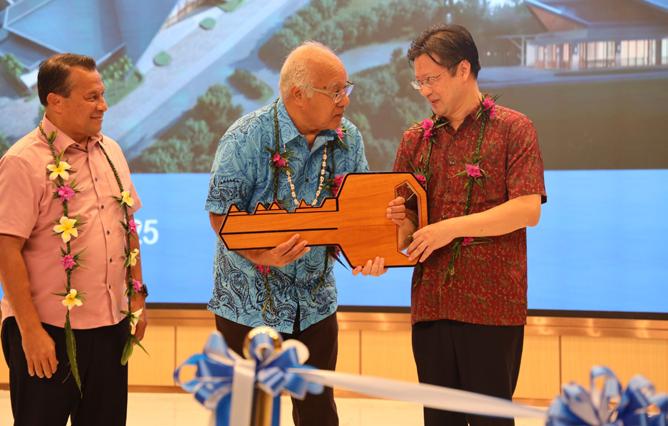
PALIKIR, POHNPEI— The Government of the Federated States of Micronesia (FSM) held an official handover ceremony for the newly completed FSM National Convention Center on May 16, 2025, a landmark project made possible through the generous support of the Government of the People’s Republic of China and the Guangdong Provincial Government.
His Excellency President Wesley W. Simina delivered the keynote address during the ceremony, emphasizing the
Click here for continuation on page 4

By Bill Jaynes
May 25, 2025
FSM—The FSM Office of the National Public Auditor (ONPA) recently released a global cooperative performance audit of the implementation of climate change adaptation and actions in the FSM, finding that improvements need to be made.
The performance audit is the first of its kind in the history of FSM climate change activities since the nation signed the United Nations Framework Convention on Climate Change (UNFCCC) in 1992. ONPA’s audit— one of nine conducted in Small Island Developing States—will be included in an overarching global overview report for international stakeholders and events,


including the United Nations Climate Change Conference COP30. Prior to that event, PASAI (Pacific Association of Supreme Audit Institutions) will compile a regional overview report from the nine Pacific Islands audits of Climate Change Adaptation Actions in each of the countries.
As a general summary, ONPA concluded that improvements are
needed in the coordination of climate change adaptation actions in the FSM. Specifically, the audit had five principal findings:
1. The National Adaptation Plan (NAP) is yet to be developed under the ongoing Green Climate Fund (GCF)-funded project;
Click here for continuation on page 13


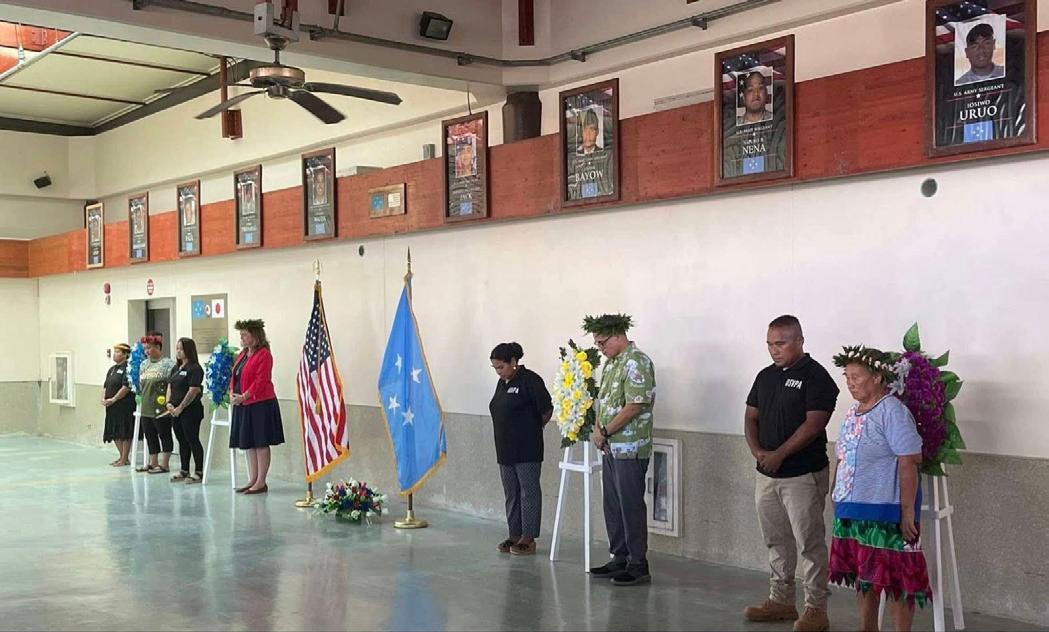
Embassy of the United States to the FSM
May 28, 2025
Pohnpei—On May 27, the FSM Office of Veterans Affairs, in coordination with the U.S. Embassy and U.S. Veterans of Pohnpei Association (USVPA), hosted a Memorial Day ceremony at Pohnpei International Airport’s arrival lounge where the portraits of 10 FSM citizens who lost their lives while serving in the U.S. military in Afghanistan, Iraq, and Kuwait are displayed.
U.S. Ambassador Jennifer Johnson gave special remarks, honoring not only the fallen service members who paid the ultimate sacrifice, but also those they left behind. “To the families who have lost sons and

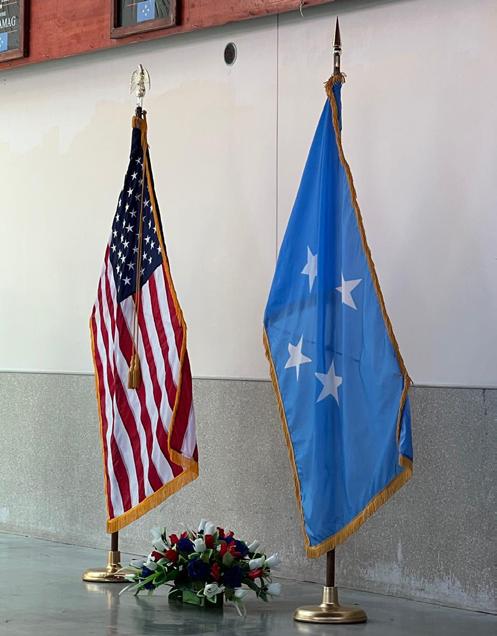
daughters, husbands and wives, brothers and sisters – no words can ease your pain…. but I hope you can find some peace when you think about the great times you shared together,” she stated.
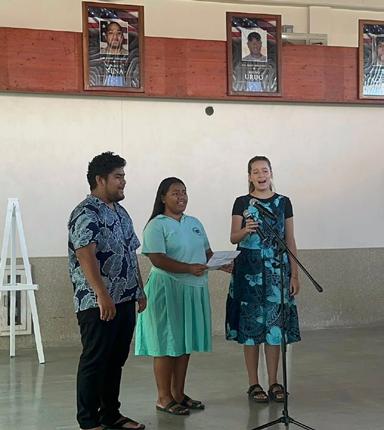
Memorial Day began after the Civil War as a day to remember the brave men and women who made the ultimate sacrifice in service to freedom and peace while serving in the U.S. Armed Forces – of which many FSM citizens have proudly served. With each passing year, families and friends all around the world continue to decorate the
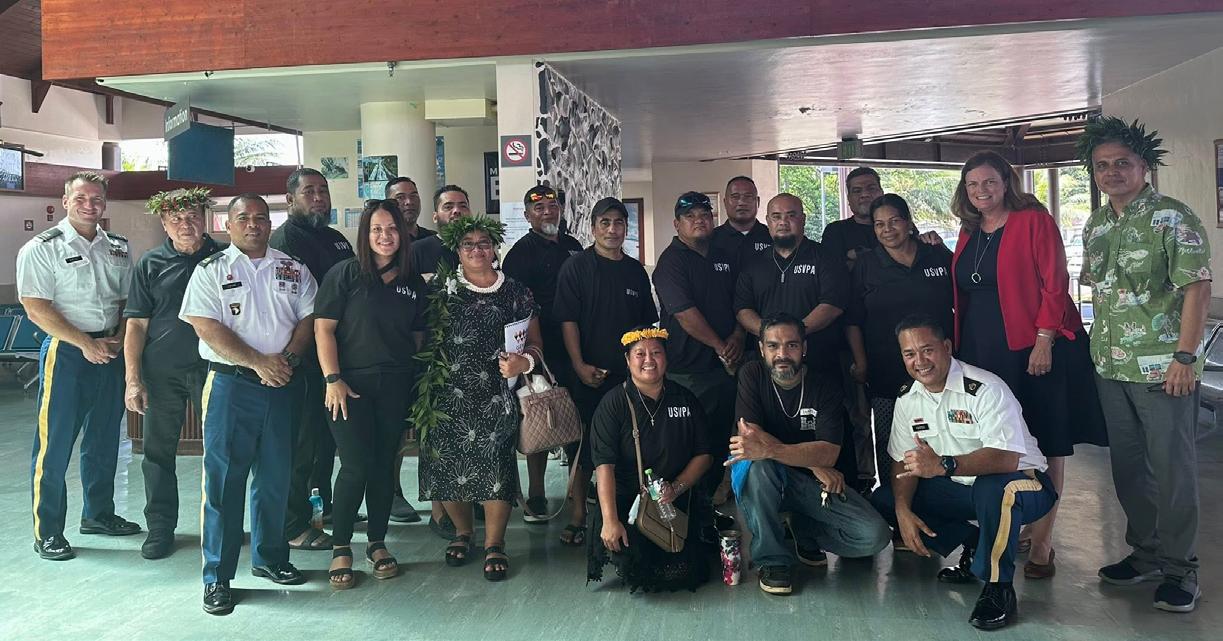
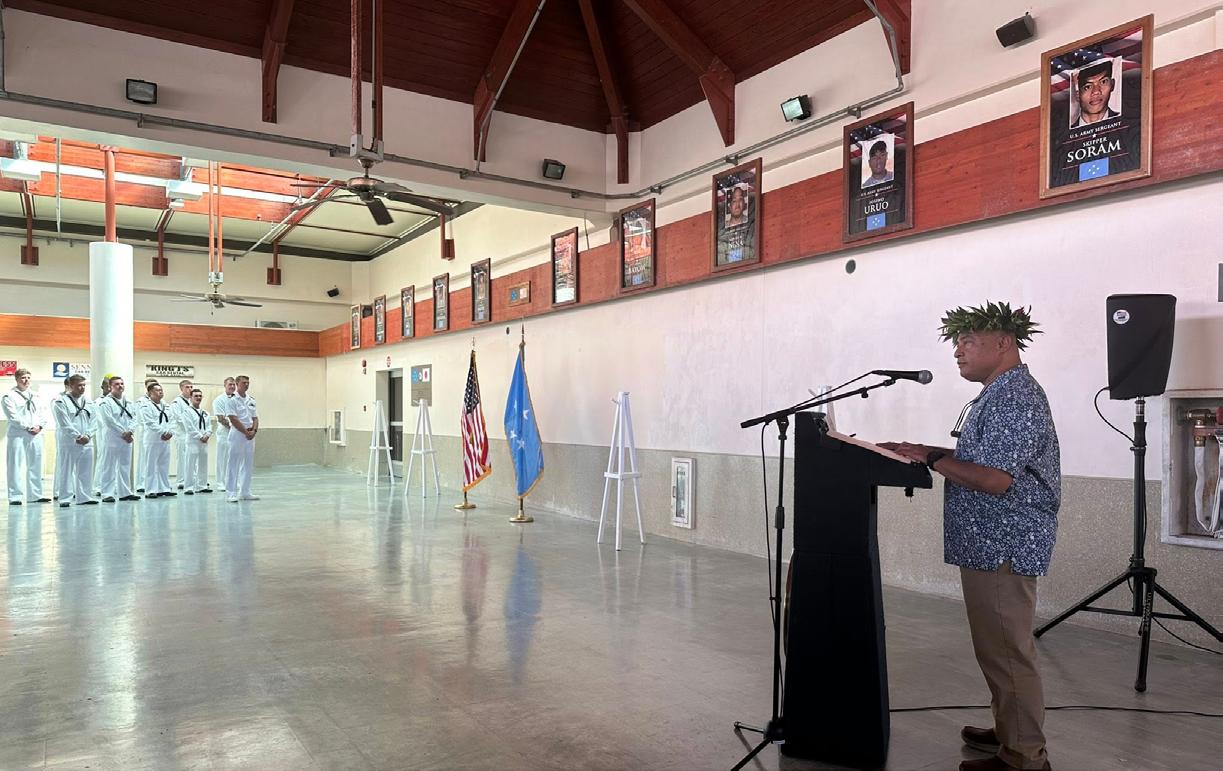
graves of their lost soldiers with flowers and wreaths. Ambassador Johnson’s hometown, Waterloo, NY, is known as the “Birthplace of Memorial Day.” President Lyndon B. Johnson made this declaration to recognize Waterloo in 1966. This year represents FSM’s 24th observance of Memorial Day.

The unique relationship between the United States and the FSM is built on a foundation of shared values and mutual respect that allow citizens of both countries to stand together through times of peace and conflict, bound by a commitment to democracy, human rights, and the rule of law. The Compact of Free Association symbolizes this long enduring partnership. “This bond is not just a matter of policy, but of deep personal connections and shared histories,” Ambassador Johnson remarked in paying her tribute to the fallen heroes and their family members. “Talking about those that we have lost is a way to keep their spirit alive. I hope you can tell some stories today and every day, so their legacy lives on,” she said.
The program included an outstanding performance by Pohnpei SDA School’s Choir singing the national anthems, speeches in honor of the

Pohnpei Public Information
May 18, 2025
Guam—The Pohnpei State Government, in collaboration with the FSM Consulate General’s Office in Guam, hosted a well-organized and well-attended town hall meeting that brought together Pohnpeian citizens living in Guam for an evening of open dialogue, meaningful exchange, and shared commitment to the future of Pohnpei.
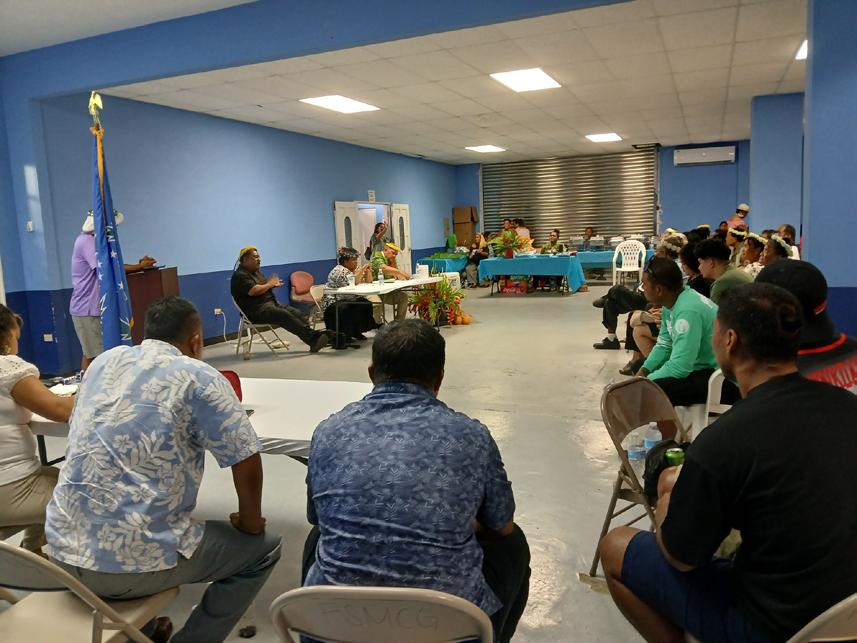
Leading the delegation was Governor Stevenson A. Joseph, accompanied by Director of the Department of Treasury and Administration, Ms. Sihna N. Lawrence, and Special Assistant to the President of the Federated States of Micronesia, Mr. Jack Harris. The town hall featured active participation and thoughtful input from the community.
Key issues discussed during the meeting included:
Translation Assistance for Driver’s
Licenses: Community members raised concerns about difficulties faced by Pohnpeians with limited English proficiency. The delegation acknowledged the challenge and noted the need for practical support solutions.
Cultural and Traditional Revival: The importance of preserving language, customs, and traditional knowledge was discussed. Governor Joseph highlighted the Indigenous Learning Recovery Project currently being piloted in select elementary schools in Pohnpei and referenced the FSM Government’s broader initiative to
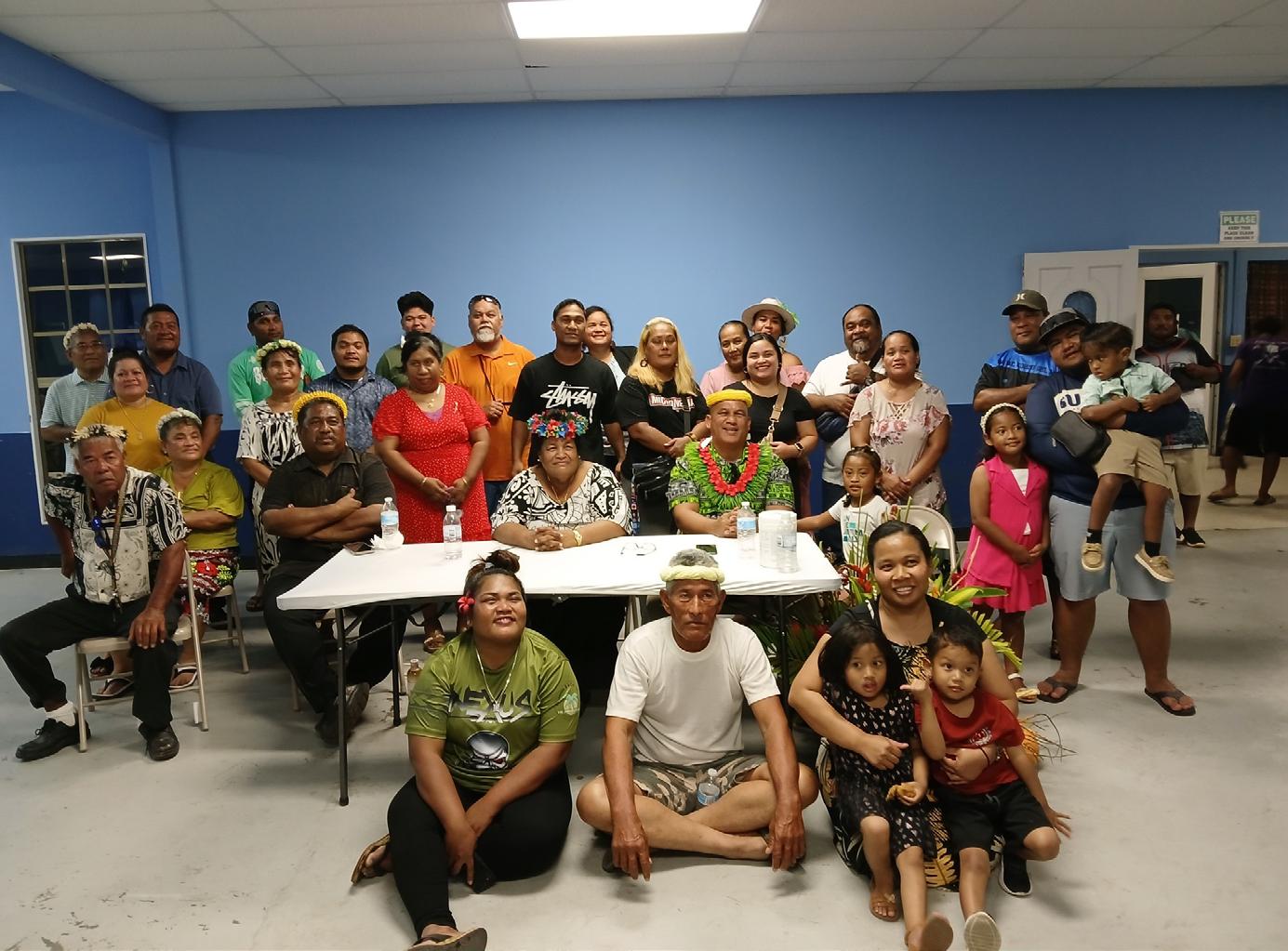
incorporate traditional knowledge and language into school curricula.
Dual Citizenship: The topic drew attention and interest from participants, who expressed a desire to see continued dialogue and progress on this matter at the national level.
FEMA Assistance: Clarification was provided that FEMA benefits are not currently available to FSM citizens. The topic emphasized the importance of resilience planning and alternative forms of support.
Minimum Wage and Economic Click here for continuation on page 18


Continued from front page
significance of the convention center as both a physical structure and a powerful symbol of the strong partnership between the FSM and China.
The national convention center was first envisioned under the leadership of former President Peter M. Christian, continuing under former President David W. Panuelo’s administration, and has now concluded under President Simina’s administration.
The ceremony was attended by national leaders, members of Congress, state officials, representatives of the diplomatic corps, and invited guests, including His Excellency Wu Wei, Ambassador of the People’s Republic of China, and Deputy Director-General He Rusheng from the Guangdong Provincial Government.
Importantly, the traditional leadership of Sokehs—Wasalapalap Nahnpwutak Pukiniap, Nanmwarki of Sokehs, along with the Isonahnken, Nahnalek, and Nahnkeniei of Sokehs—graced the event with their presence, underscoring the cultural and historical importance of the land and the occasion.
President Simina highlighted the growing international presence in the FSM, particularly in Pohnpei, where the new convention center is expected to play a pivotal role in hosting high-level national, regional, and global events. With this enhanced capacity, the FSM is poised to become a regional hub for diplomacy, development coordination, and economic cooperation.
The President also announced that the FSM has successfully secured the hosting rights for the 2027 biennial conference of the Secretariat of the Pacific Community, one of the many opportunities the new facility is expected to attract. In this light, he called on national stakeholders and local financial institutions to seize the opportunity and invest in complementary sectors such as hospitality and housing, which are critical to sustaining the country’s growing profile on the international stage.
The Government of the FSM expresses its deepest appreciation to the Government of the People’s Republic of China for its steadfast support, and to the Guangdong Provincial Government for its instrumental role in bringing this project to fruition. The completion of the FSM National Convention Center marks not only the completion of a key infrastructure project, but the opening of a new chapter of progress and partnership for the nation.
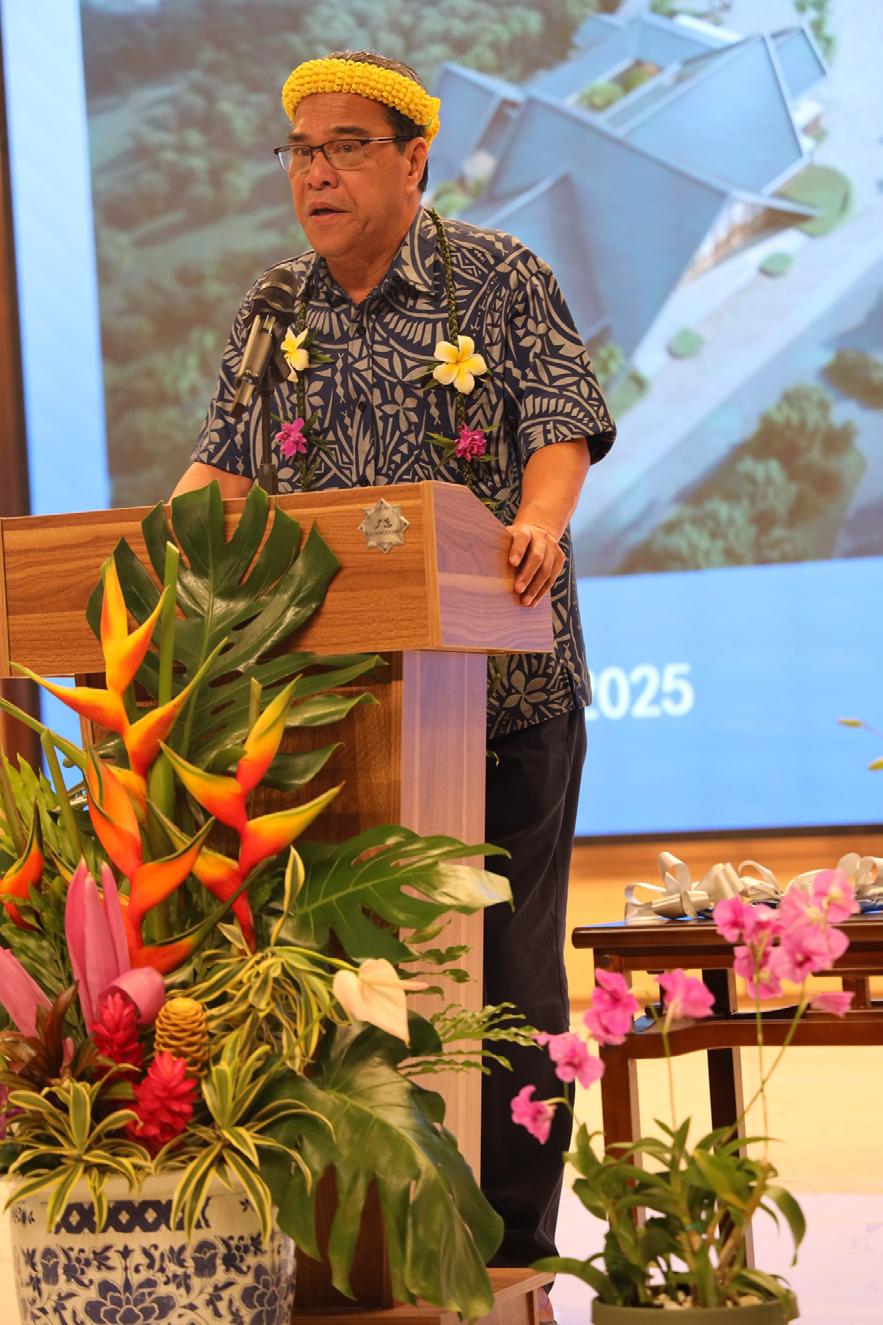

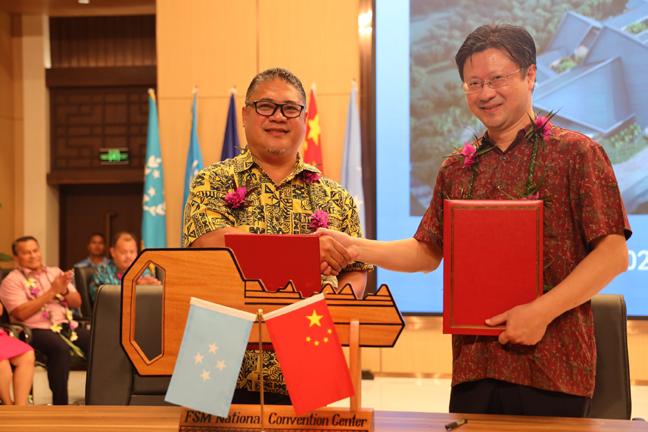


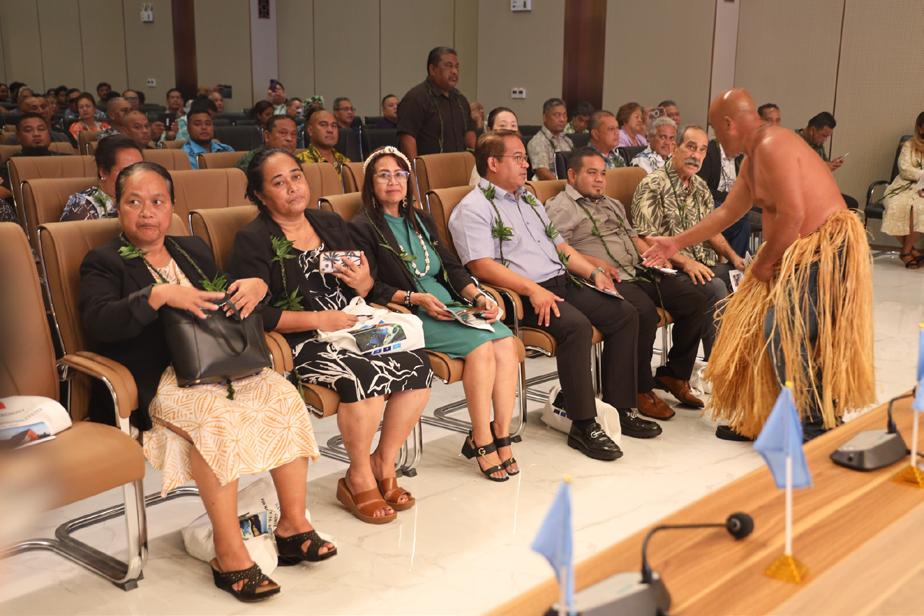
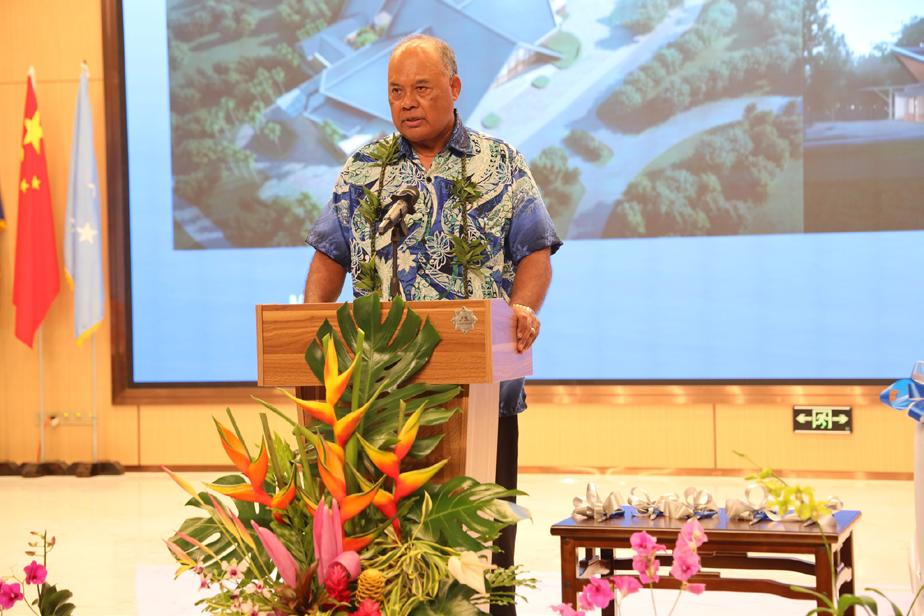
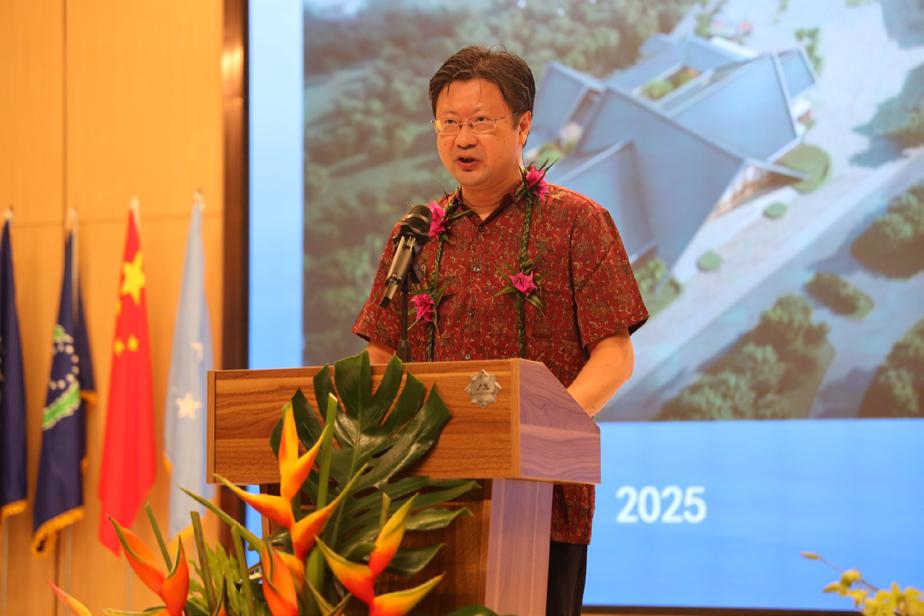
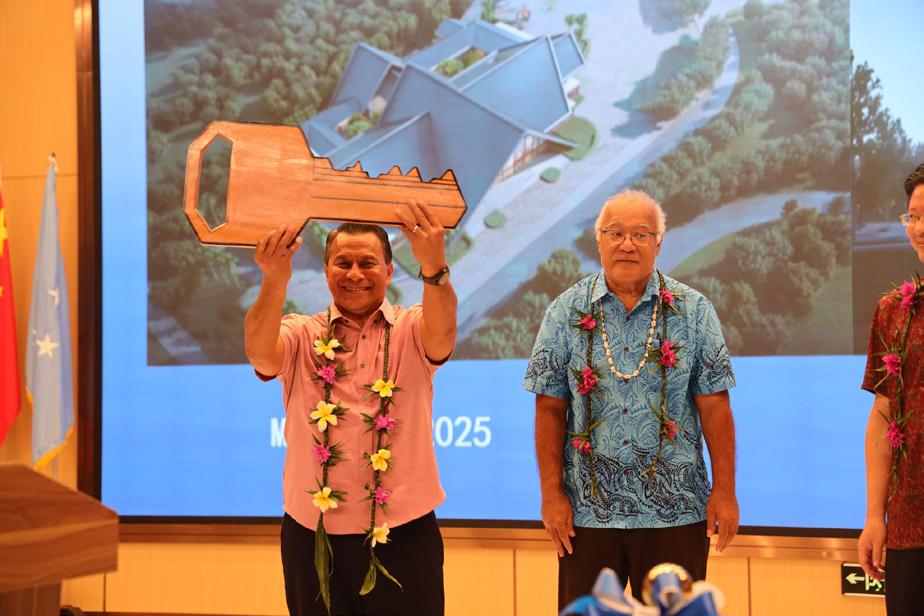
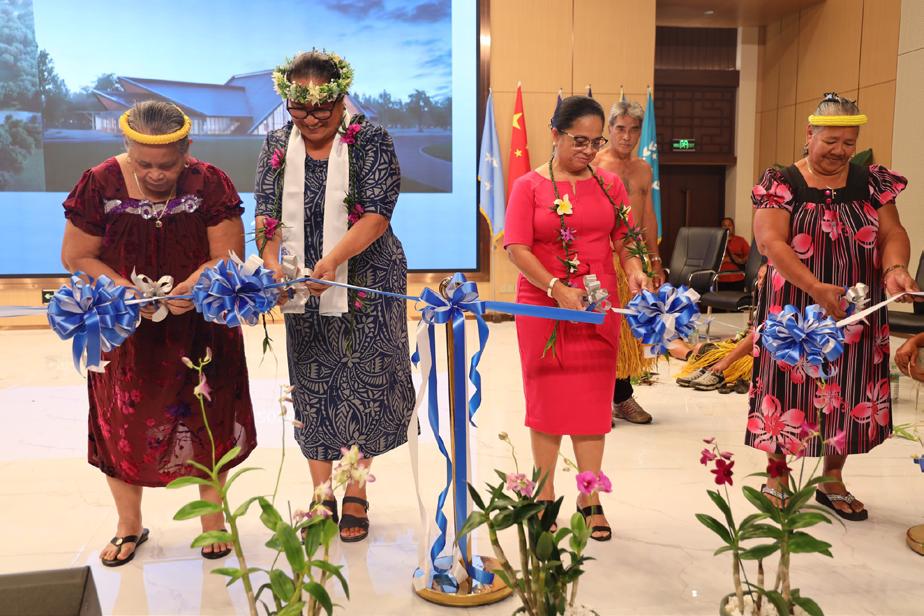
Continued from page 2
heroes from both countries, and a presentation of wreaths in honor of the

10 fallen soldiers. Director of FSM’s Office of Veteran’s Affairs Hainrick Panuelo provided opening remarks where he reflected on the value of Memorial Day as a time when everyone gathers and recalls those who made the final full measure of devotion while serving in the military and have passed on.
Thank you to everyone who turned out to share this special day with us and remember those who gave the ultimate sacrifice. May they never be forgotten.


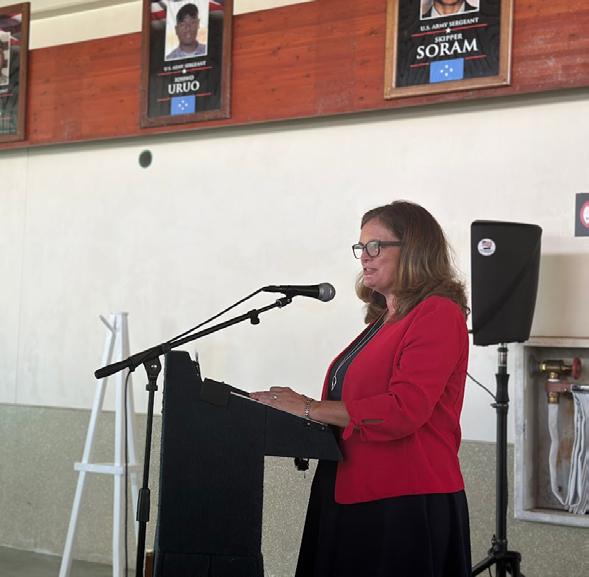
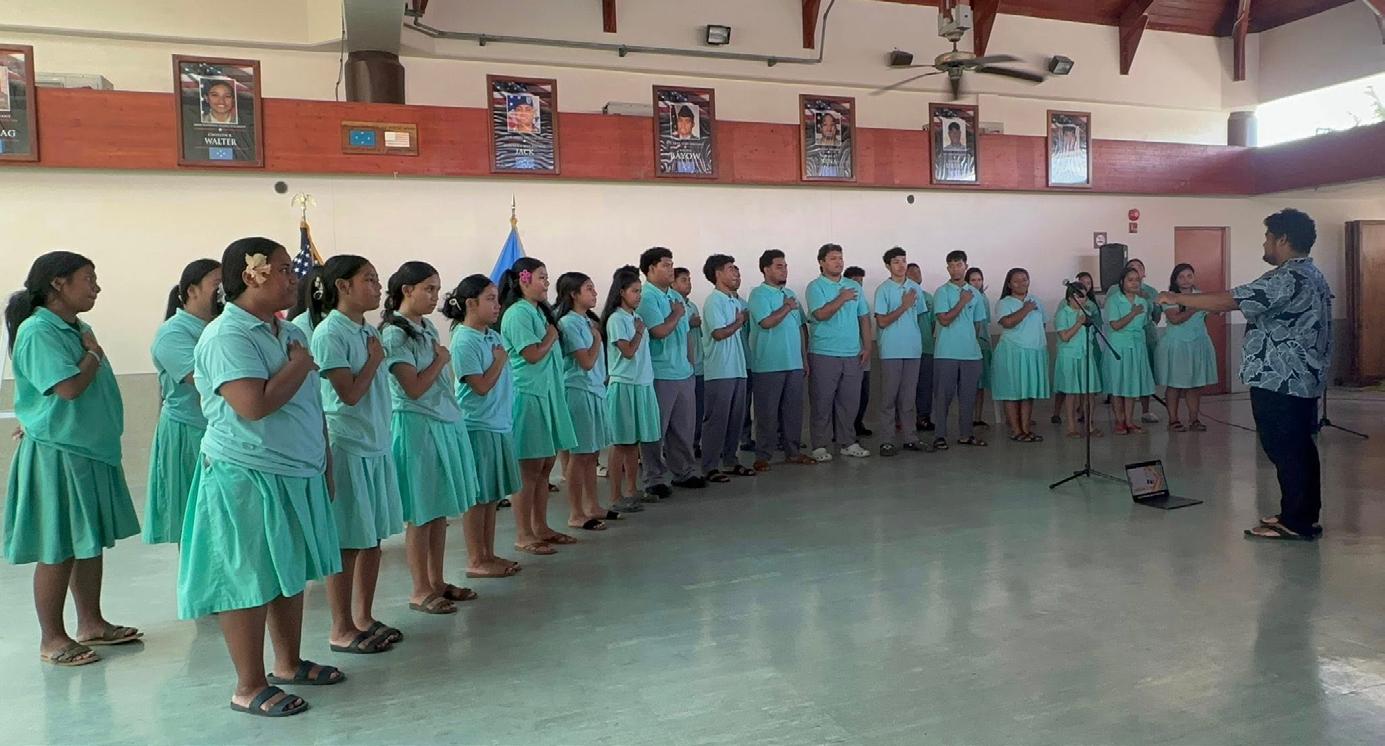


The Forum (PIF) is an Employer of Choice in the region, aiming to recruit and employ staff based on merit and organisational needs. The Secretariat ensures that its employment selection upholds its values and commitment to Forum membership, gender balance, and building a diverse and inclusive organisation. The PIFS is committed to achieving gender balance and being fully representative of our member countries. Our workforce is currently over 50% female, and we have representatives from fifteen of the eighteen Forum member countries.
To achieve greater workforce representation from our member countries we strongly encourage applicants from the following countries to apply: Federated States of Micronesia, French Polynesia, and Niue
The Communications Officer - Public Affairs will support the coordination of media initiatives including sourcing relevant news stories, writing and distributing Forum media releases, and the targeted roll-out of Forum media/ publicity work.
For this position, the PIFS is seeking an experienced media professional, who is confident in his/her ability to communicate easily via both written and verbal mediums, to draft high quality communications outputs including media releases, digital products, speeches, and articles. The key responsibilities are summarised as:
• Develop and implement media and public relations plans and activities.
• Build the internal capacity of staff in dealing with media and build regional media capacity to understand and report on key PIF initiatives and priorities.
• Strengthen relationships with media outlets.
Applicants should have a bachelor’s degree in Communications, Journalism, Media, or any other relevant Social Sciences discipline, with at least five years of experience, and a comprehensive understanding of the operations of a Pacific newsroom, including media ethics, cultural sensitivities, audience engagement, representation, and with language and communication styles within the Pacific.
The position carries a competitive and attractive remuneration and benefits package including allowances for housing and education; and medical, accident and life insurance coverage. This position is based at Band 10 of the PIFS salary scale. The starting salary for the position is SDR 32,437 per annum, which is equivalent to FJD 97,908.
Interested applicants are encouraged to apply through the PIFS website: www. forumsec.org where an information package containing the position description and full remuneration details are available. Candidates must include in either their application or Curriculum Vitae the full contact details of three referees. To be eligible for the position, applicants must be nationals of Forum member countries. The Forum Secretariat is an Equal Opportunity Employer. The deadline for applications is 13 June, 5pm (Fiji Time).
*Member States of the Pacific Islands Forum: Australia, the Cook Islands, the Federated States of Micronesia, Fiji, French Polynesia, Kiribati, Nauru, New Caledonia, New Zealand, Niue, Palau, Papua New Guinea, the Republic of the Marshall Islands, Samoa, the Solomon Islands, Tonga, Tuvalu, and Vanuatu.

May 20, 2025
Pohnpei—On May 20, 2025, Governor Stevenson A. Joseph warmly welcomed Dr. Victoria Keener, Senior Fellow with the Research Program, and Ms. Chelsey Bryson, Project Specialist, from the East-West Center in Honolulu during a courtesy visit to the Governor’s Office.
The East-West Center is a renowned institution dedicated to promoting better relations and understanding among the peoples and nations of the United States, Asia, and the Pacific. Many leaders across Micronesia are proud alumni of the Center, including Governor Joseph’s own father, a legacy that the Governor fondly acknowledged during the meeting.
Dr. Keener and Ms. Bryson introduced
a powerful new computer program that creates detailed flood maps, tracks sea level rise, and overlays digital elevation data to highlight potential risks to critical infrastructure. Governor Joseph expressed appreciation for their support, emphasizing how valuable such data is to better prepare Pohnpei for the impacts of climate change— particularly in safeguarding public infrastructure.
Governor Joseph also encouraged the East-West Center team to expand their assistance across other state departments that could benefit from data-driven planning and climate adaptation tools. He affirmed Pohnpei’s commitment to working closely with partners like the East-West Center to build a safer, more resilient future for all.
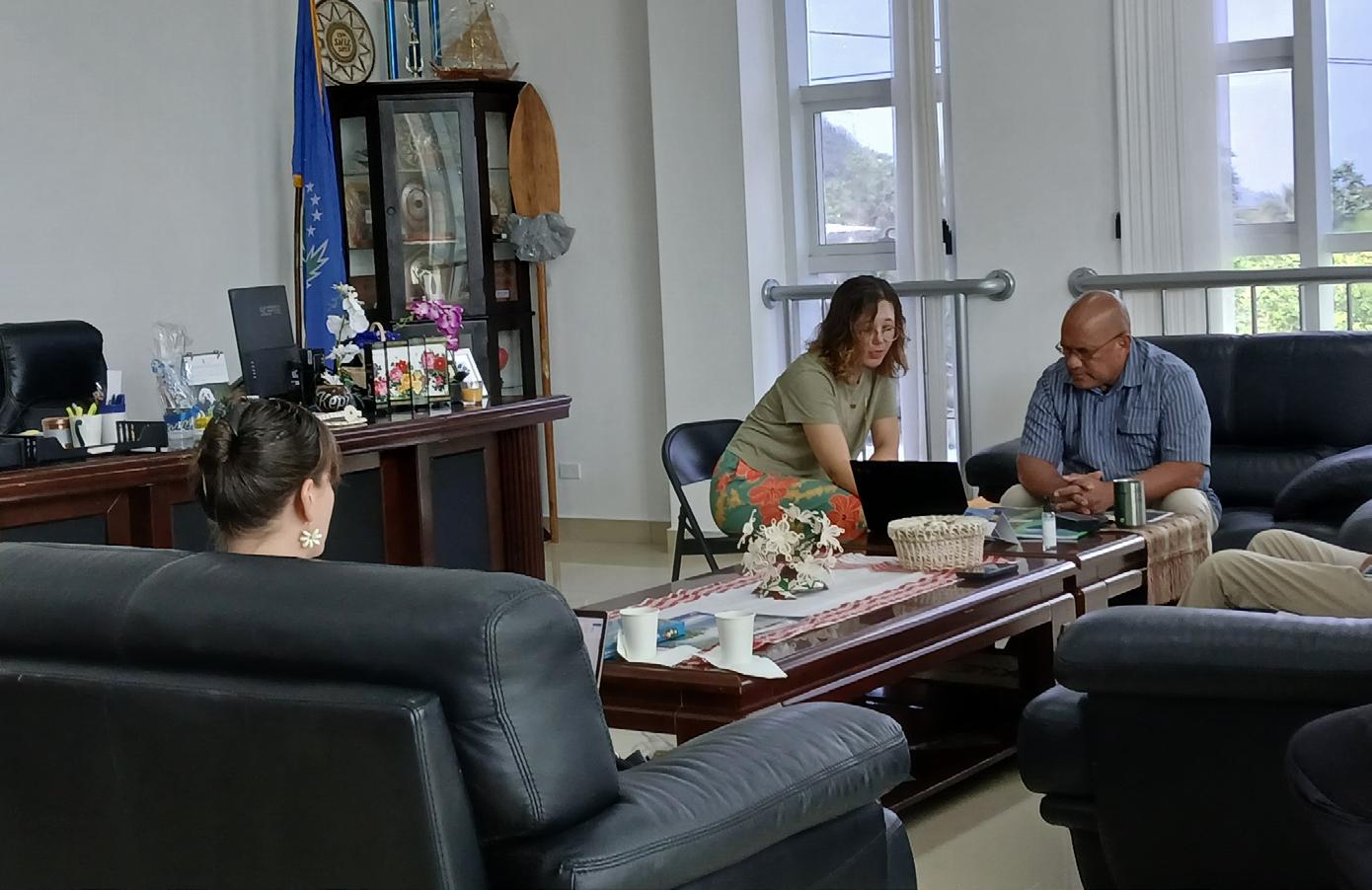
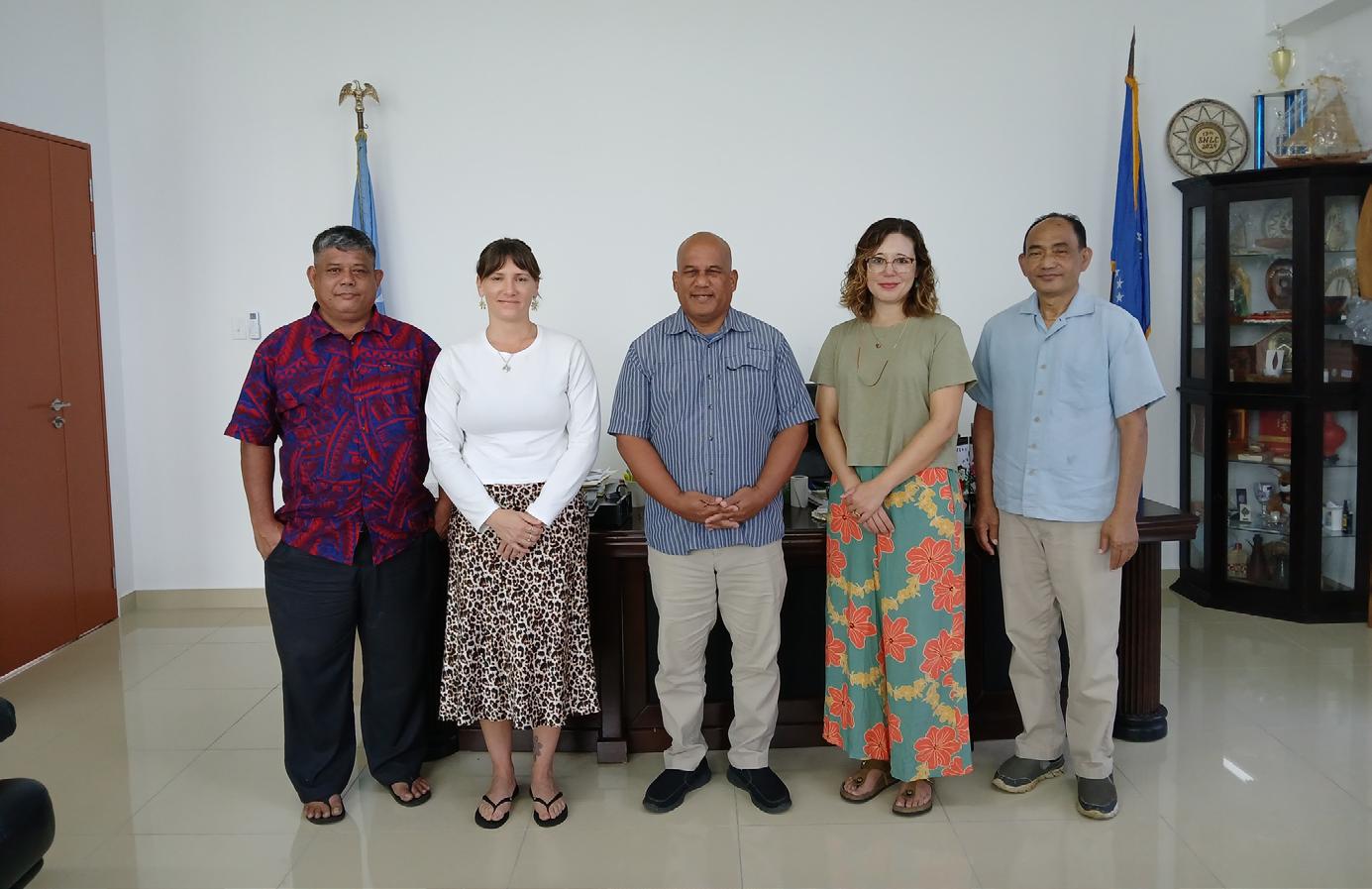
May 13, 2025 Okat, Kosrae—In a significant step for border security and environmental protection, a new X-ray scanning machine was officially handed over to Kosrae State in a ceremony attended by national and state dignitaries, technical experts, and development partners.
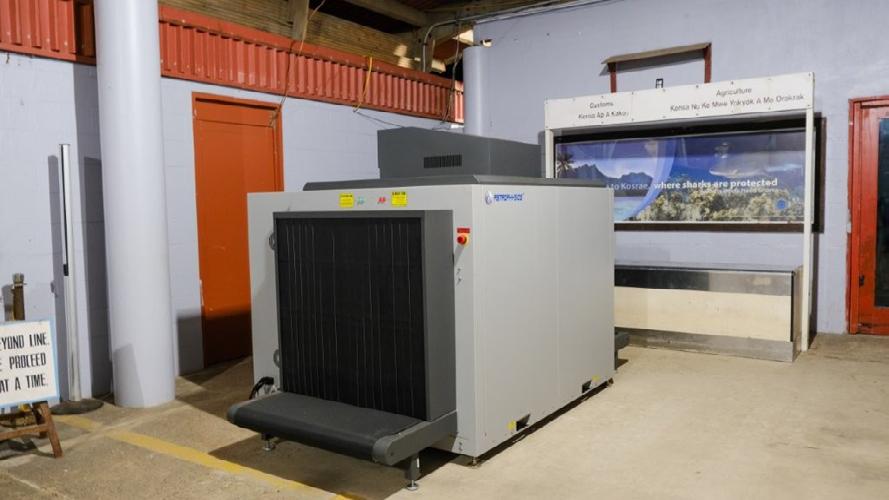

The ceremony, held at the Kosrae International Airport, featured welcoming remarks from Lieutenant Governor Arthy G. Nena from Kosrae, and special remarks from Vice President of the Federated States of Micronesia (FSM), The Honorable Aren B. Palik, and United Nations Development Programme (UNDP) Deputy Resident Representative for the North Pacific, Kevin Petrini. The event culminated in the formal signing of the handover certificate and a symbolic photo session at the Kosrae International Airport Arrival Area.
This X-ray scanner, funded through the Global Environment Facility (GEF6) FSM Invasive Alien Species (IAS) Project, marks a major advancement in the nation’s efforts to enhance biosecurity, protect biodiversity, and maintain safe and efficient port operations. The project is implemented by the FSM Department of Resources & Development’s Agriculture Division, with technical assistance from UNDP.
In his welcoming remarks, Vice President Palik emphasized the broader significance of the equipment beyond border control, "This installation is about more than security—it’s about protecting our fragile ecosystems, safeguarding our biodiversity, and preserving the unique natural heritage of Kosrae and the FSM. We thank all partners and especially UNDP for standing with us. Your unwavering support has helped turn this vision into reality.”
Kevin Petrini, speaking on behalf of UNDP, highlighted the scanner as a symbol of global-local partnership in confronting the threats of invasive alien
species. "What may seem like a modest device is in fact a powerful tool—one that will allow Kosrae to detect and prevent the entry of threats like the little fire ant and brown tree snake. It represents our collective resolve to preserve FSM’s natural environment and the communities that depend on it.”
The journey to this handover began with the identification of critical gaps in FSM’s biosecurity infrastructure. Through the GEF6 FSM IAS Project, the procurement process was launched, leading to the delivery and successful installation of the scanner at Kosrae International Airport. Training for local operators was conducted, ensuring that airport and quarantine personnel are fully equipped to utilize the technology effectively and sustainably.
This handover event reflects the culmination of that effort, uniting leadership at all levels, from a national vision to grassroots action. The FSM National government, in close coordination with the Kosrae State Government and UNDP, has demonstrated its commitment to long-term ecological resilience and development.
As the FSM continues to face growing pressures from climate change and globalization, this investment in early detection and prevention marks a proactive step forward in building a more secure and sustainable future.
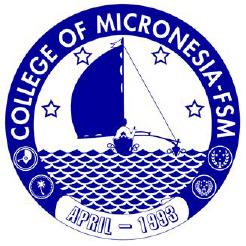

| Chuuk | Pohnpei | Kosrae


PALIKIR, POHNPEI – May 26, 2025
– The College of Micronesia-FSM (COM-FSM) proudly celebrated its 81st Commencement Exercises and Graduation Ceremony on May 22, 2025 at the FSM-China Sports Center. The Spring Graduating Class of 2025, operating under the inspiring theme “The Tassel is Worth the Hassle,” saw 167 graduates capped from 24 diverse programs. These programs ranged from certificate levels to Associate of Arts and Science degrees, and Bachelor’s programs, encompassing a wide array of fields such as electronic engineering technology, telecommunications, motor vehicle mechanics, hospitality and tourism, Micronesian studies, education, and agriculture & natural resource management.
The graduating class represented all COM-FSM campuses:
• National Campus: 101 graduates
• CTEC: 28 graduates
• Chuuk Campus: 17 graduates
• Yap Campus: 15 graduates
• Kosrae Campus: 6 graduates
Additionally, 13 students received Certificates of Achievement from the FSM Fisheries and Maritime Institute (FMI) in Yap two days prior, during a combined graduation ceremony with the Yap Campus. The commencement ceremony drew approximately 500 attendees, including esteemed dignitaries, government officials, and the proud families of the graduates. Dr. Theresa Koroivulaono, President and CEO of COM-FSM, extended a warm welcome to all in attendance. She addressed the graduates with encouraging words, stating, “Wear the tassel with pride. You’ve earned it. Congratulations—and never forget: the hassle was real, and today, so is the reward.”
The Honorable Belsipa MikelIsom, Attorney General for Pohnpei
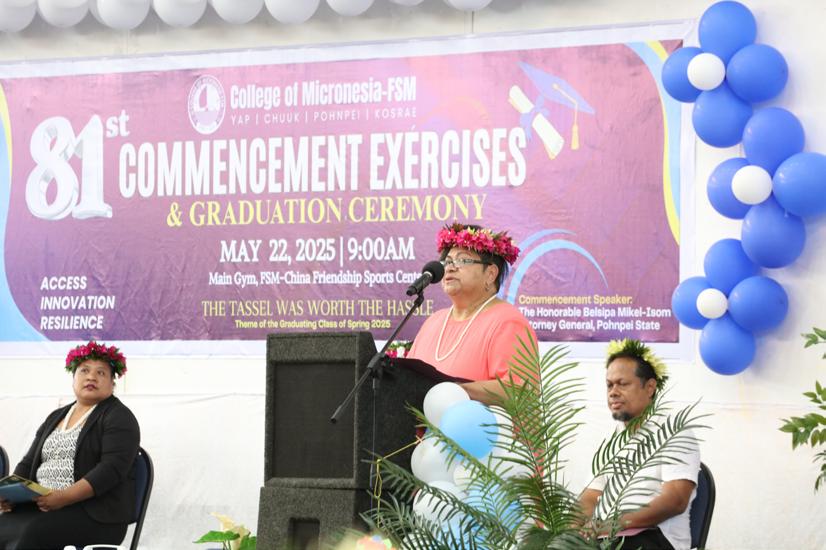
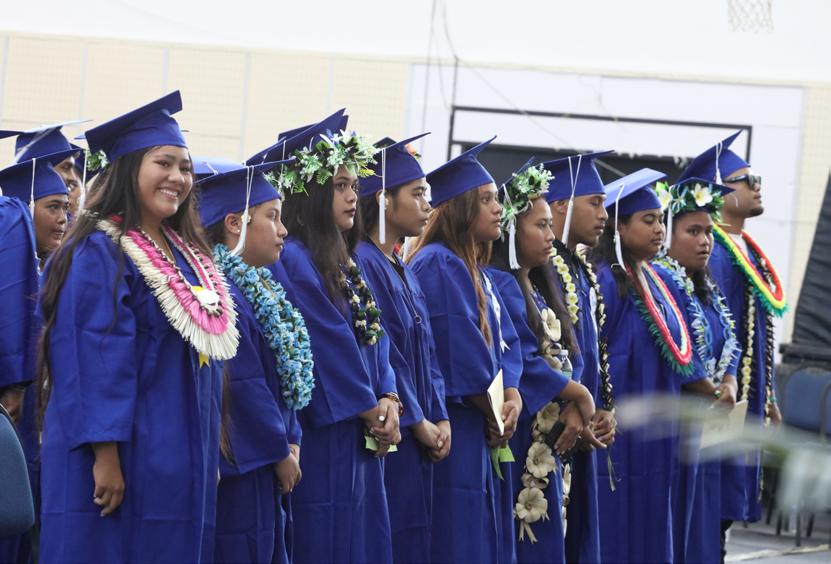
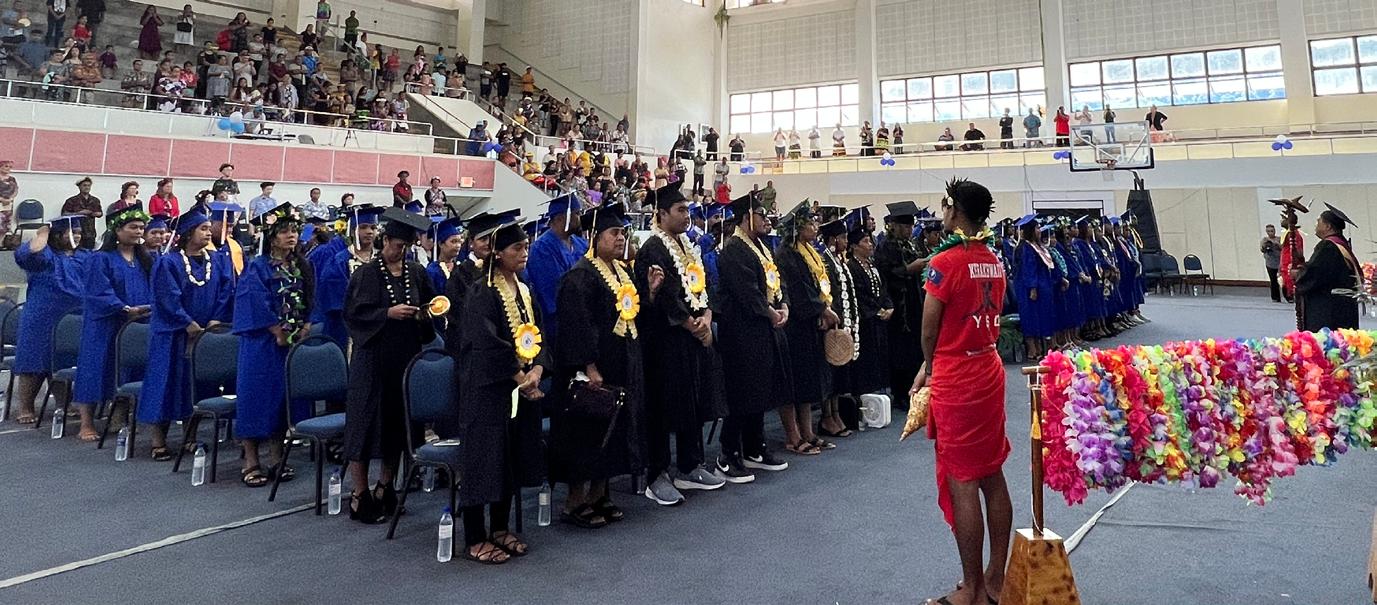
State, served as this semester’s Commencement Speaker. She imparted valuable wisdom to the graduates, emphasizing, “When you’re educated and empowered, you improve the world.”
The Spring 2025 Academic Honors were awarded to the following outstanding students:
• Summa Cum Laude: Fiji Meshak Philip
• Magna Cum Laude: Collie Anne
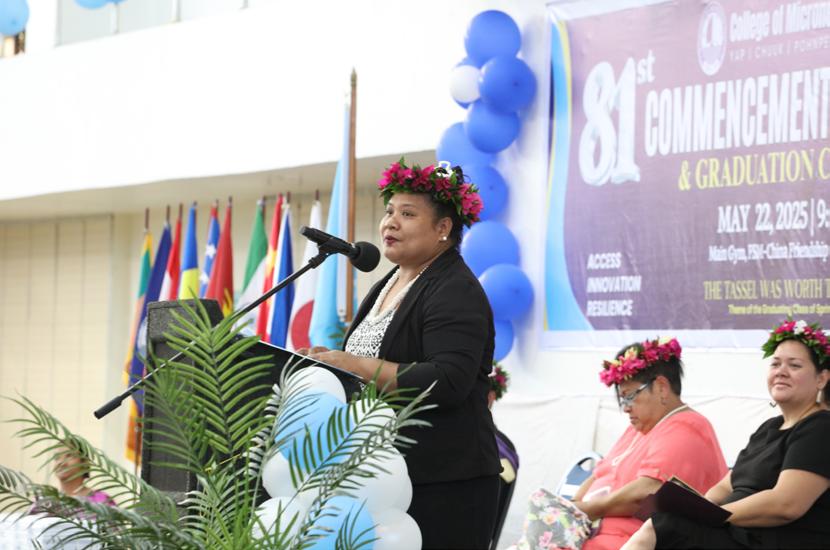
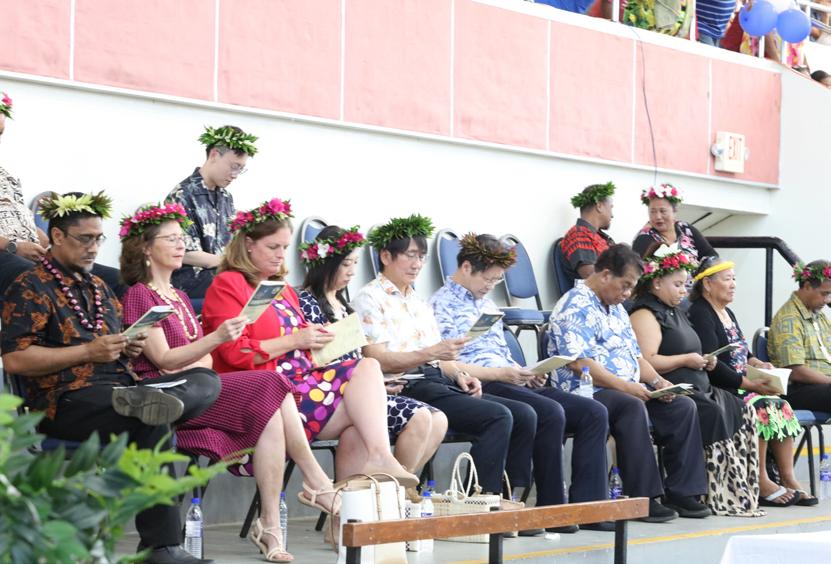
Abraham, Cory Kustin
• Valedictorians: Victoria Tiare’Mae Carl, Shawn David Gilimete, Elizabeth Marie Sorto-Sienes
• Salutatorian: Mernalova Sahm
The ceremony concluded with a performance by the COM-FSM Choir, who serenaded the audience with their hit song “Dreamers”.
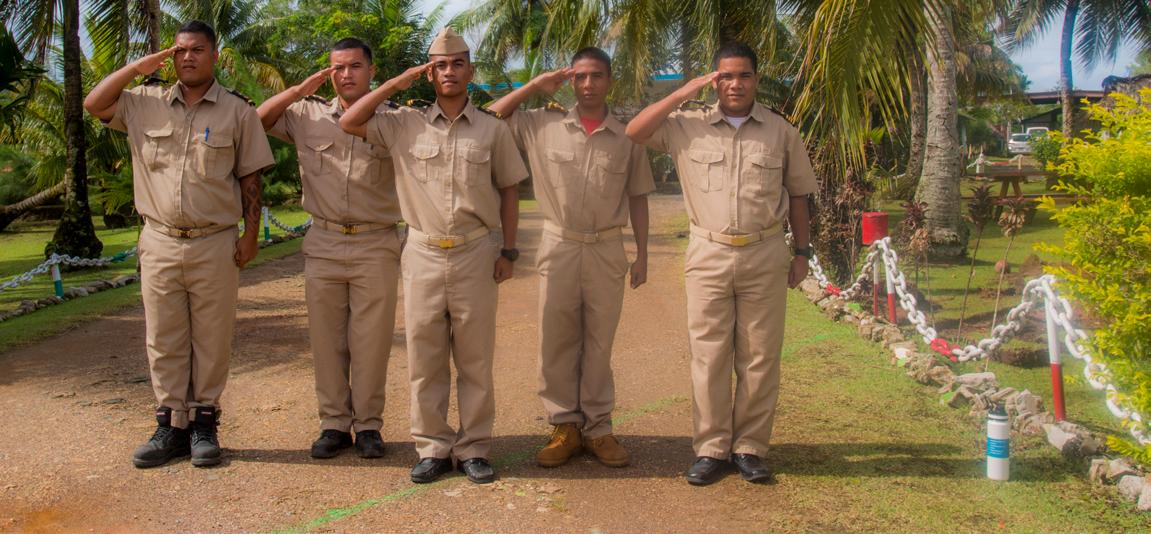
Phone: (691) 350 5244 E-Mail: fmi@comfsm.fm CONTACT US:


By Bill Jaynes
The Kaselehlie Press
May 28, 2025
Pohnpei—On May 17, 2025, the Pohnpei Fishing Club, along with several generous sponsors, held another exciting fishing tournament. Yellowfin tuna dominated the day's catches, with no wahoo or mahi mahi recorded and only two skipjack tuna landed.

The tournament was sponsored by MRAG, Pohnpei Hardware, Imelda’s Shoes, Mangrove Bay, Blue Nile, Panuelo Gas Station, Arnold’s Pizza, and INS. The winners of the biggest fish category each received $100 worth of gift certificates from Pohnpei Hardware and Imelda’s Shoes, along with cash awards. Cash prizes and $25 gift certificates were also awarded for the largest and secondlargest catches in seven different species categories—$125 for first place and $50 for second.
All of the top fish of the day were yellowfin tuna. The largest was a 73.8-pound catch by Jesse Panuelo, earning him $500 and





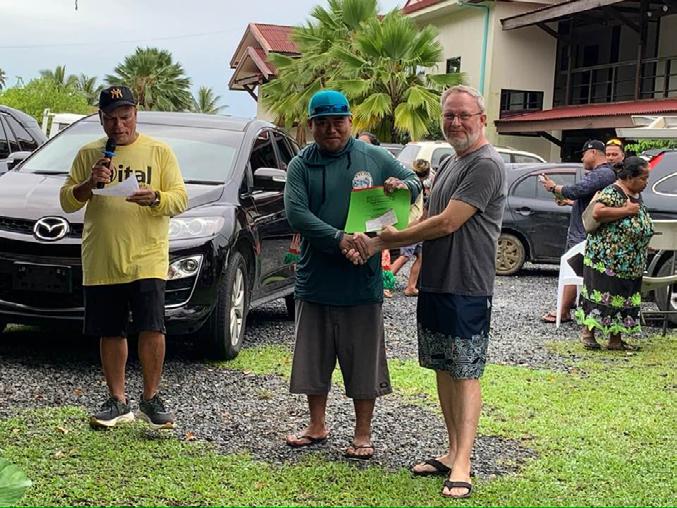
gift certificates. The second-largest fish was a 48.8-pound yellowfin caught by Westcott Panuelo, netting him a $350 cash prize. Canally Torres also caught a 49.8-pound yellowfin, tying with Westcott and receiving $350 as well. Hilarko David landed two impressive yellowfin—one at 46 pounds and another at 45.4 pounds— earning her a combined $350 for the fifthand sixth-largest fish of the day.
In the biggest fish by species categories not already awarded in the overall biggest fish competition, Santricko Ioanis landed a 44.8-pound yellowfin tuna, followed by Allois Malfitani with a 44-pounder.
Eidre Sharp had a successful day on the water, catching the only skipjack tuna at 11.4 pounds and also landing the largest barracuda at 23.4 pounds. She added to her winnings by catching the biggest giant trevally of the day at 8.8 pounds. Hilarko David came in just behind with an 8.2-pound trevally.
The only other skipjack tuna of the day, a 9.6-pounder, was caught by Yvonne Isaac.



Instead of receiving the $50 second-place prize in the skipjack category, she was awarded $150 as the top lady angler who had not already won a prize in another category.
The Pohnpei Fishing Club holds tournaments throughout the year. Stay tuned for announcements about future events!
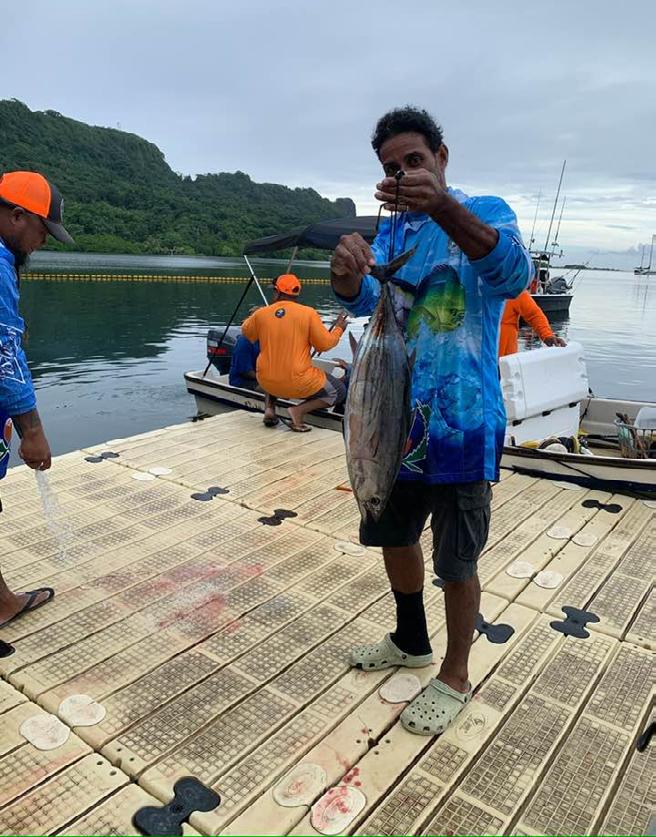

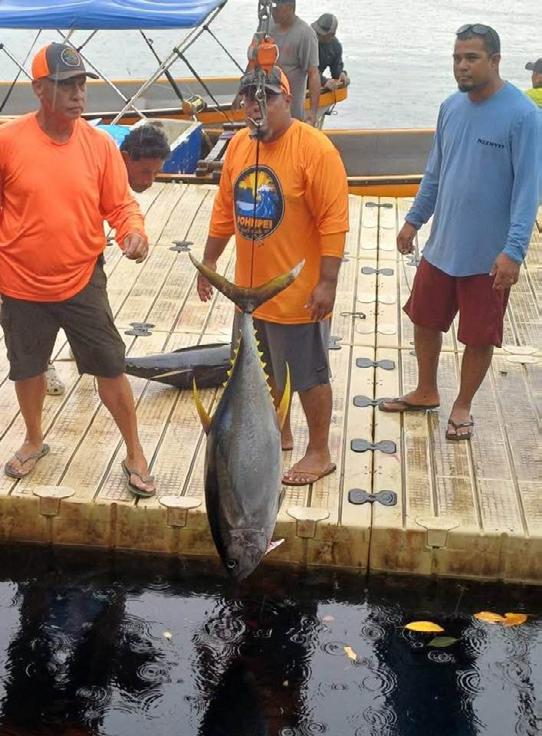

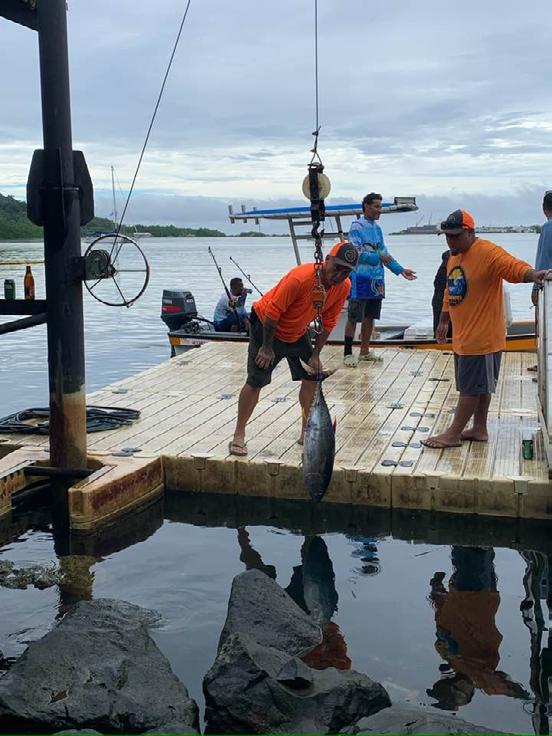
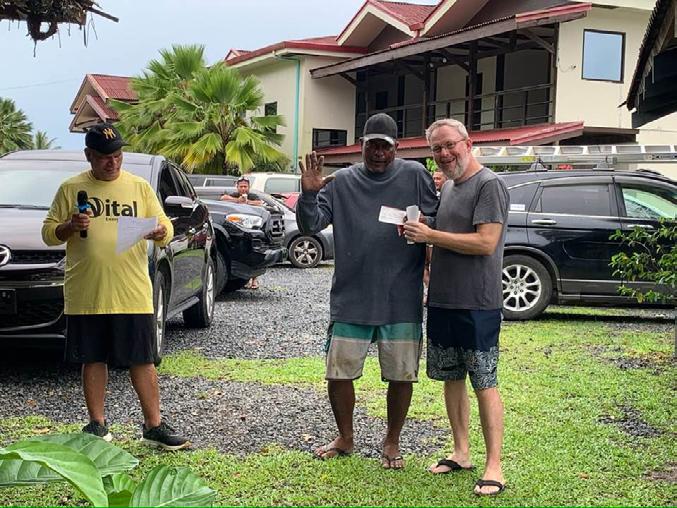



By Chief Warrant Officer Sara Muir U.S. Coast Guard Forces Micronesia / Sector Guam
SANTA RITA, Guam — The U.S. Coast Guard safely towed the 47-foot vessel Lucky Harvest to Hagåtña boat basin arriving shortly after 8 p.m. on May 17, 2025, after it was located on May 16 with the two mariners aboard disabled 125 nautical miles west of Apra Harbor reportedly due to an electrical failure.
The USCGC Myrtle Hazard (WPC 1139) crew transferred the tow to a Station Apra Harbor 45-foot Response Boat-Medium crew and the Sector Boarding Team offshore of Apra Harbor after a roughly 28 hour transit from the scene for the final 2.5-hour transit leg, arriving at Hagåtña and met by the vessel owner from Saipan, Guam Customs and Quarantine Agency, and other partners.
The mariners’ activation of their Emergency Position Indicating Radio Beacon (EPIRB) at 6:30 a.m. on May 16 allowed the Joint Rescue Sub-Center Guam watch to pinpoint the vessel’s location almost instantly. A U.S.
Coast Guard HC-130 Hercules airplane and crew from Air Station Barbers Point, Hawai’i, arrived on scene first using a line of bearing from the EPIRB to fly directly to the vessel, then vectoring in the U.S. Navy MH60 Knighthawk helicopter crew from Helicopter Sea Combat Squadron 25, who hoisted one mariner to safety by 9:30 a.m.
The Hercules crew remined overhead of the Lucky Harvest until the Myrtle Hazard crew arrived, retrieved the second mariner, and took the vessel safely in tow to Guam. The Sector Boarding Team and conducted a routine post-search-and-rescue boarding on the Lucky Harvest once in port with no negative findings.
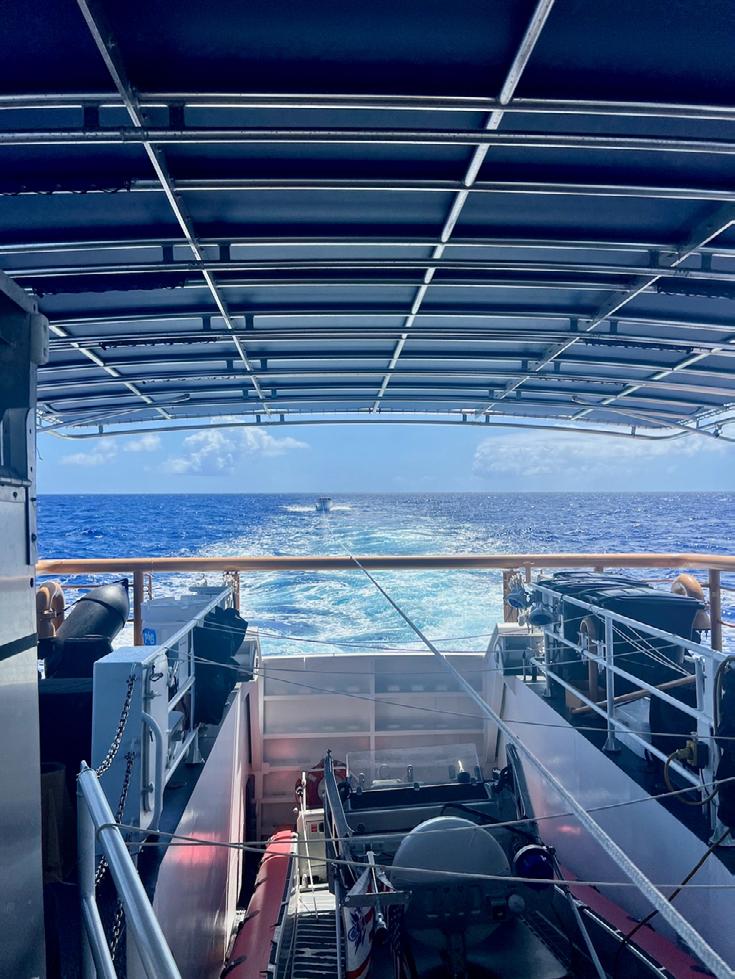
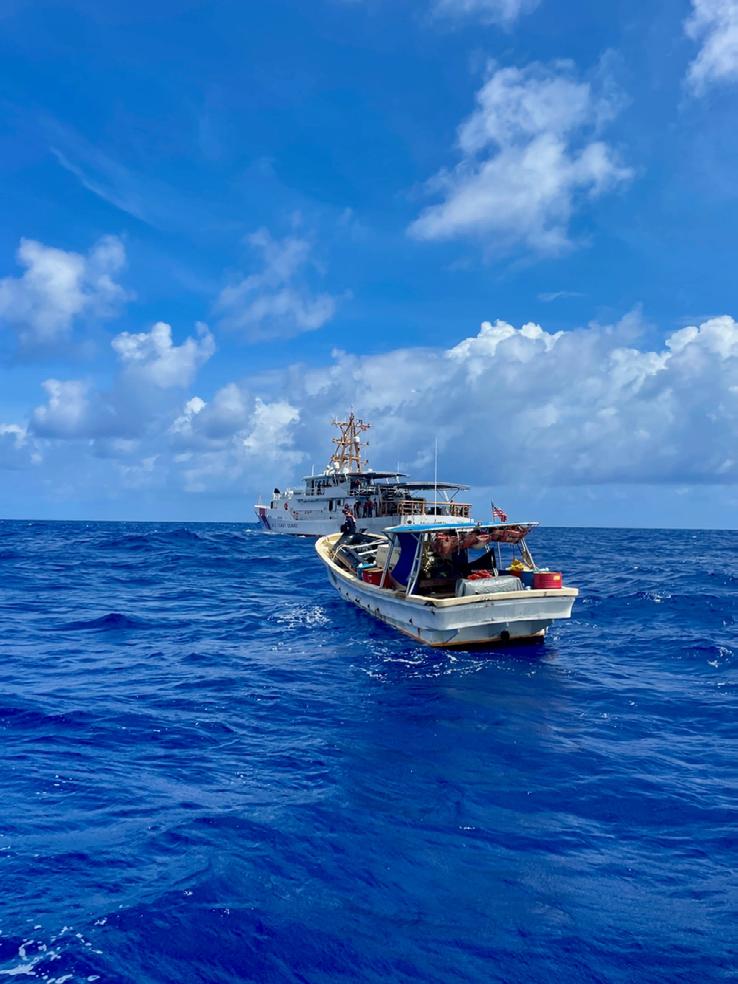
Previously reported missing after departing Alamagan Island, Commonwealth of the Northern Mariana Islands, on May 12, en route to Saipan, the Lucky Harvest crew’s rescue highlights the critical role of EPIRBs.
“The locator beacon enabled our rapid
response, bringing the mariners to safety within hours,” said Cmdr. Patton Epperson, search and rescue mission coordinator. “As National Safe Boating Week begins, the U.S. Coast Guard urges mariners to wear lifejacket, carry distress signaling devices, file float plans with family or friends and call for assistance before the situation becomes dire. Thank you to all our partners on this case.”
The search and rescue operation, further supported by the CNMI Department of Public Safety, a U.S. Navy P-8 Poseidon airplane and crew from Kadena Air Force Base, and the motor vessel Mama Loling’s crew, occurred amid east winds of 15 knots and seas of up to 6 feet becoming 2 to 3 feet. The cause of the electrical failure and delay in activating the beacon is under review.


Embassy of Australia to the FSM
May 22, 2025
Palikir, Pohnpei— Australian Ambassador to the Federated States of Micronesia (FSM), Jenny GrantCurnow, and her team recently took part in a workshop aimed at preventing gender-based violence (GBV), hosted by the US Veterans of Pohnpei Association (USVPA) at the College of Micronesia's Palikir campus.
The workshop was part of an ongoing project supported by the Australian Government through its Direct Aid Program (DAP). USVPA is using the grant to collaborate with the Micronesian Legal Services Corporation in delivering outreach activities focused on raising awareness of GBV among college students and youth from various church-based communities across Pohnpei.
The initiative aims to equip young people with knowledge about the different forms and types of domestic violence, its impact on women, children, families, and communities,
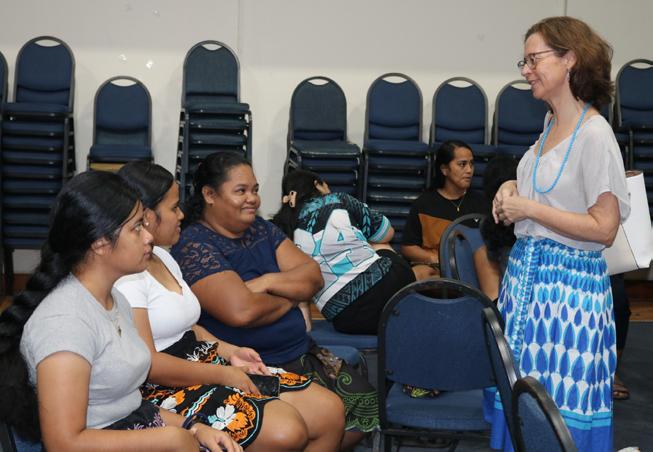
and the legal protections available under FSM law. Participants are also being familiarized with support services available for victims of domestic violence.
During the workshop, Ambassador Grant-Curnow emphasized the importance of ensuring equal rights and opportunities for women and girls, and the need to eliminate violence and discrimination. “Everyone deserves to live free from fear, and that includes women and girls,” she stated.
DAP is a flexible, small grants scheme offering up to USD $20,000 for sustainable, community-driven development projects. Applications for the 2025–2026 round of DAP
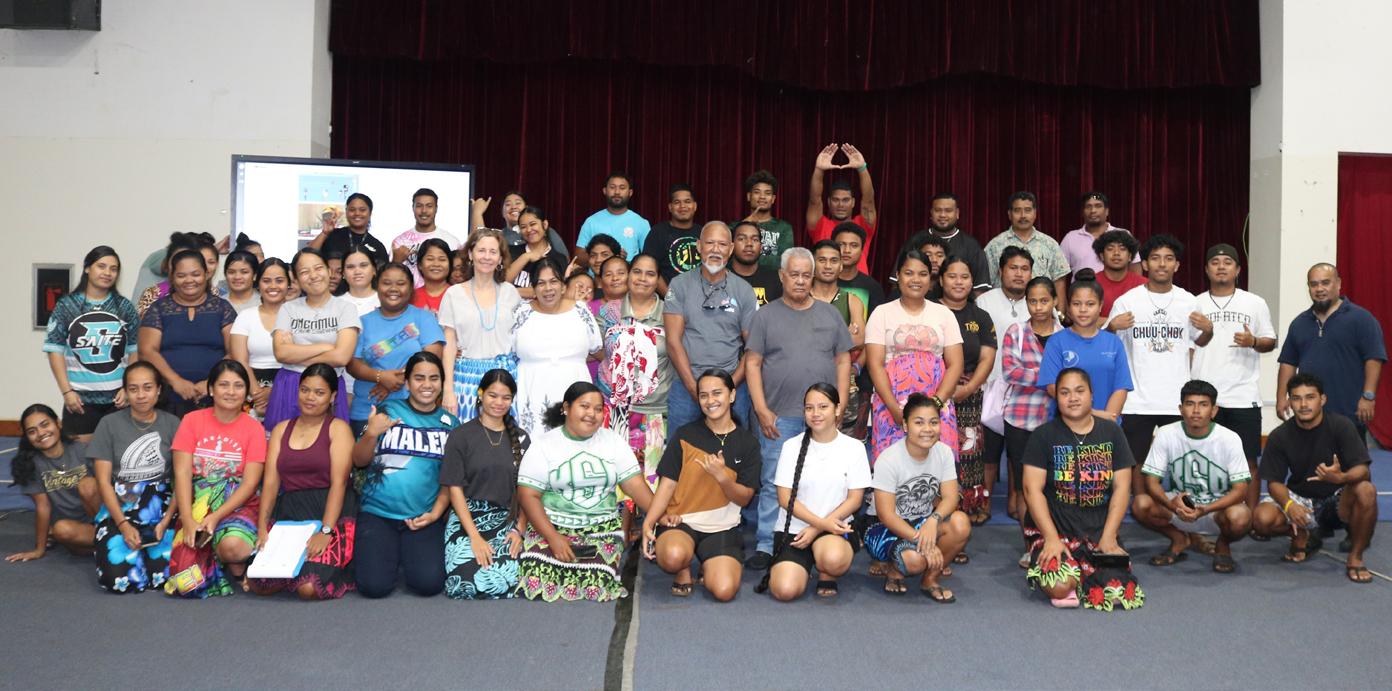
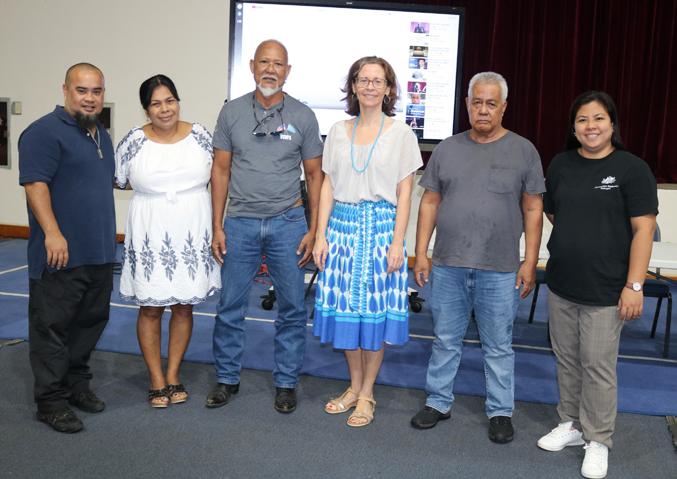
funding will open soon.
More information about the program is available on the Australian Embassy’s website at www.fsm.embassy.gov.
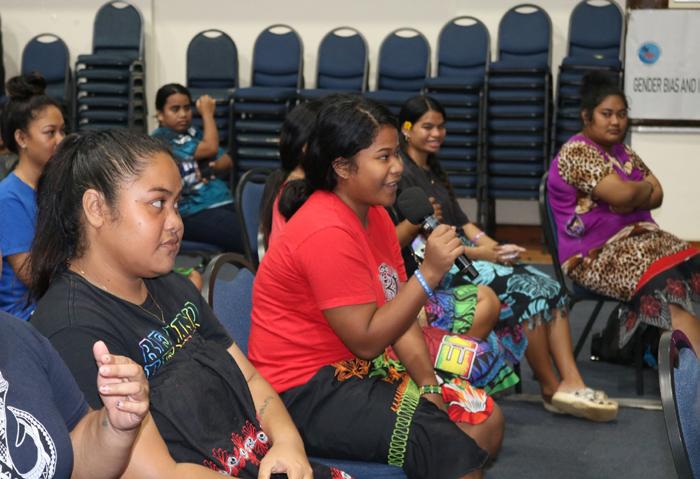
au, or by contacting the Embassy via email at DAP.Pohnpei@dfat.gov.au.


By Bill Jaynes
The Kaselehlie Press
May 19, 2025
Apia, Samoa— Twenty invited Pacific Island journalists from all walks of life and with varying years of experience began a first-of-its-kind training on the concepts of climate change-related loss and damage. Funded by the government of New Zealand, the training workshop was entitled “Empowering Pacific Media to Amplify and Support Loss and Damage Reporting.”
From the start, it was clear that the participating journalists had widely different understandings of climate change concepts and definitions. Not all of the least informed were necessarily the youngest of the group.
The workshop was conducted by the Secretariat of the Pacific Regional Environment Programme (SPREP). SPREP’s mandate is to promote cooperation in the Pacific region and provide assistance to protect and improve the environment and ensure sustainable development for
present and future generations.
“Something we need to recognize about ourselves and our region is that on the issue of climate change and other global issues like oceans, we punch way beyond our weight,” said SPREP Director General Sefanaia Nawadra. “We lead on many of these issues. The reason behind that is that we recognize that we are the most vulnerable. We're the ones who get affected the most, even though we contribute the least to these issues.”
“…You have a big role in sometimes raising the pulse to get excitement going, and then maybe bring things up longer so people have the endurance, perseverance, and diligence to address things in the long term,” Nawadra said to the 20 gathered journalists.
“I think we also have a role to play when you go through these things to help your leaders and your ministers. Sometimes we tend to criticize them too much. Sometimes they need our help too—so that you can let the people at home know they're doing useful work,” he added.

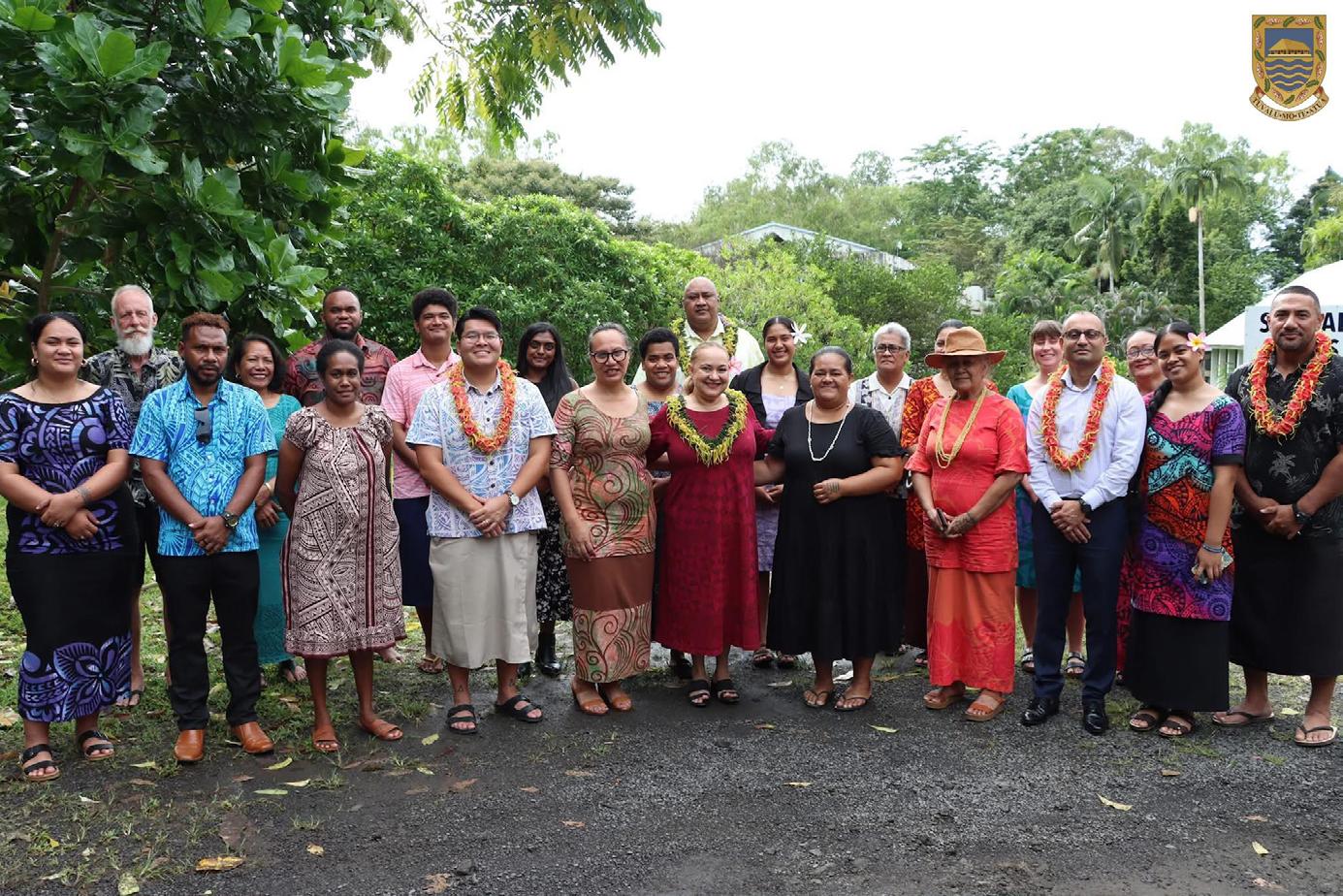
In a separate session, Filomena Nelson, SPREP Adaptation Manager, spoke on the subject of traveling leaders. She said it gives Small Island Developing States (SIDS) leaders an opportunity to stand toe-to-toe with the leaders of nations contributing most to ongoing greenhouse gas emissions. “We serve as a sort of moral compass,” she said of the SIDS presence at COP meetings.
Pacific Islands media practitioners, while learning the nuts and bolts of what climate change-related loss and damage is—along with how international negotiations take place and the agreements that have been made—were also consistently reminded that they play an important role. They were reminded that media is essential because loss and damage isn’t always easily quantifiable, but the stories and examples are critical. Humanizing stories of loss and damage helps reinforce the idea of Pacific Island countries as a moral
compass, guiding the larger nations in considering what actions should be taken.
The journalists present at this firstever training of its kind represented the Cook Islands, Fiji, FSM, Niue, Samoa, Solomon Islands, Tonga, Tuvalu, and Vanuatu.
Topics covered at the seminar included sessions on: Climate Change 101, climate change myths and misconceptions, the definition of loss and damage, the connection between loss and damage and traditional knowledge, climate change finance, understanding the COP processes, nature-based solutions, ethics in reporting, and loss and damage displacement— both temporary and permanent. On the final day, SPREP will host a field trip to a community heavily affected by climate change, offering participants the opportunity to hear stories directly from those most impacted.


Continued from front page
2. There is non-compliance with the FSM’s Climate Change Act and the Integrated Disaster Risk Management and Climate Change Policy of 2013;
3. Reporting on the implementation of established climate change policies and plans by the National and State governments can be improved, and outdated policies need review;
4. There is no centralized monitoring process in place for climate change actions in the FSM;
5. The FSM National Government has yet to develop a National Climate Change Finance Strategy.
The audit did not suggest that the FSM National Government or the Department of Environment, Climate Change, and Emergency Management (DECEM) had been inactive.
“Based on our audit, we concluded there are a lot of efforts and actions being made by FSM nationwide and significant partnerships and funding involved in climate change adaptation planning and actions,” the report stated. “However, there is a need to strengthen and improve the coordination, monitoring, and reporting by the FSM National Government.”
Finding One:
In 2016, the FSM was one of the first nations globally to become a party to the Paris Agreement, as one of the Small Island Developing States (SIDS)—the countries most vulnerable to climate change. As part of the Paris Agreement, parties agreed to engage in adaptation processes, including the development of a National Adaptation Plan (NAP).
“SIDS are... limited in resources (financial, technical, skills, etc.) to manage the increase of climate change,” the audit noted. With the assistance of SPREP (Secretariat of the Pacific Regional Environment Programme), the FSM secured over $2.9 million in funding from the Green Climate Fund (GCF)—the largest global climate change adaptation funding source—to develop its NAP.
Like most SIDS, the FSM has not
yet developed its NAP, though under the funding arrangements with GCF, it was supposed to have been completed during the first year of project implementation. At the time of the audit, the NAP was already four months overdue. Auditors raised concerns about the lack of effective monitoring of the project's performance or progress by DECEM.
To be fair to DECEM, both Congress and the Executive Branch have consistently reduced the agency’s submitted budgets in each of the years between 2021 and 2024—funds that DECEM needed to meet national goals.
“The lack of budget support indicates that the FSM National Government has not been committed to providing support to fund climate change actions through local or domestic funds,” the audit said, “even though the country has issued several documents to the UNFCCC emphasizing the significant impact of climate change on FSM. For example, the foreword of the 2nd National Communication stated that ‘Climate change is, without question, the gravest threat to my people’s welfare, livelihoods, and general security. It is the survival issue of our time.’ This was repeated in the 3rd National Communication,” the audit said.
Under FSM law, by October 14, eight departments of the National Government were to have prepared plans and policies on climate change consistent with the FSM Climate Change Policy. Only four had done so, and of those, several issues were found, such as unsigned plans and outdated documents. In international communications, mention is made of these plans—even when some did not exist or were not publicly available as required by FSM law.
Reporting and availability of these reports were also noted as problematic.
This was the only finding to which DECEM Secretary Andrew Yatilman took partial exception while still acknowledging the need for improvement.
“The term ‘non-compliance’ connotes the absence of any efforts at implementing the provisions or requirements of the Climate Change Act and the DRM and CC Policy of

2013,” he wrote in his response. “The extent to which the FSM as a whole has invested in climate change adaptation planning and priority setting since the adoption of the Climate Change Act and DRM and CC Policy has never been as pronounced. In the absence of approved or formalized climate-proofed sector plans—which require funding to be developed— the mainstreaming of climate change adaptation into planning processes for programs and projects at both the National and State levels was ongoing.”
He added, “The adaptation and planning at the municipal level across the FSM is actually ahead, with several adopted community plans already in place. This is due in large part to funding and technical assistance provided by international organizations, both intergovernmental and non-governmental.” Nonetheless, he has established a concrete action plan to address this finding—as he did for each of the five audit findings.
ONPA acknowledged that the Secretary of DECEM has faced challenges organizing meetings with other FSM National Government departments. Meetings were called but not attended.
There is also a President’s Council for Climate Change and Sustainable Development that should be driving inter-agency collaboration and providing oversight of the effectiveness of FSM climate laws and policies. However, it has not met since February 21, 2021.
Finding Three:
“It’s commendable that the National and State governments have developed or drafted policies and plans that include climate change actions, which meets one of the strategic objectives of the Climate Change Policy,” the audit said. “However, it is the implementation that we were unable to verify at the National Government level, specifically with DECEM.”
The audit stated that DECEM’s most recent Transition Report only includes plans to update the DRM and CC Policy of 2013 but does not provide an update on its implementation so far.
In response, Yatilman said under the agency’s action plan that it will
propose an amendment to the Climate Change Act, with a projected timeline of January 2026.
Finding Four:
Auditors recommended that the 2013 Climate Change Policy be updated as part of the ongoing GCF-funded NAP project to include performance indicators and a uniform process for monitoring, evaluating, and reporting on the implementation of climate change policy across the FSM.
They also recommended that DECEM revisit its earlier plans to engage its Information Technology team to set up a central monitoring system on the DECEM online portal.
“This will require the Secretary to have a clear understanding of the capacity needs of the IT team to ensure they are equipped to develop such an online platform and maintain it to secure its sustainability,” the audit said.
The FSM and its states have received over $200 million in donated funds toward climate change through FY2023. The figure comes from a non-exhaustive list from the FSM Office of Overseas Development Assistance and Compact Management Unit.
“There is an uncoordinated approach to implementing climate change actions funded by various donors... that poses the risk of missed opportunities to secure financing for climate actions,” the audit said.
It acknowledged that there is a capacity gap in the FSM that is not supported by local revenues—“as can be seen in the budget for DECEM”—and can only be addressed through shortterm donor projects such as the GCFfunded NAP Project, which includes developing a Finance Strategy.
DECEM also needs a grant writer to effectively access international funds, but this requires support from other National Government institutions such as the Council for Climate Change and Sustainable Development (CCCSD), which, as previously noted, has not met since 2021.
The performance audit is extensive and can be found at: http://www. fsmopa.fm/files/onpa/2025/Report_ CCAA_04-25-2025%20(1).pdf

By Bill Jaynes
The Kaselehlie Press
May 19, 2025
Apia, Samoa—It would not be too far a stretch to say that the overwhelming majority of the 20 Pacific Island journalists present at the SPREP workshop on Loss and Damage reporting experienced a paradigm shift in their previously held notions on the topic. This shift came during a session entitled “Unpacking Loss and Damage,” led by Jessica Rodham, SPREP’s Climate Change Loss and Damage Officer. The session was essentially a deep dive into the definition of climate change-induced loss and damage—but even just the definition proved eye-opening for most of the journalists.
Many Pacific Island journalists have been accustomed to reporting on the economic impacts of climate change— such as damaged infrastructure, lost land, declining business and tourism revenue, and reduced production capacity. These types of losses are easily documented. You follow the money.
But there are non-economic losses caused by climate change that are far more difficult to quantify. It was those types of losses and damages that the three-day SPREP seminar aimed to expose journalists to.
Rodham explained the difference between losses and damages: losses are permanent, while damages may be temporary and possibly restorable— though often at great financial cost or simply through the painful passage of time.
Non-economic losses and damages can include cultural erosion, deteriorating health, loss of biodiversity, reduced quality of life, fading traditional knowledge, displacement from ancestral land, interrupted human mobility, and weakened intergenerational connections. It can also mean a profound sense of lost cultural identity, human dignity, and spiritual grounding.
The international community has yet
to develop a satisfactory system of recompense for these types of losses. The leaders of the highest greenhouse gas-emitting nations are not willing to say, “yes, we have caused this problem. How can we compensate you for it?” Moreover, how can a monetary value be placed on generations of lost knowledge and culture?
If the seminar’s core message could be distilled into a single sentence, it would be this: media plays a crucial role in amplifying the oftentimes unquantifiable losses experienced by real people due to climate change— losses whose stories matter deeply.
During a later session, Ms. Tagaloa Cooper, Director of SPREP’s Climate Change Resilience Programme, and Siosinamele Lui, SPREP’s Traditional Knowledge Advisor, spoke about how climate change-related events can lead to the erosion of traditional knowledge. Cooper shared what many attendees considered one of the most poignant quotes of the entire workshop, recalling a conversation with an elder during her travels across the Pacific. “Our trees are not telling us what they used to tell us,” the elder said.
Indeed, the effects of climate change are already being felt across the Pacific Islands. Traditional knowledge, built over centuries of careful observation of the natural world, is becoming less reliable as an indicator of environmental patterns. Weather cycles have shifted. What was once a dry season may now be a rainy one, or vice versa. The number of growing seasons each year may have changed. Many elders can no longer depend on their ancestral knowledge to plan as they once did. The trees are no longer speaking as they used to.
Cooper shared a personal story from her childhood in Niue. She recalled how, every day, her mother would send her and her siblings down a cliffside to gather a specific medicinal plant, which they would use to create what she called an “evil-tasting tonic.” It may have tasted bad, she said, but it worked. Her mother knew exactly how and when to use the plant.
But then came the typhoon that
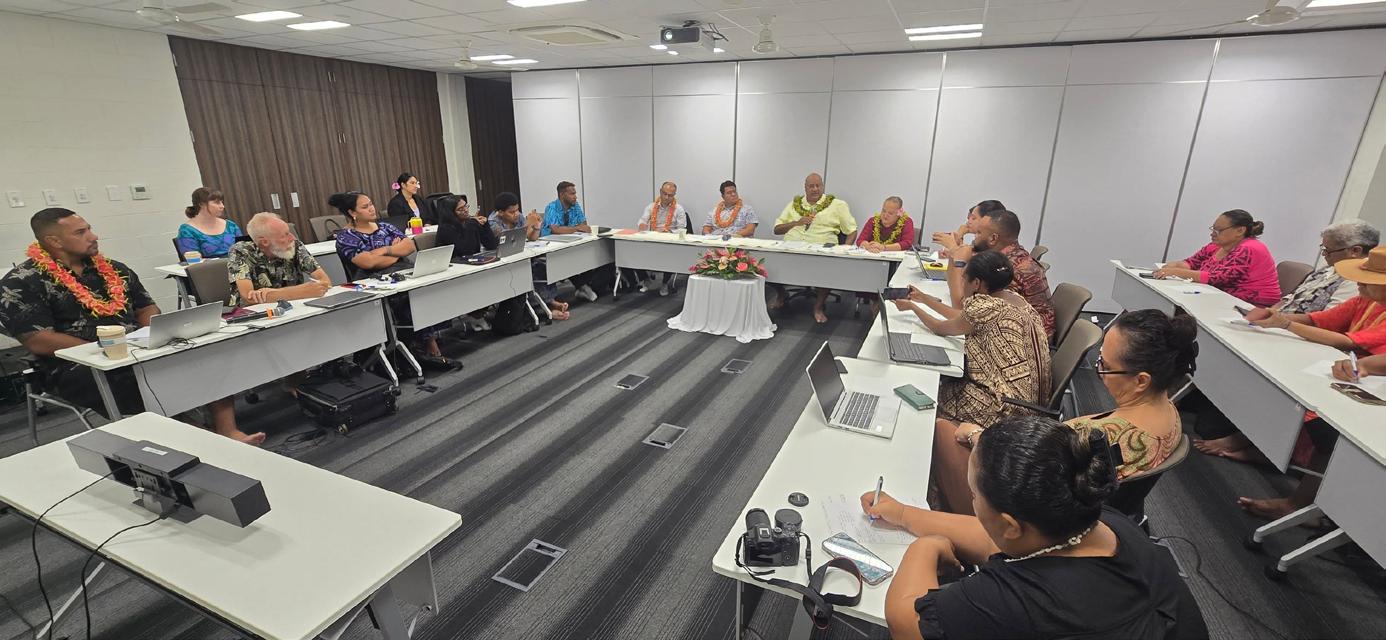
devastated Niue. That was years ago, but the plant—once abundant in very specific microclimates—was swept away and has never returned. Every time Cooper returns home, she climbs that same cliffside, searching for the plant, but it remains lost. Though her mother still retains the knowledge of its use, that wisdom is now without application.
Typhoons (or cyclones in the South Pacific) are natural phenomena, but climate change has intensified their frequency and power over time. The environmental toll continues to grow. More intense and destructive storms are just one consequence of a much broader crisis.
Some Pacific Island nations are now prioritizing the preservation of traditional knowledge by introducing it into school curriculums. Pohnpei, in the Federated States of Micronesia, is among them. A course for elementary students has recently been introduced. While efforts have been underway for some time, they were largely driven by outside NGOs. Now, Pohnpei is taking

ownership of this responsibility— albeit with some external funding— recognizing that once traditional knowledge is lost, it may be gone forever.
After all, “Our trees are not telling us what they used to tell us.”
Pohnpeian Pride in Saipan: A taste of excellence at Sushi Spot


Continued from previous page
May 17, 2025
Saipan—While in Saipan for a PIDB meeting, Governor Stevenson A. Joseph and Director of Treasury and Administration, Sihna N. Lawrence, had the distinct pleasure of dining at Sushi Spot, a popular local restaurant owned and operated by one of our very own—Mr. Shane Hawley from Pohnpei.
Mr. Hawley’s journey from Pohnpei to running one of Saipan’s most talked-about sushi spots is a shining example of Micronesian resilience, hard work, and entrepreneurial spirit. With good, fresh food, warm hospitality, and a commitment to excellence, Sushi Spot has quickly become a community favorite.
Governor Joseph and Director Lawrence took the opportunity to personally congratulate Mr. Hawley on his success and to thank him for being a proud ambassador of Pohnpeian talent and culture abroad.
From Pohnpei to Saipan and beyond, our people continue to shine.

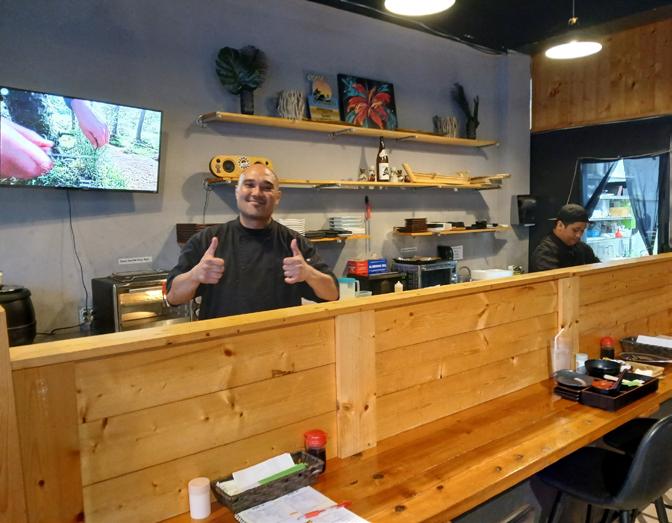

The Pacific Islands Forum
The Forum (PIF) is an Employer of Choice in the region, aiming to recruit and employ staff based on merit and organisational needs. It ensures that its employment selection upholds its values and commitment to Forum membership, gender balance, and building a diverse and inclusive organisation. The PIF is committed to achieving gender balance and being fully representative of our member countries. Our workforce is currently over 50% female, and we have representatives from fifteen of the eighteen Forum member countries.
To achieve greater workforce representation from our member countries we strongly encourage applicants from the following countries to apply: Federated States of Micronesia, French Polynesia, and Niue
The Opportunity - Programme Officer Economic Policy
The Programme Officer – Economic Policy will provide support for the provision of advice, economic analysis, and support, to strengthen the Forum’s trade and economic programmes and initiatives. The role will also support the provision of advice on natural resource development in Forum Island Countries.
The key responsibilities are summarised as:
• Assist and (at times) lead in the formulation of clear, coherent, and evidence based, papers on natural resource development and management, for and/or in collaboration with the Senior Management Team (SMT), Member States, the Office of the Pacific Ocean Commissioner (OPOC), and agencies of the Council of Regional Organisations of the Pacific (CROP), as required
• Support the Senior Economic Adviser / Economic Adviser in the implementation of priorities of the 2050 Strategy for the Blue Pacific Continent (2050 Strategy), including the Pacific Roadmap for Economic Development (PRED), and the Pacific Strengthening Correspondent Banking Relationship (CBR) Project.
• Support the Senior Economic Adviser with the preparations and arrangements for the Forum Economic Ministers Meeting (FEMM), and the implementation of the FEMM decisions. In addition, the Officer will also be required to prepare briefing notes, correspondence, speeches, and technical papers, for other relevant meetings and workshops as assigned by the Economic Adviser.
• Liaise with Members and Coordinate with Development Partners in the implementation of agreed PIFS work programme in relevant Key Result Areas (KRAs)
Applicants should have a university degree (Bachelor’s degree or equivalent) in the field of Economics, Natural Resource Management, or other relevant disciplines, with a strong quantitative background in policy analysis, and at least five (5) years of relevant work experience at a senior level in either government or nongovernment organisations, in at least one Member country.
The position carries a competitive and attractive remuneration and benefits package, including allowances for housing and education; and medical, accident and life insurance coverage. This position is placed at Band 10 of the PIFS salary scale. The starting salary for the position is SDR 32,437 per annum, which is equivalent to FJD 97,908.
Interested applicants are encouraged to apply through the PIFS website: www. forumsec.org where an information package containing the position description and full remuneration details are available. Candidates must include in either their application or Curriculum Vitae the full contact details of three referees. To be eligible for the position, applicants must be nationals of Forum member countries. The Forum Secretariat is an Equal Opportunity Employer. The deadline for applications is 15 June, 5pm (Fiji Time).
*Member States of the Pacific Islands Forum: Australia, the Cook Islands, the Federated States of Micronesia, Fiji, French Polynesia, Kiribati, Nauru, New Caledonia, New Zealand, Niue, Palau, Papua New Guinea, the Republic of the Marshall Islands, Samoa, the Solomon Islands, Tonga, Tuvalu, and Vanuatu.
Notice is here that
BRAUREI BECK & CO. GMBH
A corporation organised in existing under the laws of Germany
Am Deich 18/19, 28199 BREMEN GERMANY is the owner and sole proprietor of the following trademark.

The above mark is used in connection with promoting Braurei Beck & Co. GmbH products, which primarily consist of beverage products in the international class 32: Beers; non-alcoholic beers, mixed drinks containing beer, mineral and aerated waters and other non-alcoholic drinks; fruit drinks and fruit juices; syrup and other preparations for making beverages in class 32.
Braurei Beck & Co. GmbH wishes to inform merchants and the public in the Federated States of Micronesia that singular importance is attached to the trademark depicted above and that legal action will be taken against any person or persons who act in infringement of this trademark, who pass off their goods as goods of Braurei Beck & Co. GmbH, or who act in a manner likely to cause confusion or misunderstanding as to the source, sponsorship, approval, or certification of such goods to the extent allowed by the law of the Federated States of Micronesia.
Any inquiry regarding this Cautionary Notice may be addressed to VAI IP COMMERCIAL by email mail@ vaiipcommercial.com

By Bill Jaynes
The Kaselehlie Press
May 21, 2025
Samoa— Just short of thirteen years ago, Tropical Cyclone Evan struck Samoa. A Category Three cyclone, it had wind speeds of 230 kilometers per hour. At least five lives were lost. The economic loss and damage were estimated at $210 million USD— roughly 30 percent of Samoa’s gross domestic product at the time. The noneconomic losses were inestimable. Approximately 7,500 people were displaced by the devastating storm.
Residents of communities along the Vaisigano River lost three of their own, one of them a young child. The communities in the Vaisigano, Lelata, and Ueligitone areas continue to struggle with the loss and damage to this day. Despite significant government infrastructure projects aimed at calming the sometimestumultuous river, residents live each day with the threat of a recurrence of the kind of destruction they experienced in 2012. Residents told reporters that the river floods much more often now than it did before the cyclone. Those who have not already relocated away from the river remain resolute in their determination to stay.
One resident told Pacific Island journalists who were on a field trip
into their community that his ancestors had worked to ensure their descendants would have a place to call home. Giving in to the river, he said, would be like turning his back on his ancestors.
“What do you advise your children about staying here?” asked a reporter from Niue. The resident confidently replied that if his children could raise enough money to purchase their own land, they were free to do so, but he hoped they would choose to stay.
Having spent time discussing the ethics of reporting on loss and damage— particularly how to avoid causing harm when interviewing those who have experienced tragic loss—some journalists did not feel comfortable jamming a microphone into our hosts’ faces. Though the residents were prepared and perfectly willing to share their experiences with 20 potentially bloodthirsty journalists, some of us stayed on the periphery and listened to the stories they told in a more inconspicuous way. Perhaps it wasn’t the best method of storytelling, but it felt more respectful to the journalists who held that view.
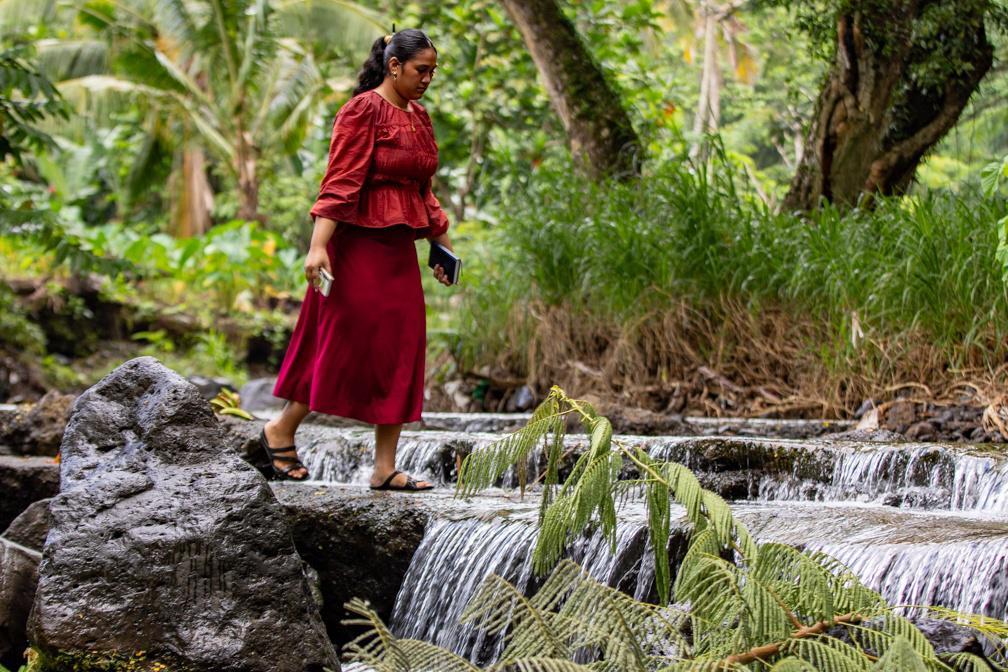
One of the areas the journalists visited is accessible only by crossing a tributary of the multi-channeled Vaisigano River. In good conditions, the crossing is easy—though low-slung vehicles would likely not make it across. But when it rains, it becomes impassable, either shutting residents out of their community upon return or stranding them inside.
At the journalists’ first stop, a resident, a university teacher, explained that he often has to miss work, and children must miss school, due to the hazardous conditions. “Hazardous conditions” usually just means rain—because the river crossing into town quickly becomes impassable when it rains. It was raining when the journalists arrived, and he expressed concern that we might not be able to get back, even though the rain was light. According to every Samoan in the group—both among the organizers and the residents—it should not have been raining in late May. Before climate changes, May was always one of the driest months. Yet it rained, as it did on several days during our visit.
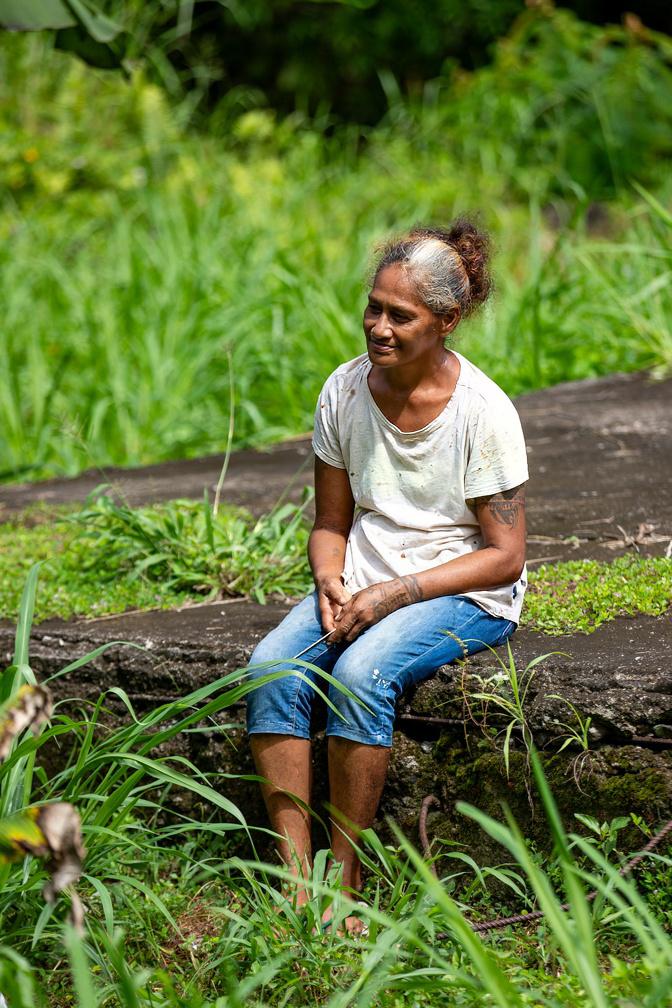
Journalists boarded the van to head to the next community and did, indeed, make the passage. In that community, hidden in a deep valley carved by the river, we happened upon a resident who was not part of the organized visit but was willing to share her story. Though she spoke only Samoan, she freely recounted her experience while standing on the concrete slab that was all that remained of her former home. She and her family have since built a beautiful new house, located some 25 to 30 feet higher than where the original home once stood.
With help from a helpful translating journalist, she explained that on the day of the flood, she and her family evacuated as quickly as they could. They were uncertain of what would happen. When the waters receded, the worst had come to pass: everything she owned, including her home, had washed away. But even as she returned, she could hear the hammers of resilient villagers already

rebuilding their homes wherever they could. She decided then and there that they would rebuild better than before—and they have done just that.
Even so, living near the river remains a challenge. She said they are often forced to evacuate during heavy rains. But since building their new home on higher ground, they have not suffered any serious damage—aside from losses to the subsistence crops they continue to grow.
A report prepared by Galumalemana Anne Rasmussen, Assistant CEO at the Ministry of Natural Resources and Environment, Samoa (source), attempted to assess non-economic losses and damages. It reported efforts to quantify damages such as cultural heritage,

Continued from previous page
environmental services, and psychosocial health needs. “People expressed interest in relocating to less disaster-prone areas during the post-disaster needs assessment,” it noted, quoting two residents.
“Yes, we would like to relocate, but I am not sure where to go,” said a male resident from Falefa. A male resident from Siumu West said, “We can’t relocate—this is our land from our ancestors.”
That latter quote summed up the interviews that Pacific journalists had with residents who have chosen to remain in their still potentially dangerous homes. “This is our land. It was given to us, and we are staying— no matter the cost,” they all said, in one form or another.

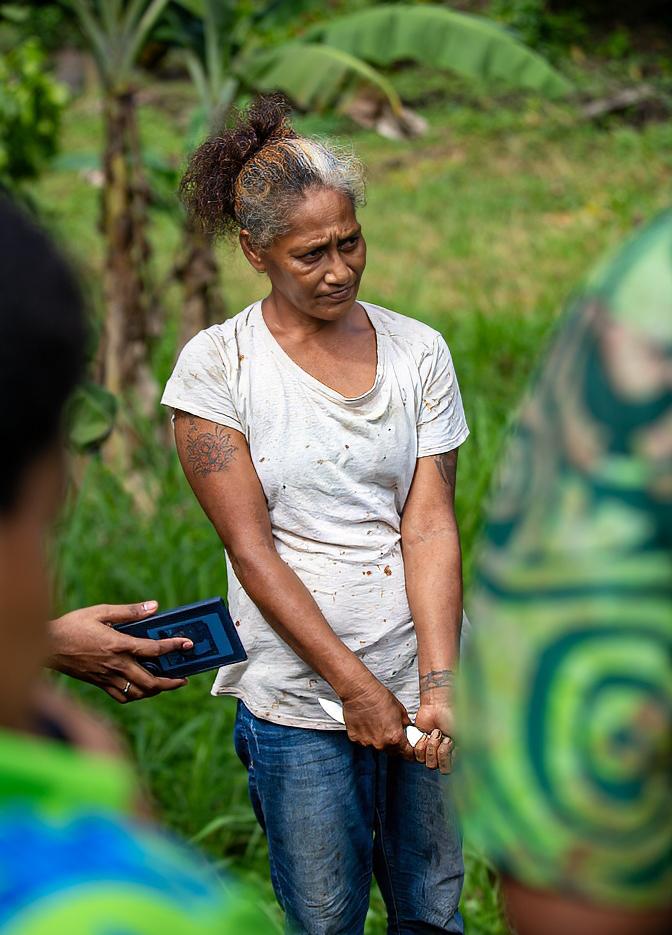
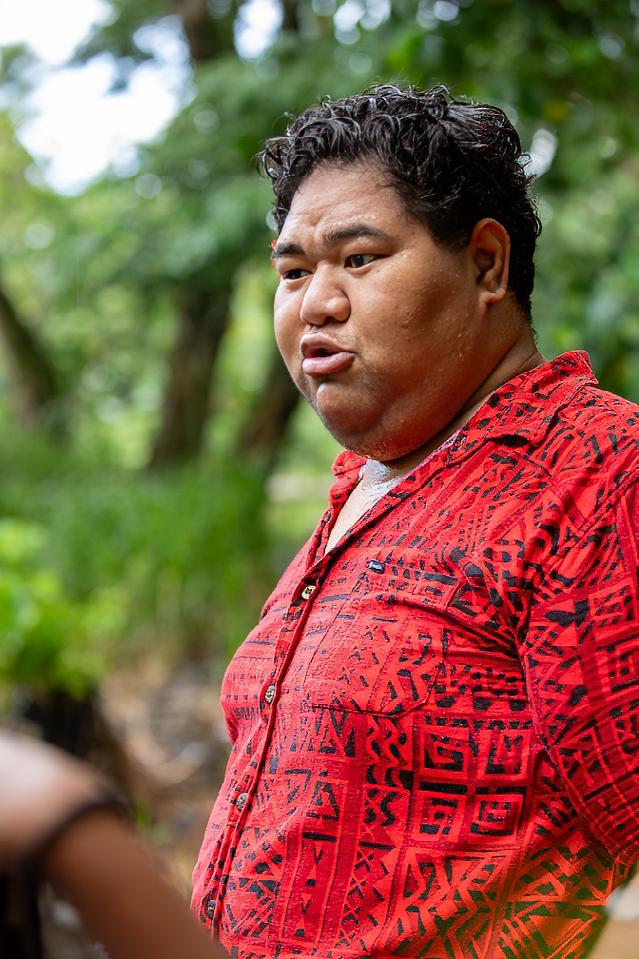

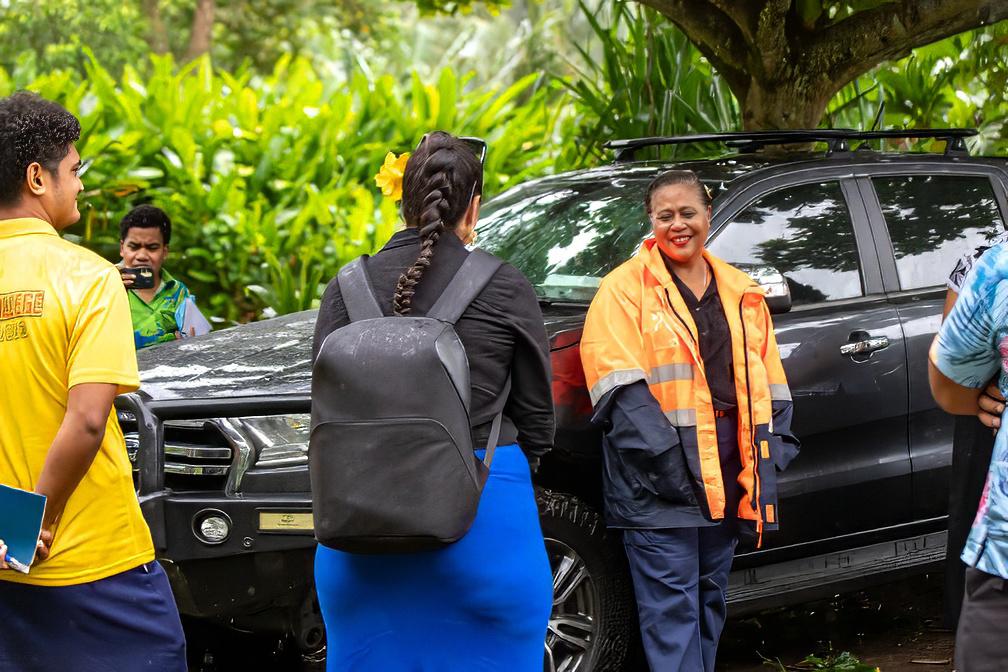
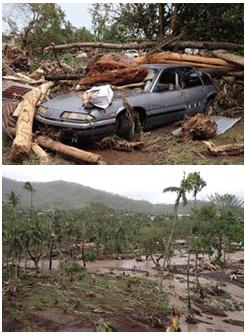
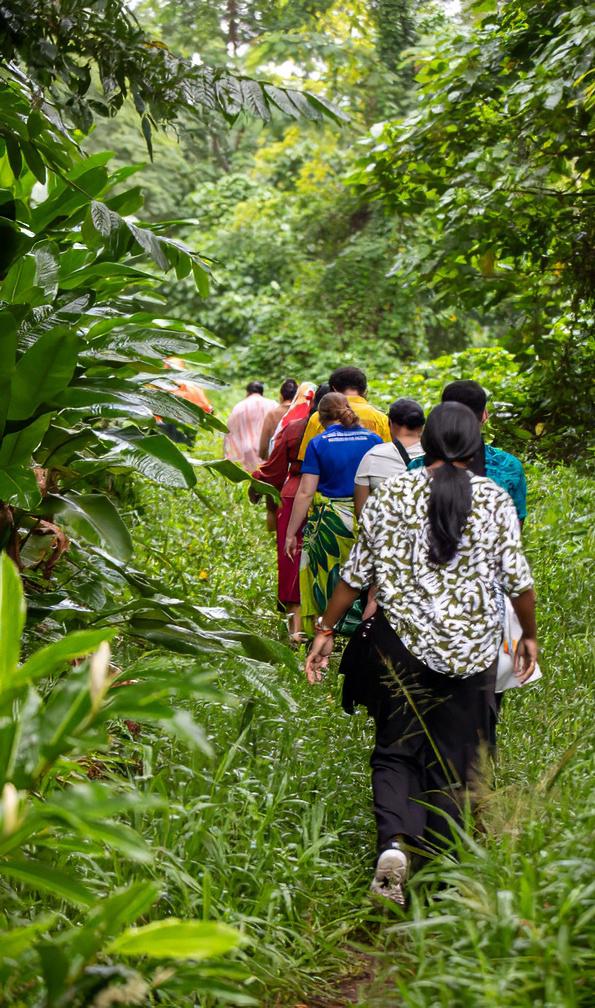
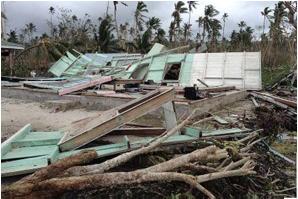

May 16, 2025
Saipan, CNMI—While in Saipan for the Pacific Islands Development Bank (PIDB) Annual Board of Governors Meeting, Pohnpei State Governor Stevenson A. Joseph took the opportunity to present Certificates of Appreciation to two CNMI government offices for their continued support and assistance to the Pohnpeian community in the CNMI and in Pohnpei.
The presentations were coordinated with the assistance of Mr. Nick Benjamin, President of the Pohnpeian Community in Saipan. Each certificate was presented directly at the respective office.
Governor Joseph first visited the Office of Carolinian Affairs, where he presented a Certificate of Appreciation to Director Felix Nogis. The certificate recognized the office’s longstanding support for the Pohnpeian community, including providing access to the Carolinian Utt as a venue for community gatherings and events.
Continued from page 3
Governor Joseph then visited the CNMI Division of Parks and Recreation to present a Certificate of Appreciation in recognition of the department’s continued support for acvess to parks and meeting areas that benefit the Pohnpeian population in the CNMI. Although Director Michael Cruz was not available at the time, Ms. Emily Macaranas accepted the certificate on his behalf.
Governor Joseph also expressed his appreciation to CNMI Governor Arnold I. Palacios and Lt. Governor David M. Apatang for their administration’s ongoing support of the Pohnpeian community residing in the CNMI.

These gestures of recognition reflect the gratitude of the Pohnpei State Government for the strong partnerships that support the well-being of

Balance: Governor Joseph and Director Lawrence explained that while minimum wage increases are under review, a full economic impact assessment is required to ensure sustainability across all sectors.
Fuel Subsidy and Land Collateral for Loans: Community members voiced the need for more affordable fuel and access to credit using land as collateral. These issues were noted for ongoing consideration.
Development Priorities: Governor Joseph outlined the administration’s strategic focus areas, including:
Water security, by improving infrastructure and access to clean water; Health Security, with an emphasis on non-communicable disease (NCD) prevention; Food and Energy Security, to reduce dependency and strengthen resilience; Airline Transportation, which remains a recurring agenda item at the regional Micronesian Islands Forum, where leaders from the region continue to seek improved connectivity and accessibility.
The meeting concluded with closing remarks by Director Sihna N. Lawrence, who expressed her appreciation for the strong community turnout and called for ongoing cooperation between the diaspora and leadership at home. She encouraged community members to remain active participants in shaping Pohnpei’s future.
Pohnpeians abroad and promote regional cooperation among island governments.

The Pohnpei State Government extends its deepest gratitude to Acting Consul General Johnny Silbanuz and staff members Mark Jones and Clayton Heliasar for their support and hospitality. Special thanks are also extended to the leadership of the Pohnpei Community Association in Guam, whose organization played a key role in the success of the event.
The current officers and board members of the Pohnpei Community Association in Guam are:
President: Kaster Sarapio
Vice President: Jeremiah George
Secretary: Malinda Mora
Treasurer: Jaynard White
Board of Directors: Setina Sam Texner Luther
Claire Benjamin Senatson Louis
Their collective efforts continue to foster unity, leadership, and cultural pride among Pohnpeians living in Guam.
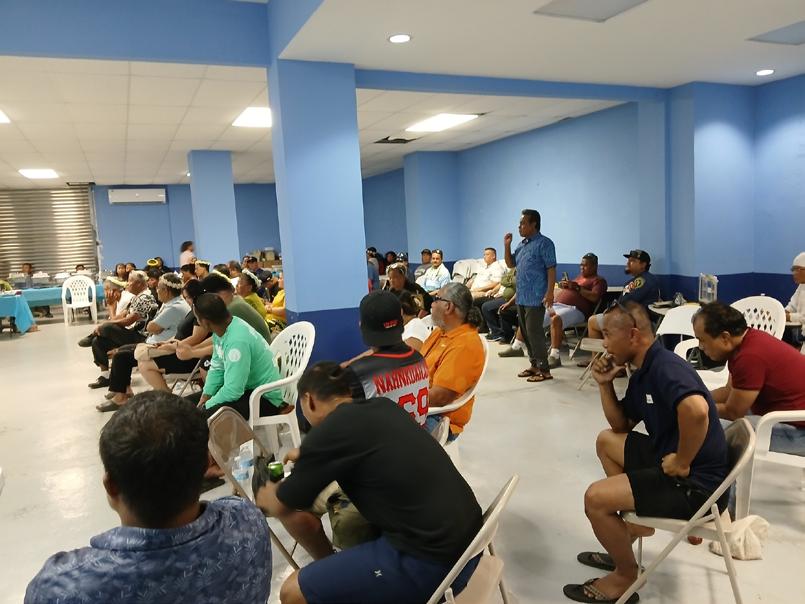
Three years ago, I promised Australia would listen, learn and deliver on Pacific priorities.
That is what we have done, and I am inspired by what we have accomplished together –hand in hand with the Pacific family, because we share an ocean and a future.
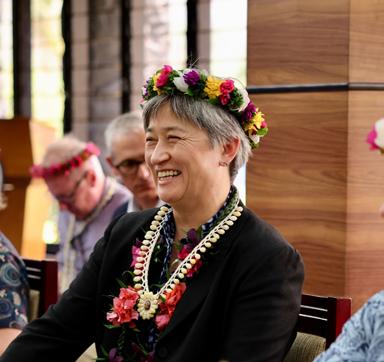
institutions on Pacific-led solutions, partnering in new Pacific-led policing, disaster preparedness and defence arrangements, enabling Pacific security to be provided by the Pacific family, assuring our stability and safeguarding our sovereignty.

On May 12, 2025, the day after the 24th FSM Congress was sworn in, Senator Victor Gouland issued the following statement and asked that we share it with our readers.
Mr. Speaker, please allow me to dedicate my remarks today to the citizens of our Micronesian Federation, who, after 46 years of our national constitutional independence in 1979, are beginning to wonder about the promises of a true constitutional, democratic self- government in our federation, and who, after 39 years of compact association with the United States since 1986, are also beginning to wonder about the promises of their government’s economic development efforts.
time manipulate our judicial branches into endorsing its political maneuver, right then and there, we have lost our constitutional legitimacy and no longer deserve the obedience of the people. Mr. Speaker, Honorable members, fellow citizens, we need to be equally vigilant in the pursuit of both our democratic principles and our common economic development wellbeing.
That future is becoming more uncertain, the Pacific is facing growing challenges, from climate change, cuts to global aid and rules under strain.
None of us can solve these problems on our own. We are counting on each other to support the prosperity and aspirations of all the people who make up this great Pacific family.
In the face of global aid cuts, we have reprioritised our development assistance to dedicate 75 cents of every Australian development dollar to support our region. We have built on our position as the region’s largest development partner by lifting our development assistance to record levels, to more than $2.1 billion to the Pacific.
We have partnered to better integrate our economies, making it easier for people to move between countries to live, work and study, and for business and tourism, creating more opportunities for Pacific islanders looking for jobs and economic options.
We will continue to help goods and services move across the Pacific and beyond by investing in aviation, seaports and road infrastructure and banking.
We will continue to be your reliable partner and respond to Pacific priorities, delivering on quality infrastructure, skills, banking and budget support.
40 years of tariff-free access into Australia has helped contribute to the prosperity of the Pacific. And that will not change.
We will continue to invest in locallyled solutions to security challenges such as health and community safety, cyber-crime, corruption and maritime security.
Nowhere has this been more important than on climate change. To protect the great ocean that we all call home, Australia has enacted our commitments to reduce our country’s own carbon emissions, as we said we would. Australia will advocate with you to hold the world’s largest emitters to account.
We are on track to deliver $3 billion in climate finance by this year and we are backing Pacific climate solutions by investing in the Pacific Resilience Facility, a Pacific-led and Pacificowned facility to deliver climate finance directly to communities.
We know that none of our nations can achieve the future we want on our own. We are stronger together. That’s why we have worked closely with our regional counterparts to help the Pacific family stay united, and will continue to be your reliable partner, working in the Pacific way to support a peaceful, stable and prosperous region.
Penny Wong Australian Foreign Minister
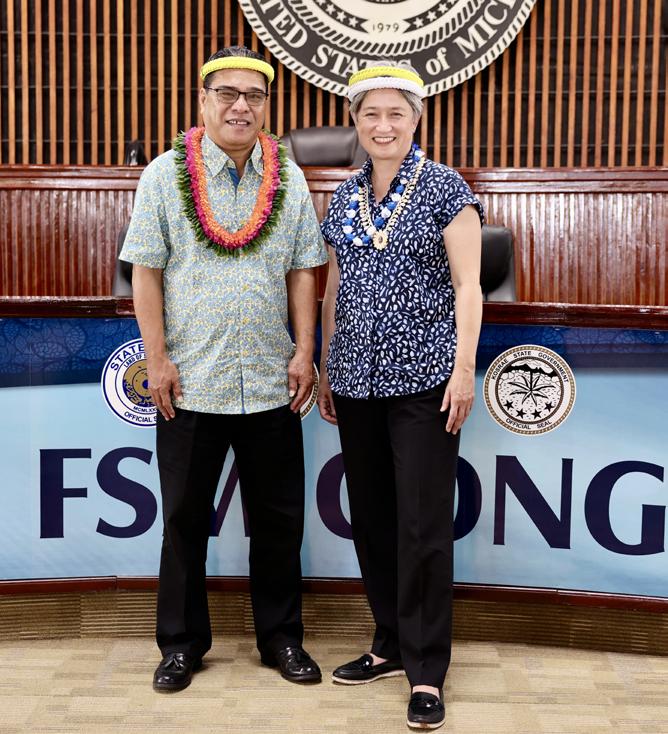
There is a rising question now among our citizens, whether or not our government’s policies and practices are in line with the theories and national objectives that our federation was created to implement for our states and citizens, or has our government drifted off course because of self-interests and corrupt motives from those founding democratic principles and economic development objectives that our federation was to pursue for our states and citizens?
Mr. Speaker, we have to admit that our Micronesian Federation still has a long way to go to be the perfect union that our forefathers once dreamed it to be. And achieving that perfect union status for our nation, we do need the guidance and support of our people. We cannot treat our people merely as pawns and puppets in our individual political designs.
In the early 2000s, when our national leaders had started betraying the trust of our people, the people started demanding the institution of an independent prosecutor in our national government. In march 2023, they passed it in a constitutional referendum to have the office installed at the earliest opportunity, partly to help preserve the separation of powers within our national government. It now takes our government two years to install that office.
Meanwhile, within those two years, our governments have been using powers that are purposeful to disadvantage some of our citizens for political purposes. Our national government has made it its practice to exert undue influence in the conduct of our national and state elections for political purposes.
Recently, our national executive branch had used the disaster emergency power supposedly to provide disaster emergency relief food for the people. However, in Chuuk State, the national emergency relief food turned out to be a political weapon, distributed only to people who support our national executive branch’s choices of candidates and its Chuuk State’s political allies in the recent local Chuuk State elections.
The use of our government emergency powers to interfere in our elections is a dangerous precedent for our government leaders to follow. It not only dilutes our democratic processes and the true will of our people, but it also sets our constitutional federation on the path of dictatorial governments.
Indeed, when our governments invoke the emergency power and use the police power to suppress the people’s free will, and at the same
We are now starting our third compact period with the United States, but after 35 years now, we still are not close to achieving economic self-reliance or self-sustenance for ourselves as a nation. It seems our compact financial assistance has not been enough and has been too slow for our national economic development needs.
At the same time, our Compact relationship has become a detrimental factor to our Micronesian societies and cultural identity. Too many of our citizens are leaving families at home to search for a better live in America and its territories, and yet our compact financial assistance has not developed our local economies to provide the jobs and business opportunities for our citizens to stay home and utilize.
In March 2023, as we all know, our people had demanded the division of our fishing license fees for more development funds in the States because our Compact financial assistance has proven inadequate and unresponsive to the slow pace of economic development in the islands.
I suggest Mr. Speaker, and Honorable members, that we continue working with the United States to revise the procedure for the availability or disbursement of our compact financial assistance to address the present realities of our economic development needs.
For example, I am going to introduce in this regular session the necessary bills or resolutions authorizing the Compact Trust Fund Board of Trustees or Governors to start disbursing not more than a quarter of the annual return on each of the States’ shares of the Trust Fund so as to accelerate the economic and infrastructure development efforts in the States’ outer islands rather than in the State centers.
I ask that we make our Joint Compact Renegotiation Committee a full-time job to revising such needed revisions to the existing Compact agreements, and call the next StateNational leadership to address such needed ideas.
Mr. Speaker, and Honorable members, I thank you for your kind patience with me, and for the sake of our people and nation, we work together to restore our constitutional federation and accelerate the improvement of our people’s lives outside our state centers.
Kinisou chapur, Seni
Congressman Victor Gouland Northern Namoneas, Chuuk State

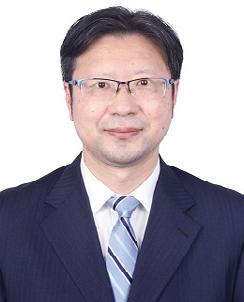
On May 16, 2025, the handover ceremony of the China-aided National Convention Center was successfully held in Palikir, the capital of the Federated States of Micronesia (FSM). As I stood there, alongside the delegation from Guangdong Province of China, at the ceremony, a profound sense of gratification washed over me. In our hands, the golden key, a symbol of the building’s completion, was passed through me from the representative of the people of Guangdong Province to T.H. Secretary Lorin S. Robert and then to T.H. Vice President Aren B. Palik. H.E. President Wesley W. Simina took to the podium and praised the Center as “a landmark structure that stands as a symbol of concrete and strong partnership that we have continued to cherish with the People’s Republic of China”, his remarks resonating with the significance of that moment.
Back in July 2023, shortly after my arrival in the FSM, a small team of China Construction Science and Industry Corporation (CSCEC) came to Palikir after a certain period of challenges and difficulties, and soon the National Convention Center project resumed construction. Thanks to the personal commitment of H.E. President Xi Jinping and H.E. President Wesley W. Simina, continued support from the governments of two countries, and hard work of the construction teams, the Center finally rose from the ground, adding a new dimension to the capital’s skyline. I sincerely want to thank everyone who made this possible. THANK YOU.
Also present at the handover ceremony were First Lady of FSM Madame Ancelly Simina, Second Lady of FSM Madame Adelita Palik, T.H. Esmond B. Moses, Speaker of the 24th FSM Congress, T.H. Madame Beauleen Carl-Worswick, Acting Chief Justice, T.H. Senator Peter M. Christian, Chairman of Committee on External Affairs and other members of the Congress, heads of the States, Secretary of Transportation, Communications and Infrastructure (TC&I) and other cabinet members, members of the Diplomatic Corps in the FSM, representatives from the People’s Government of Guangdong Province of China, the project contractor of CSCEC, Chinese companies and overseas Chinese in the FSM and local friends from all walks of life. Nearly 500 people were present in a joyful and solemn atmosphere. The attendees were impressed by the project and excited about the future of friendly relations between China and the FSM.
It was especially an honor for us that Wasalapalap Nahnpwutak Pukiniap, Nanmwarki of Sokehs, along with the Isonahnken, Nahnalek, and Nahnkeniei of Sokehs graced the event with their presence, highlighting the cultural and historical significance of the land and the ceremony.
During the ceremony, Speaker Moses
delivered a welcoming speech and Nahnalek Sokehs, Nahnkeniei Sokehs, First Lady of FSM Madame Ancelly Simina, and Second Lady of FSM Madame Adelita Palik performed the ribbon cutting for the National Convention Center.
The newly-built FSM National Convention Center is a landmark for China-FSM friendly cooperation in the new era. It is telling a moving story of friendship that, under the framework of China-FSM Comprehensive Strategic Partnership and with the support of the governments of both countries, the project team worked tenaciously with a keen sense of responsibility to overcome numerous difficulties, especially the impact of the pandemic and the severe drought, and steadily promoted the project till the final victory. We are delighted to see that the National Convention Center is now shining brightly in Palikir, as a landmark of China-FSM practical cooperation as well as a new token of our friendship.
On behalf of the Chinese government, I extended our warmest congratulations on the successful completion of the project at the handover ceremony. I expressed my deep gratitude to H.E. President Simina and Hon. Chairman Peter Christian for their considerate care and unique contributions to this project. I also thanked His Royal Majesty Nahnmwarki of Sokehs, T.H. Vice President Palik, T.H. Speaker Moses, the Departments of Transportation, Communications and Infrastructure (TC&I), Foreign Affairs, Justice and other relevant departments of the FSM and Pohnpei State Government for their timely assistance and cooperation. My thanks also go to the leaders and relevant government departments of Guangdong Province, China Construction Science and Industry Corporation, Guangdong Guangzi International Investment Consulting Group, and all the construction workers from both China and the FSM.
The National Convention Center project covers a total area of 18,000 square meters, with the main functional part over 3,000 square meters, and is able to host international and regional conferences. The design of the building incorporates symbols of five-pointed star from both the Chinese and FSM national flags. The architectural design also adopts the courtyard-style sloping roof which is suitable for the local climate. Another reason for it being remarkable is the integrated expression of functionality and visual beauty. It combines Chinese oriental aesthetics, such as the rectangular spiral decorated windows and Lingnan-Southern China garden style, with Micronesian elements like the black basalt and island patterns, signifying that ChinaFSM relations surmount mountains and seas and get closer and closer. To implement the important consensus reached by the two heads of state, the Chinese side also brought Chinese orchids all the way from Guangdong Province, and Chairman Peter Christian brought precious tree saplings here. Bathed in the good wishes of the two countries and the two peoples, the blooming flowers and vibrant
trees provide the National Convention Center with more diversified scenes and experiences, which helps create a lovely world of harmony and coexistence of Chinese and FSM cultures.
The National Convention Center project is an important outcome in China-FSM joint efforts for promoting high-quality Belt and Road cooperation and building a community with a shared future for mankind. Chinese people believe that people who bond with their hearts can build enduring relationships. China and the FSM are good neighbors in AsiaPacific and have enjoyed a deep friendship. Whether it is during the struggle for national independence or in the pursuit of practical cooperation for common development, China and the FSM have always treated each other as equals with mutual respect, and worked for friendly and win-win cooperation. China follows the principles of amity, sincerity, mutual benefit and inclusiveness and focuses on building a community with a shared future with neighboring countries. Based on FSM’s actual needs, China has since long buttressed the FSM’s nation building and sustainable development, and provided assistance to the FSM within its capacity. These appear as the epitome of China’s assistance to Pacific Island countries and become part of global SouthSouth cooperation. China’s policy toward Pacific Island countries does not target any third party. China never seek any geopolitical self-interests. China’s assistance does not attach any political strings. China does not seek any exclusive privileges, nor does China impose its will on Pacific Island countries or pay lip service to its commitments. The wishes and needs of Pacific Island countries are fully respected. China-aided infrastructure projects, including the China-FSM friendship gymnasiums, government buildings, schools, bridges, roads, and ships, are playing a positive role in FSM’s development and improving the well-being of the two peoples.
The past 36 years since the establishment of diplomatic relations between China and the FSM have witnessed thriving development in bilateral relations which is based on the one-China principle and highlighted by closer high-level exchanges, fruitful practical cooperation results, increasingly booming people-to-people exchanges, and deepened friendship. In last April, President Simina paid a successful state visit to China. Chinese President Xi Jinping held talks with President Simina, and reached important common understandings on further deepening ChinaFSM Comprehensive Strategic Partnership. This March, Vice President Palik attended Boao Forum for Asia Annual Conference and visited China. H.E. Ding Xuexiang, member of the Standing Committee of the Political Bureau of the Communist Party of China Central Committee and Vice Premier of the State Council, held talks with Vice President Palik, bringing new impetus to our bilateral relations. Looking ahead, under the guidance of the leaders of our two countries, China-FSM relations in the new era will go on with steady and continued success and deliver more benefits to the two peoples.
China has all the determination, confidence and capabilities to seek common development and share prosperity with all countries including the FSM. President Xi Jinping once used the ocean as a metaphor to outline the Chinese economy, “The Chinese economy is not a pond, but an ocean.” With unwavering confidence and resilience, this vast ocean is believed to withstand strong winds and storms while navigating the chill of trade and tariff headwinds. This year, China’s economic development and opening-up have continued to deliver remarkable results. In the first quarter of this year, China’s economy grew 5.4 percent year on year. The international community continues to be optimistic about China’s economic prospects, believing that China’s economic growth, with its institutional advantages, huge market and vitality of enterprises, will bring more confidence and strength to the world economy.
While pursuing its own development, China has also embraced the world. China has actively promoted global development, and firmly supported multilateralism and free trade. Trade barriers including tariffs serve nobody’s interests. No country should fall behind on the path to modernization. China has accelerated the implementation of the Global Development Initiative, the Global Security Initiative and the Global Civilization Initiative, and advanced highquality Belt and Road cooperation, fulfilling its “commitment of the Global South” to build a community with a shared future for mankind. China is willing to continue to share opportunities for prosperity and stability to all countries including the FSM through Chinese modernization, bring more tangible benefits to the people, and jointly pursue modernization amid the transformations unseen in a century in the world.
At that day, we together witnessed the handover of the brand-new National Convention Center architecture from the Chinese government to the FSM government and the delivery of another beautiful result in China-FSM cooperation. I believe that the National Convention Center, under the good care of the FSM government and its people, will play an important role in FSM’s nation building and external exchanges, and become a good platform for the FSM to promote international and regional cooperation.
May China-FSM friendship be evergreen and the tree of China-FSM friendly cooperation be laden with more fruitful outcomes!


May 19, 2025
Palikir, Pohnpei—His Excellency Wesley W. Simina, President of the Federated States of Micronesia (FSM), officially received the Letter of Credence of His Excellency Davide Giglio, Ambassador of the Italian Republic, during a ceremony held on May 7, 2025, at the President’s Conference Room in Palikir.
President Simina welcomed Ambassador Giglio on behalf of the Simina-Palik Administration and reaffirmed the FSM’s commitment to its longstanding partnership with Italy, established in 1992. He highlighted the two countries’ shared priorities
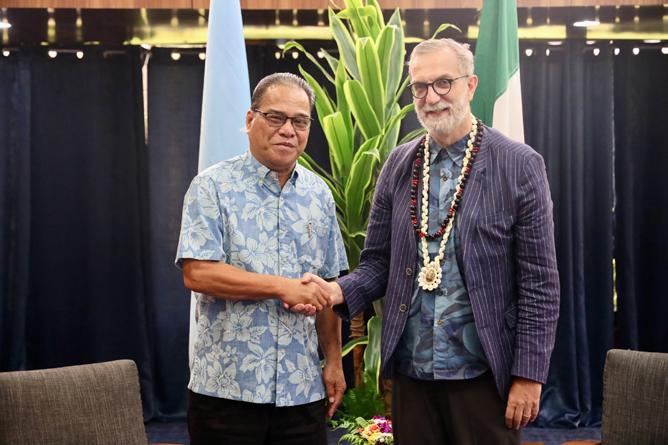
in climate change, renewable energy, sustainable development, and ecotourism, and expressed appreciation for Italy’s leadership in global climate efforts, particularly in reducing emissions and supporting vulnerable countries.
The President commended Italy’s contributions through the European Development Fund and looked
forward to deeper engagement under the Samoa Agreement. He emphasized FSM’s strong support for the establishment of a European Union office in the FSM to strengthen cooperation in the North Pacific and welcomed Italy’s advocacy in this regard.
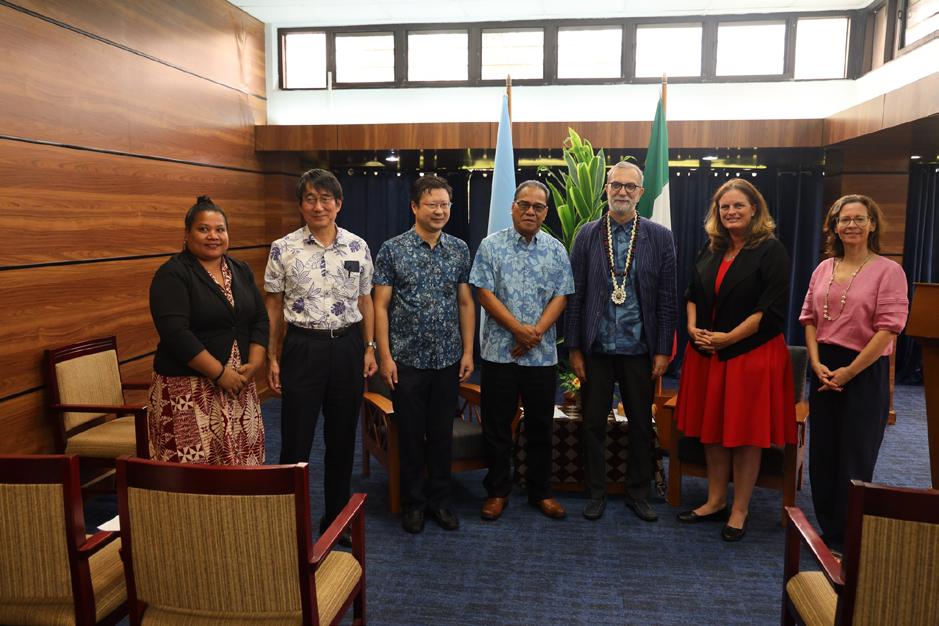
President Simina also conveyed appreciation for Italy’s training and capacity-building initiatives and noted the FSM’s recent establishment of a Permanent Mission in Geneva as a step toward deeper multilateral engagement. He expressed
May 19, 2025
Tofol, Kosrae—The FSM Department of Resources and Development successfully concluded its three-day conference from May 6th to 9th in Kosrae State, centering around the theme “Transforming Our Resources into Opportunities”. The event brought together national, state leaders, private sector representatives, key development partners and community heads to discuss sustainable development, resource management, and how to advance economic growth by 2027 through cross-sector synergy.
The conference focused on priority sectors including agriculture, energy, fisheries, trade, statistics and tourism, reflecting the Department of Resources and Development’s mandate to support sustainable utilization of natural resources and economic development across the FSM states.
The conference also featured a breakout session, panel discussions and networking opportunities aimed at fostering collaboration among various sectors. Participants engaged in meaningful dialogue on pressing issues such as sustainable agriculture, energy, fisheries management, data-driven and tourism. They also discussed the FSM Strategic Development Plan 2024- 2034 (SDP), UN SDGs Goals and the Infrastructure Development Plan (IDP).
Participants also discussed challenges such as limited funding, capacity constraints and better coordination among stakeholders and the private sectors. The conference underscored opportunities for collaboration through ongoing projects and the importance of community involvement in resource management.
Presenters included both national and state representatives who shared insights, ongoing and upcoming projects and best practices in resource management and sustainable development.
Vice President T.H Aren B Palik, delivered the closing remarks, emphasizing the importance of unity and collaboration in addressing the challenges faced by the nation. "It is imperative that we work together to ensure that these resources are managed sustainably for generations to come."
The Vice President also expressed gratitude to the participants and organizers for their commitment to the conference's goals. "This gathering has reaffirmed our collective responsibility to protect our environment and promote sustainable development. The conference concluded with a call to action, encouraging all participants to implement the strategies discussed and to continue the dialogue beyond the event. The conference also served as a vital platform
for collaboration and strategic planning, paving the way for a sustainable and prosperous future for the FSM.
The FSM Department of Resources and
hope for Italy’s support in facilitating cross-accreditation and reaffirmed FSM’s interest in expanding bilateral cooperation, including small grants for community development.
Development looks forward to building on the momentum generated during the conference and fostering ongoing partnerships to achieve sustainable development goals.
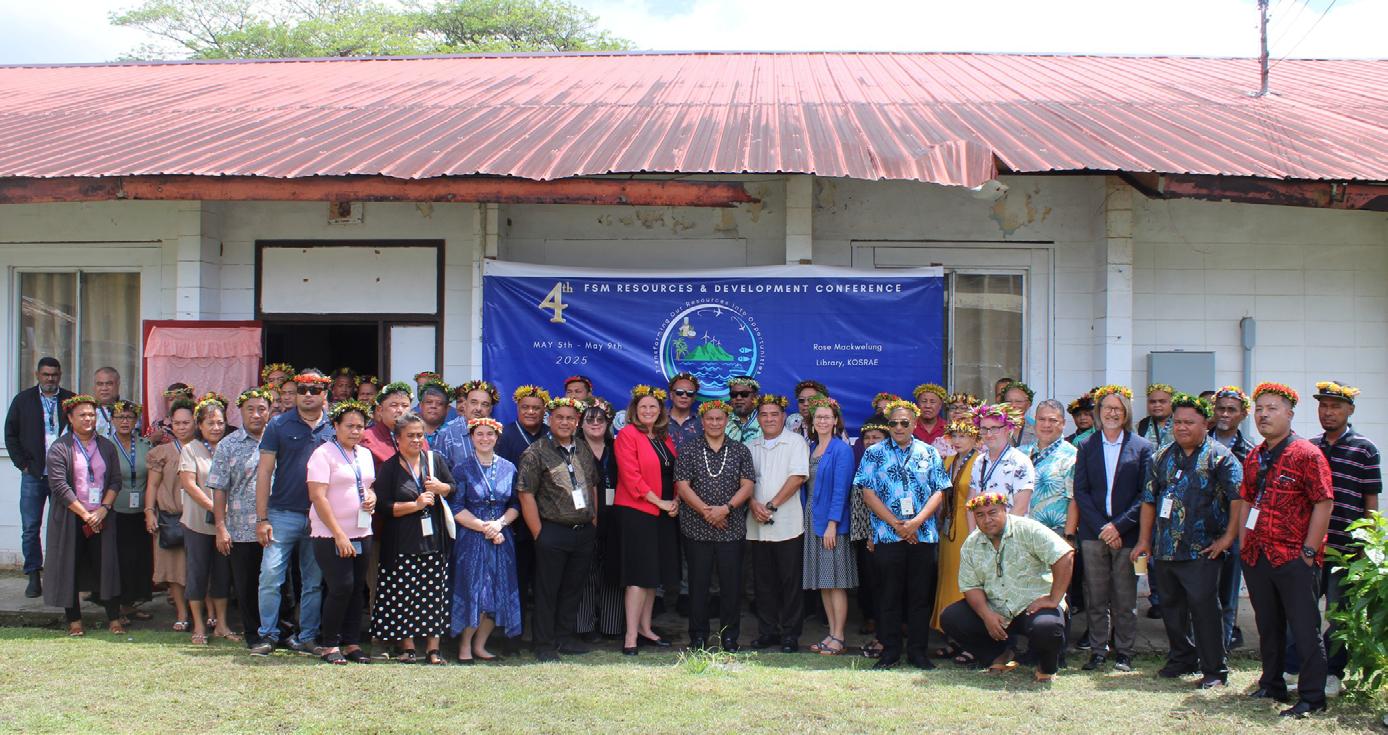
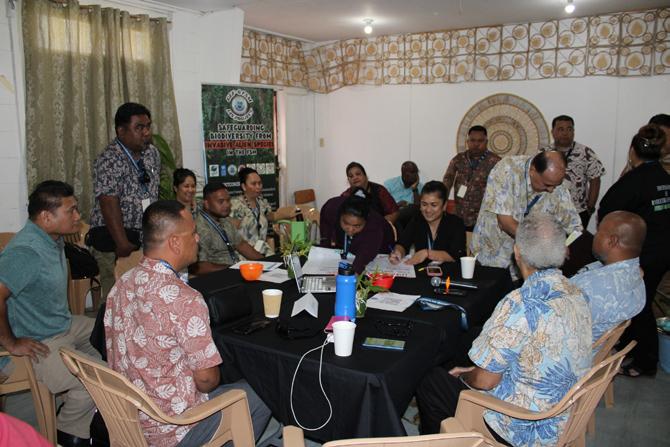



International Organization for Migration
May 25, 2025
Pohnpei—The International Organization for Migration (IOM), with support from the Government of Japan, delivered essential medical equipment and supplies to Pohnpei State, Federated States of Micronesia (FSM), on Friday, 23 May 2025. The handover is part of a regional border management project aimed at strengthening capacities to manage public health threats such as pandemics and disease outbreaks at air and seaports in the Pacific region.
The handover ceremony was officiated by Belsipa Mikel-Isom, Attorney General of Pohnpei State, on behalf of the Governor of Pohnpei, Stevenson Joseph, and marked the transfer of critical medical items to the Pohnpei Port Authority and Pohnpei State Department of Health and Social Affairs. The donated medical equipment and supplies include a thermal scanner, IT equipment, display screens for disseminating priority health messaging, personal protective equipment, and infection prevention supplies.
Ambassador of Japan to the FSM, Nabuo Kagomiya reflected on the
global challenges of the COVID-19 pandemic and stressed the need for preparedness to reduce its impact on lives and livelihoods. "Now COVID-19 has become much less harmful than before, but I have to emphasize nobody knows when we will have another pandemic. The point of the equipment today is to contribute to preparedness," he said, adding that with proper measures in place, future pandemics might be managed without resorting to full border closures.
A.G. Mikel-Isom, emphasized the vital role of partnerships and shared commitment in combatting global health threats. "Maintaining public health at our borders is not only important – it is essential. This equipment will directly support our Department of Health and Social Services in fulfilling their responsibilities and mandates to ensure safe and essential health clearance procedures for aircraft arriving in Pohnpei. We are deeply grateful to the Government of Japan and IOM for the continued partnership in building resilience and strengthening our capacity to serve our people,” she said.
Representing IOM Micronesia Chief of Mission Salvatore Sortino, Marta Damiano, IOM Micronesia Programme Support Unit Coordinator, said "This
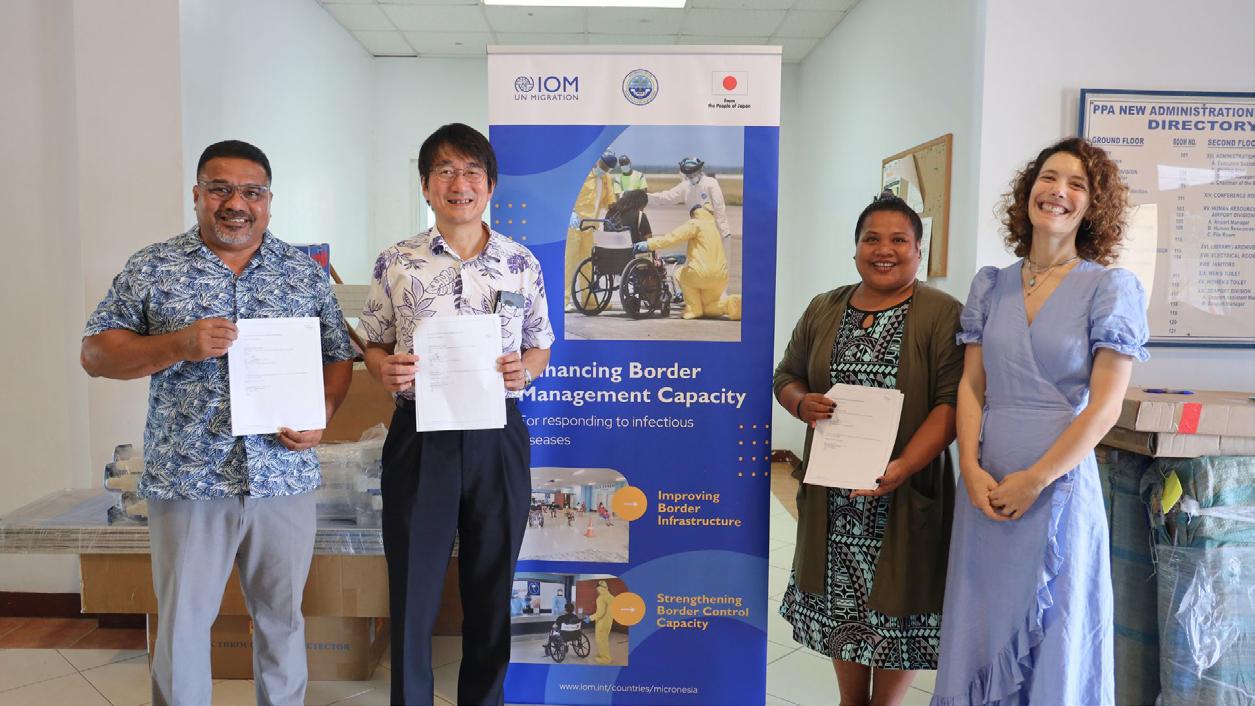

programme originated from the lessons we learned during and in the aftermath of the COVID-19 pandemic, specifically on the importance of robust border management and rapid response in protecting public health. These lessons guide our efforts today and will continue to guide our work to ensure that communities are protected and resilient against future health threats."
The Project – formally titled the Project for Strengthening Capacity of Border Control for Responding to Infectious Diseases in Pacific Island Countries –aims to enhance capacities to withstand future outbreaks and minimize the impacts of border closures on economic activity. In addition to FSM, the Project covers the Republic of the Marshall Islands, Papua New Guinea, Samoa, Tonga, Tuvalu and Vanuatu.
The last major outbreak to affect the FSM was the COVID-19 pandemic which resulted in border closures, travel restrictions, quarantines and lockdown measures for nearly two years. Widespread community transmission of COVID-19 began in July 2022. The prolonged border closures had substantial negative socio-economic impacts affecting the vitality of small businesses, private sector industries, government services and more.
Similar handovers of medical equipment and supplies were conducted in Chuuk, Yap and Kosrae States earlier this year, further strengthening the country’s health security. The handover in Pohnpei is part of a broader initiative by IOM which also officially commenced infrastructure improvement works at points of entry in Chuuk, Yap and Kosrae States. These improvements aim to enhance border health management and screening processes to mitigate the risks of future pandemics like COVID-19. Ongoing infrastructure construction and upgrades include:
• Establishment of prefabricated isolation units
• Construction of handwashing facilities
• Rehabilitation of restrooms
• Provision of water catchment systems
This collaborative effort underscores the shared commitment to improving health security across the Pacific. Continued cooperation between FSM, IOM, the Government of Japan and other partners in the region will play a major role in building a more resilient and prepared response to future health threats, ensuring the safety and wellbeing of communities across the region.
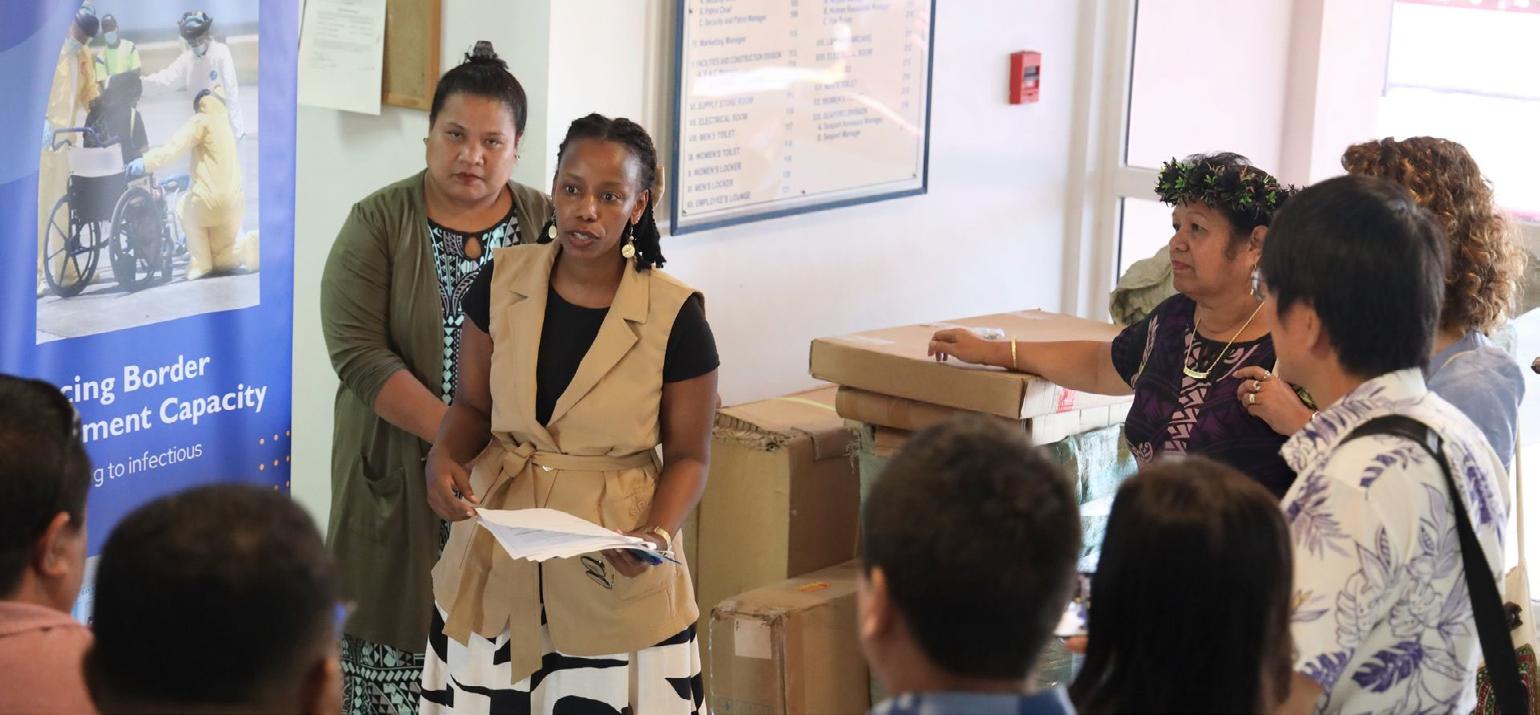

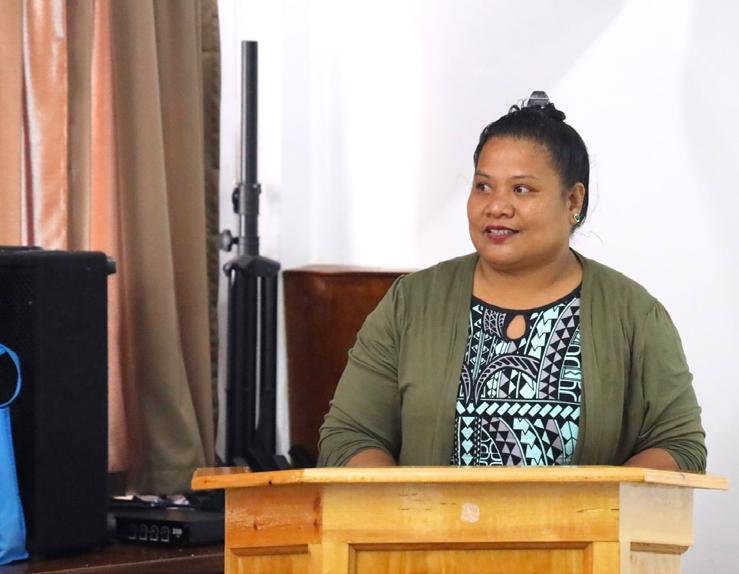

Pohnpei Soccer Association Kids Club
May 24, 2025
Pohnpei—The Pohnpei Soccer Association Kids Club wrapped up the school year in style with its much-anticipated annual tournament. Despite a slightly smaller turnout than usual, nearly 50 young players from the U8 to U14 age groups came together for a day full of soccer, sunshine, and sportsmanship.
Thanks to the combined efforts of our regular coaches, supportive parents, and a fantastic team of volunteers, everything ran smoothly from start to finish.
Weather Report: From Storms to Sun!
What a contrast from last year’s muddy marathon! This time, the sun was out in full force. While the kids needed plenty of sunscreen, one referee smartly brought along a stylish umbrella for shade—a crowd favorite!
Tournament Highlights:
U8 Division:
A series of short but spirited matches kept the youngest players safe in the heat and full of smiles.
U14 Division:
Six teams battled it out in a round-robin format, with each match lasting 17 minutes and 10-minute breaks to beat the heat. Each team was named after a different nation and gave it their all across three fields.
Special thanks to Mrs. Kay Schwendinger for leading the pre-match warmups—though early results showed some teams were still waking up! Egypt and Denmark had slow starts, but Egypt bounced back with impressive resilience to clinch third place.
Final Standings – U14 Division:
Medal Winners:
• Gold – Team France
Photo: Rico, Amaya, Elijah, Castiel (missing: Yoki)
• Silver – Team Brazil
Photo: Jello, Heron, Will, Benji (missing: Noah)
• Bronze – Team Egypt
Photo: Caleb, Johnny, Ethan, Jubali, Geonna
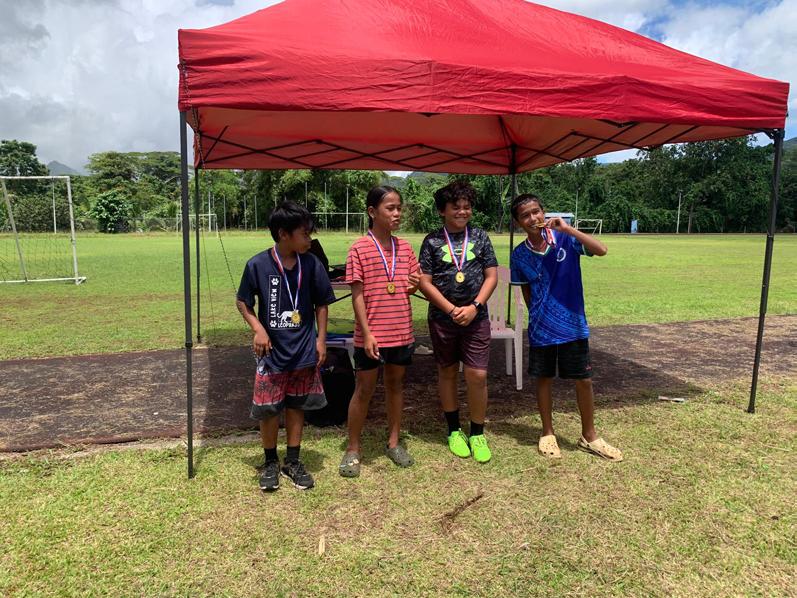
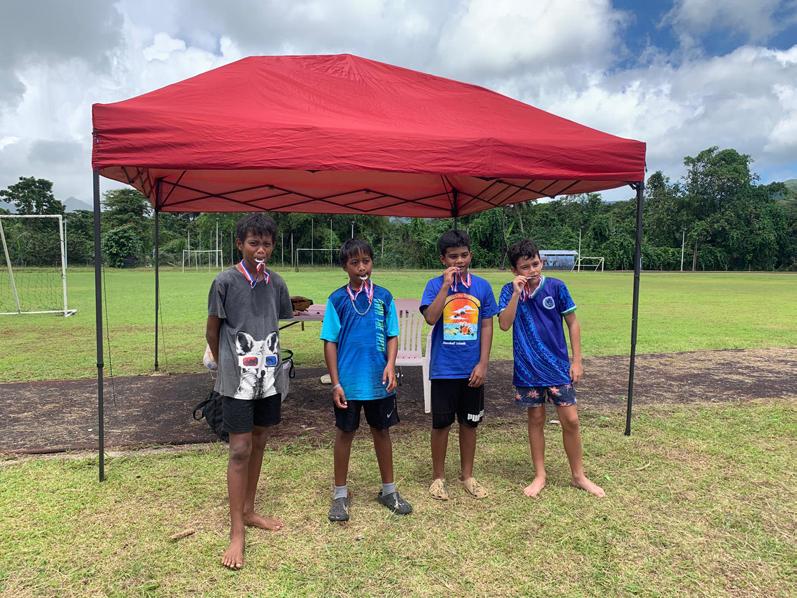

The final matches pushed players to their limits, and fatigue began to show—but not enough to dampen the spirit of the game. Lunch was provided for all participants, and the day concluded with an uplifting award ceremony and proud faces all around.
Thanks to everyone who made this event a success. Until next year—keep playing, keep smiling, and stay cool!
The World Bank Group
May 14, 2025
Local accounting talent is in short supply in the Federated States of Micronesia (FSM). The government typically resorts to hiring foreign consultants to fill many accounting needs. With FMUP’s support, the country is now moving toward increasing the homegrown talent pipeline for business and government – and creating great career opportunities in the process.
Drawing on experience in Africa with FMUP’s FASE program, the FMUP team developed a competency-based curriculum framework for FSM, with three country-specific modules: business law, taxation, and public sector. The team also developed a syllabus, learning materials, and guides for instructors. Work was done in close partnership with the College of Micronesia-FSM (COMFSM), which is offering the program. Graduates earn a certificate from
COM-FSM.
As the only community college in a Big Ocean State, COM-FSM partnerships are critical to missiondriven success,” said Theresa Koroivulaono, Ph.D, President and Chief Executive Officer of COMFSM.
“Partnering with the World Bank to develop and deliver a globally competitive accounting technician program that directly provides quality
graduates for FSM's workforce is a milestone achievement."
The first class of accounting technicians started in January 2025. The class includes 30 students from the government sector, 20 women and 10 men. The accounting program is being delivered by COM-FSM on its main campus in Palikir, Pohnpei, with an online option to reach students from other FSM islands.

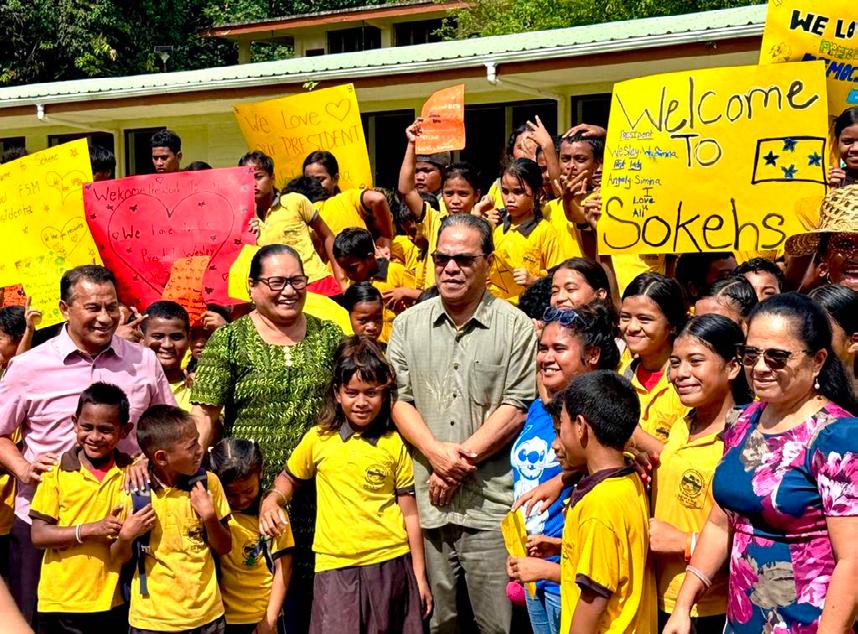
May 20, 2025
SOKEHS, Pohnpei—As part of his administration’s ongoing nationwide community outreach to strengthen unity and collaboration across the country, His Excellency President Wesley W. Simina visited the leadership and people of Sokehs Municipality on May 13, 2025. The visit marked another important stop in President Simina’s commitment to engage directly with communities at the grassroots level, ensuring that the voice of the people continues to shape the nation’s path forward.
In a gathering attended by traditional leaders, municipal government officials, community members, and clergy, President Simina offered his utmost respects to the traditional leadership of Sokehs, including Nahnmwarki of Sokehs His Excellency Wasa Lapalap Nahn Puchak Pikin Yap, the Iso Nahnken of Sokehs, and all other traditional and municipal leaders. He reaffirmed the importance of mutual respect and the historical significance of Sokehs’ role in hosting the nation’s capital in Palikir, a decision he described as affirming a long-standing prophecy and shaping the modern identity of the Federated States of Micronesia.
Addressing the gathering, President Simina emphasized that the administration’s domestic policy remains grounded in the principles of unity, peace, and harmony—values that are best advanced through meaningful and inclusive engagement with the people.
“It is our intention to interact with local leaders across the nation, not only to listen but to collaborate meaningfully in overcoming shared challenges,” President Simina stated. “Let it be known that we are fully committed to a partnership of mutual understanding and lasting cooperation with the leadership of Sokehs.”
As a tangible expression of this commitment, President Simina pledged $1.5 million in infrastructure project funding to be identified by the Sokehs Municipal Government. He affirmed
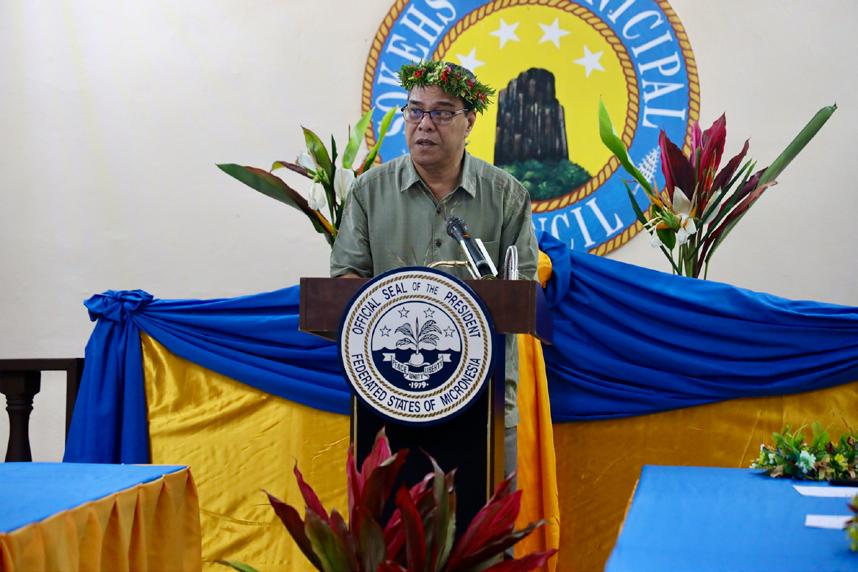
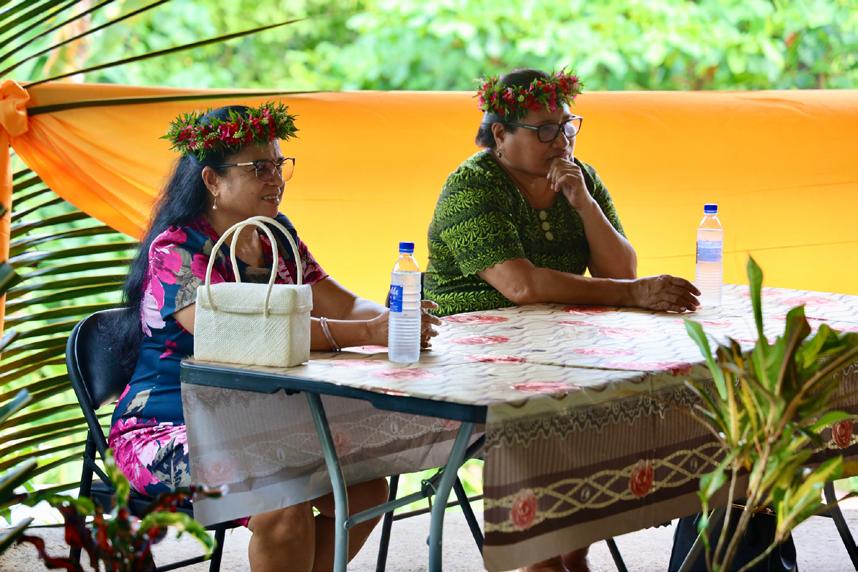
that once the projects are identified, the national government stands ready to support and expedite implementation in close partnership with local authorities.


The visit to Sokehs is one of many outreach initiatives under the Simina-Palik Administration’s broader KAMORALE mission—to unite the nation by actively engaging with communities, reinforcing local partnerships and empowering the community-based solutions.
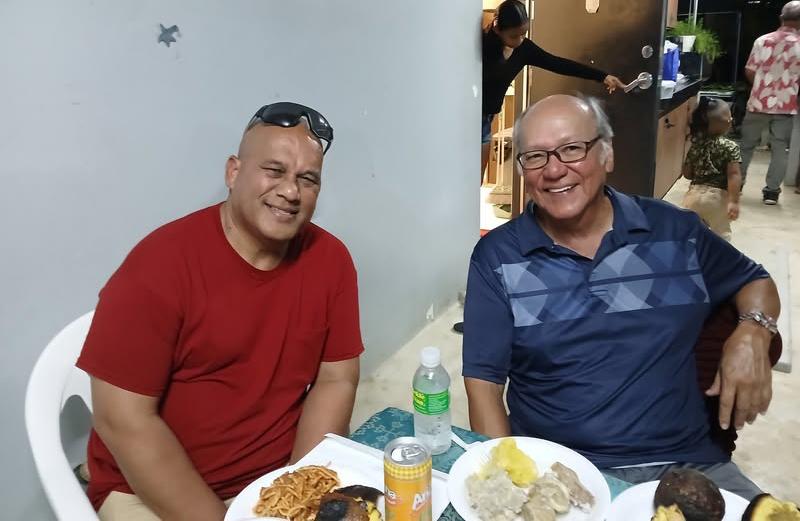
May 17, 2025
Saipan, CNMI—While in Saipan to attend the Pacific Islands Development Bank (PIDB) Board of Governors Meeting, Governor Stevenson A. Joseph of Pohnpei State used the opportunity to engage with community, government, and business leaders throughout the Northern Mariana Islands.
As part of these engagements, Governor Joseph held a productive meeting with Mr. Norman Tenorio, a respected member of the Saipan business community and a principal of JOETEN Enterprises. The two discussed regional economic issues, including insights into the role of the local private sector and shared interests in economic development across Micronesia.
One of the key topics discussed was the possible sale of a passenger vessel to the Pohnpei State Government. The vessel could potentially enhance inter-island travel and improve essential services to the outer islands of Pohnpei. Mr. Tenorio provided preliminary information on the vessel.
Governor Joseph thanked Mr. Tenorio for his time and insight and requested further technical and financial details on the vessel for review by the appropriate authorities in Pohnpei.
This meeting reflects the Joseph administration’s broader efforts to strengthen regional collaboration and pursue practical solutions that support the development needs of Pohnpei State.
Pohnpei Public Information
May 16, 2025
Garapan, Saipan—Following his participation in the Pacific Islands Development Bank (PIDB) Board of Governors meeting, Governor Stevenson A. Joseph of Pohnpei State visited Garapan Elementary School, where he received a warm welcome from school leaders and staff.
Principal Derwin C. Johnson and Vice Principal Jaclyn A. Quitugua led Governor Joseph on a tour of the campus, accompanied by Mrs. Victoria Sablan Nicholas from the CNMI Public School System. The visit brought back meaningful memories for Governor Joseph, who attended Garapan Elementary in the late 1970s through 1980.
Garapan Elementary School holds a unique place in Micronesian history. During the Trust Territory of the Pacific Islands era, the school served the children of government employees from across the region—including Palau, the present-day Federated States of Micronesia, and the Republic of the Marshall Islands—before these islands became sovereign nations.
Governor Joseph noted with pride that Garapan was where
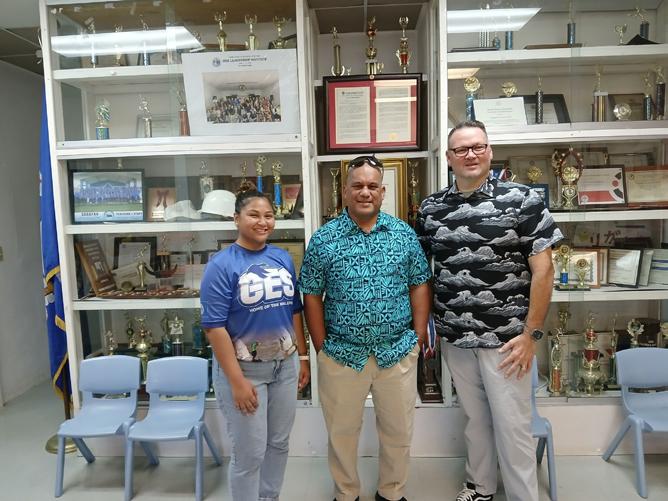
he learned his ABCs and 123s— marking the foundation of his lifelong commitment to learning and public service.
The Pohnpei State Government extends its heartfelt thanks to Principal Johnson, Vice Principal Quitugua, Mrs. Victoria Sablan Nicholas, and the entire Garapan Elementary community for their warm hospitality and for continuing to uphold the legacy of unity and education in Micronesia.

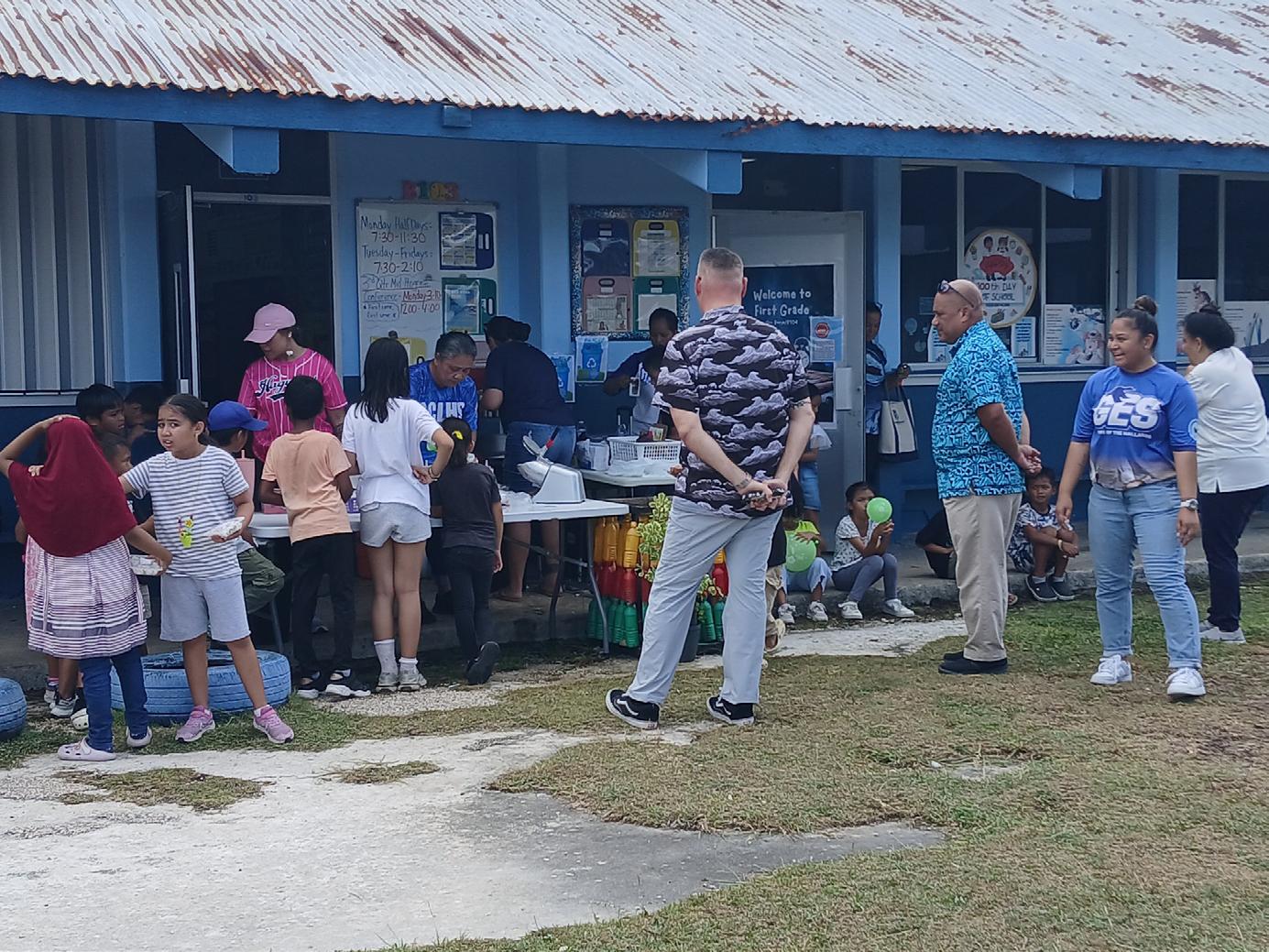

May 22, 205 Pohnpei—Governor Stevenson A. Joseph and members of his Cabinet welcomed a distinguished delegation from the Bank of Guam on Tuesday, May 20, 2025, for a courtesy call that reflected a shared commitment to collaboration, economic progress, and community-centered banking in Pohnpei State.
The visiting delegation was led by Maria Eugenia Leon Guerrero, Executive Vice President and Chief Operating Officer of the Bank of Guam, accompanied by Christopher Cruz, Neighboring Islands Regional Manager; Joiz Salas, Vice President and Relationship Banking Manager; Asterio Takesy, Vice President of Governmental Affairs; and Ryan Ditchen, Pohnpei Branch Manager and proud native of Pohnpei.
Discussions during the meeting were broad, candid, and constructive— focusing on key issues of mutual interest including housing loans, land use concerns, banking security access, and the evolving banking landscape across Pohnpei and the broader region. These matters were deliberated alongside Sihna N. Lawrence, Director of the Department of Treasury and Administration, Chief of Staff Benjamin Rodriguez and Henry Saimon Jr., Executive Director of the Pohnpei
Housing Authority.
Governor Joseph expressed his gratitude for the Bank of Guam’s longstanding partnership, emphasizing the institution’s vital role in supporting the state’s financial development. “The Bank of Guam has always stood as a trusted partner in our island’s development,” said Governor Joseph. He noted that their conversations reaffirmed a shared commitment—to expand financial inclusion, tackle housing challenges, and improve banking services for all of our people, especially those in the outer islands and underserved communities.
The Governor also acknowledged the presence and leadership of Mr. Ryan Ditchen, whose Pohnpeian roots and local insights will enrich the bank's relationship with the community.
The Bank of Guam delegation expressed their deep appreciation for the opportunity to engage directly with the Governor and his team, reaffirming their commitment to exploring practical, people-first solutions to longstanding challenges in housing finance, banking access, and land security frameworks.
This courtesy call marks a continued step forward in building bridges between financial institutions and local leadership, reinforcing transparency, partnership, and a shared vision of progress for the people of Pohnpei.
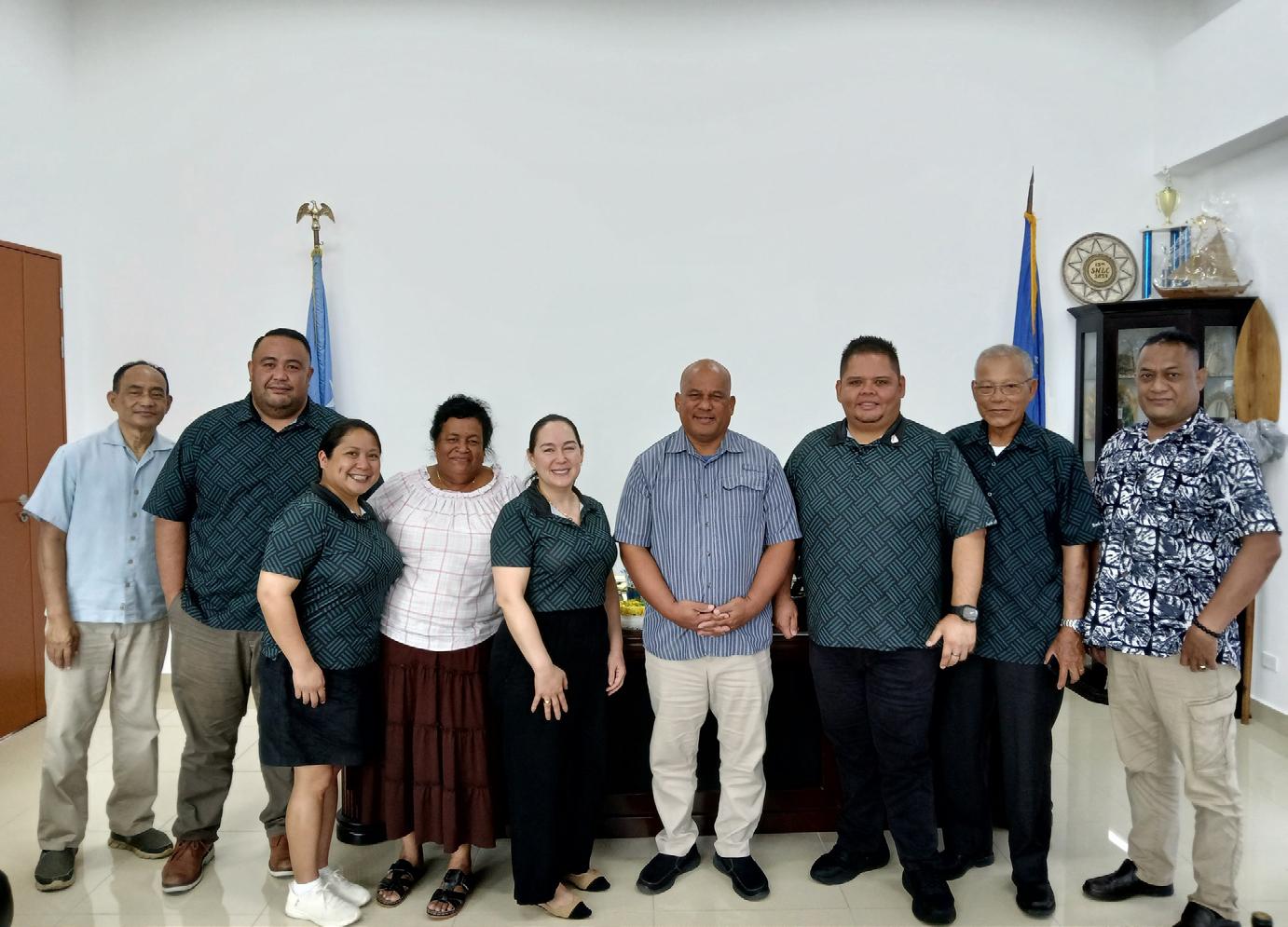

May 19, 2025
Kolonia, Pohnpei–Governor Stevenson
A. Joseph attended the official handover ceremony of agriculture equipment to Pohnpei Island Central School (PICS) today, marking a significant milestone in the enhancement of vocational education in the state. The equipment, along with upcoming renovations to the agriculture classrooms, is funded by the FSM Skills and Employability Enhancement (SEE) Project through the National Department of Education (NDOE) and the World Bank.
In his remarks, Governor Joseph emphasized that this investment goes beyond providing tools and facilities— it represents a strategic effort to equip students with practical skills, selfreliance, and real opportunities for future employment. He acknowledged the importance of strengthening vocational education to meet both local needs and global workforce demands.
Governor Joseph expressed appreciation to the NDOE, World
Bank and the SEE Project team for their continued support and partnership in building stronger educational pathways for the youth of Pohnpei. He also reaffirmed his administration’s commitment to prioritizing education and skills development as key pillars for sustainable growth in the state.
The SEE Project is a national initiative designed to improve technical and vocational education across the Federated States of Micronesia, helping students gain the skills necessary to succeed in a changing economy.
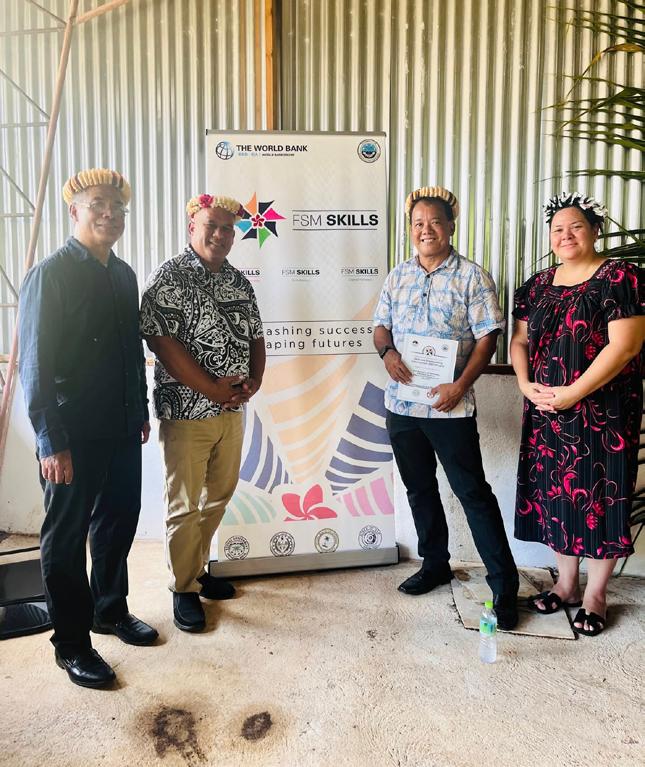
Pohnpei Public Information
May 16, 2025
Saipan, CNMI—While in Saipan to attend the Pacific Islands Development Bank (PIDB) Board of Governors Meeting, the Honorable Stevenson A. Joseph, Governor of Pohnpei State, paid a courtesy call on the Honorable Arnold I. Palacios, Governor of the Commonwealth of the Northern Mariana Islands (CNMI).
The meeting between the two leaders was marked by a warm and friendly exchange, reflecting the deep bonds shared among Micronesian islands. Governor Joseph and Governor Palacios discussed several key regional issues, including transportation, economic development, tourism, and the continued importance of unity across Micronesia.
Both leaders reaffirmed their commitment to inter-island cooperation and emphasized the need for strengthened partnerships to address common challenges and pursue shared goals.
Governor Joseph’s courtesy call on Governor Palacios highlights the growing spirit of collaboration among Micronesian leaders and the enduring ties between Pohnpei and the CNMI.
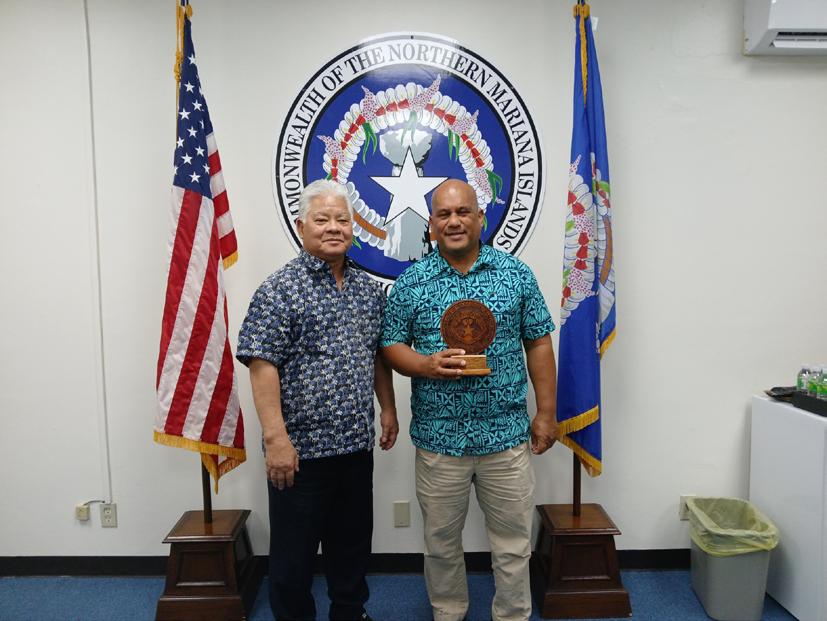
Pohnpei Public Information
May 17, 2025
Garapan, Saipan—While in the Commonwealth of the Northern Mariana Islands (CNMI) to attend the Pacific Islands Development Bank (PIDB) Board of Governors’ Annual Meeting, Governor Stevenson A. Joseph of Pohnpei State met with members of the Pohnpeian community at the historic Carolinian Utt in Garapan on Friday, May 16, 2025.
The gathering provided a heartfelt and constructive opportunity for Governor Joseph to engage with Pohnpeians residing in Saipan and nearby islands— many of whom continue to make meaningful contributions to their local communities while maintaining strong connections to Pohnpei.
In his opening remarks, Governor Joseph expressed deep appreciation for the unity, strength, and continued involvement of the Pohnpeian diaspora. “You are a vital part of our journey. Whether at home or abroad, your voices matter in building a better, stronger Pohnpei,” the Governor said.
Governor Joseph shared updates on his administration’s core priorities, emphasizing a holistic approach to building resilience and improving quality of life for all Pohnpeians. These priorities include:
Food security, through strengthened local agriculture and fisheries; Energy security, with a focus on renewable and reliable energy systems; Water security, by improving infrastructure and access to clean water; and
Prevention of non-communicable diseases (NCDs), through community health initiatives and healthier lifestyle promotion.
He also provided updates on key state initiatives, including infrastructure development, education and healthcare improvements, and the strengthening of financial management and government accountability.
During the open forum, community members raised thoughtful concerns and questions, including:
The need for improved local revenue generation and financial stability; Challenges in water and power management; Updates on the Pohnpei State Trust Fund; The minimum wage and employment opportunities in Pohnpei; and The availability of scholarship opportunities from both the Pohnpei State and FSM National Governments.
Governor Joseph welcomed the community’s input and assured them that their concerns are being taken seriously. He emphasized the importance of ongoing engagement with citizens abroad, especially in areas such as youth development, education, and cultural preservation.
The Governor was accompanied by Director of the Department of Treasury and Administration, Ms. Sihna N. Lawrence, and Public Affairs Officer, Mr. Patrick Pedrus. Their presence underscored the administration’s commitment to transparency, accountability, and open dialogue with all Pohnpeians, regardless of location.
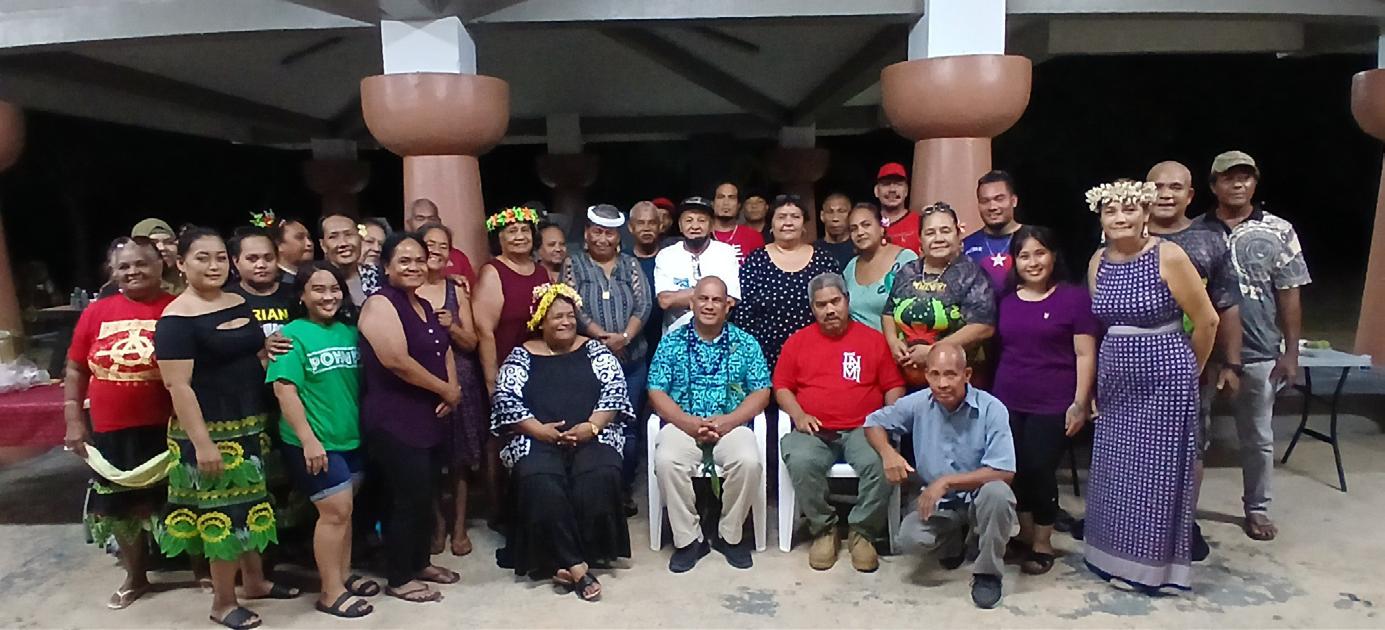

Pohnpei
Public Information
May 14, 2025
Saipan, CNMI—Governor Stevenson A. Joseph took the opportunity during his visit to Saipan for the Pacific Islands Development Bank (PIDB) Board of Governors Annual Meeting to tour key waste management sites across the island. The visit reflects the Governor’s ongoing commitment to identifying effective and sustainable practices that could be adapted to improve solid waste management in Pohnpei.
Governor Joseph was accompanied by the Director of the Department of Treasury and Administration, Sihna N. Lawrence, Director of Administration and Budget for Pohnpei Legislature, Carlos Villazon, Governor Tulensa Palik of Kosrae and his Special Assistant Nena William and other officials.
The tour began at the former dump site in Puerto Rico, which has been successfully transformed into a vibrant public park. Former Lieutenant Governor Diego Benavente, Director Emeritus of the Pacific Islands Development Bank, guided the Governor through the site and shared the history of Saipan’s waste management efforts, emphasizing the long-term planning and community collaboration that made the transformation possible.
The Governor next visited the Transfer Station in Lower Base, where collected waste is sorted and segregated. Items that meet specific criteria are then sent to the Marpi Landfill, while others are
diverted for recycling. Governor Joseph observed how organized sorting and infrastructure investments have helped Saipan manage its waste streams more efficiently.
At the Marpi Landfill, Mr. James Benavente, son of Diego Benavente and a key figure in the landfill’s operations, provided an overview of the facility’s design and ongoing practices. These include engineered landfill management, leachate control, methane and the promotion of sustainable waste disposal practices.
During the visit, Governor Joseph was also shown a mobile shredding machine located at the Marpi site. While a live demonstration was not conducted, the Governor was briefed on the machine’s unique capabilities, including its ability to shred rubber tires and other non-metallic bulky waste. He expressed strong interest and support for exploring the adoption of a similar system in Pohnpei, recognizing its potential to help reduce landfill volume and manage problematic waste materials more effectively.
Governor Joseph conveyed his gratitude to both Mr. Diego Benavente and Mr. James Benavente for sharing their expertise and for highlighting Saipan’s progress in this critical area. He acknowledged the value of the insights gained during the visit and reaffirmed his administration’s commitment to developing a more resilient and environmentally responsible waste management system in Pohnpei.
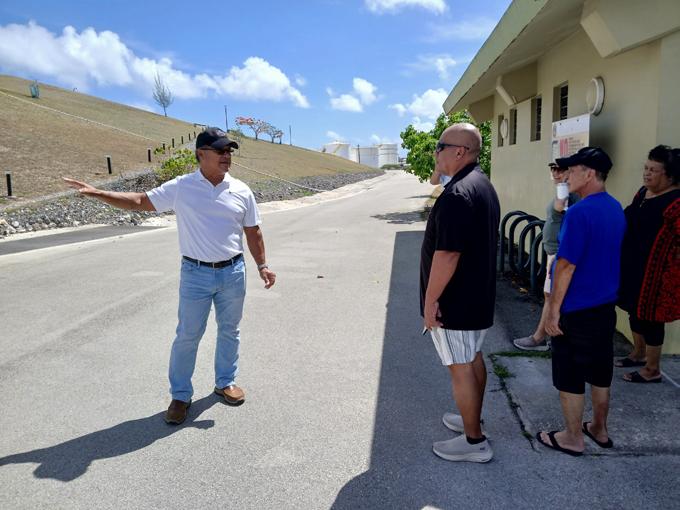
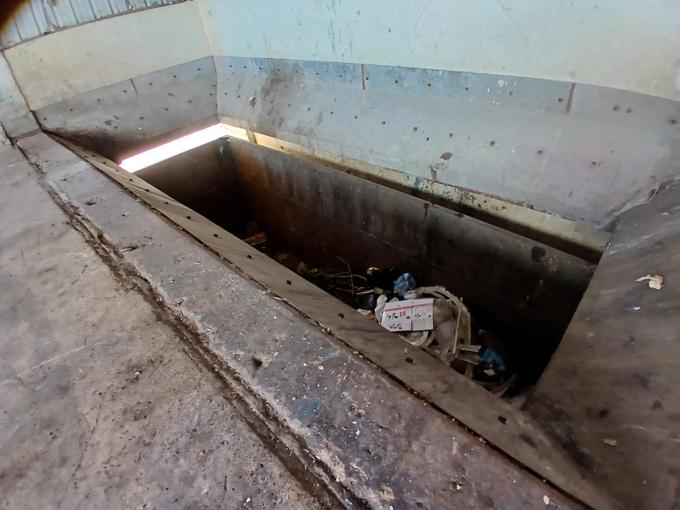
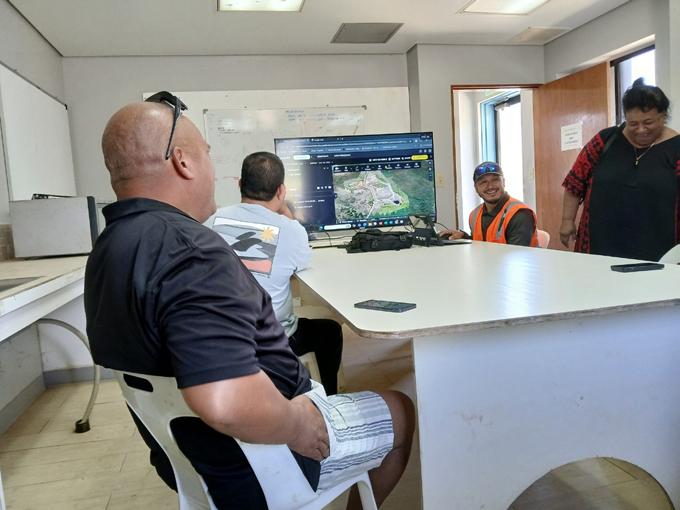
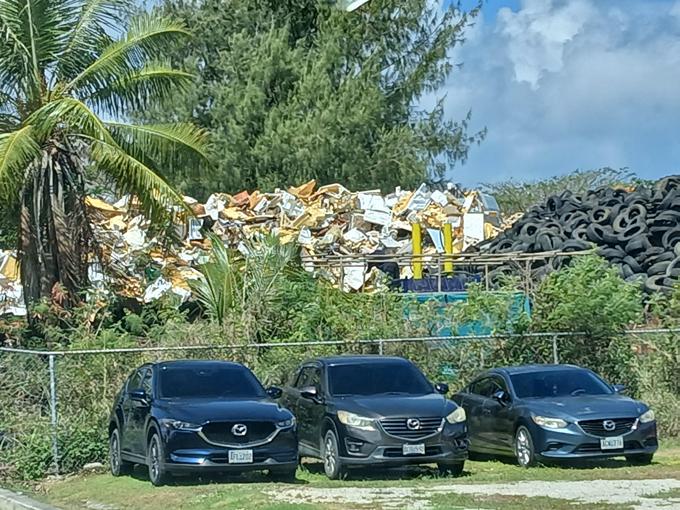
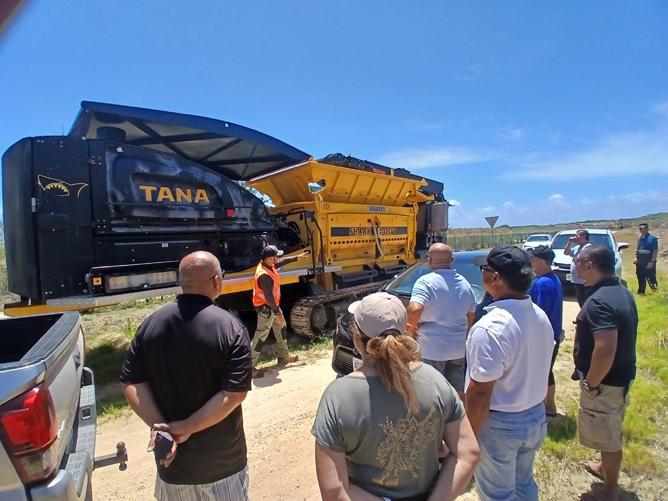
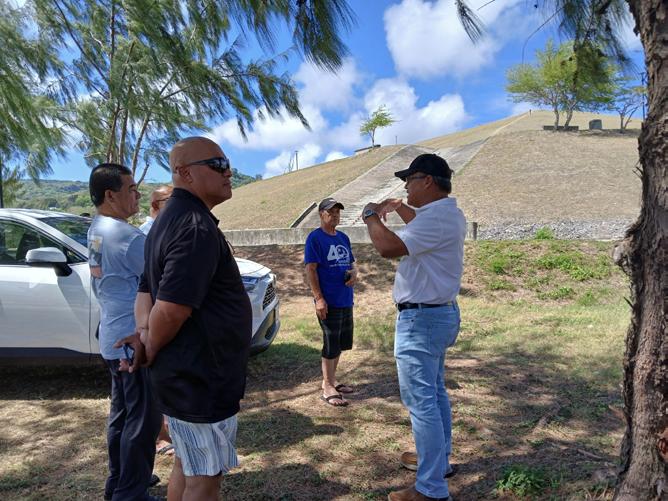

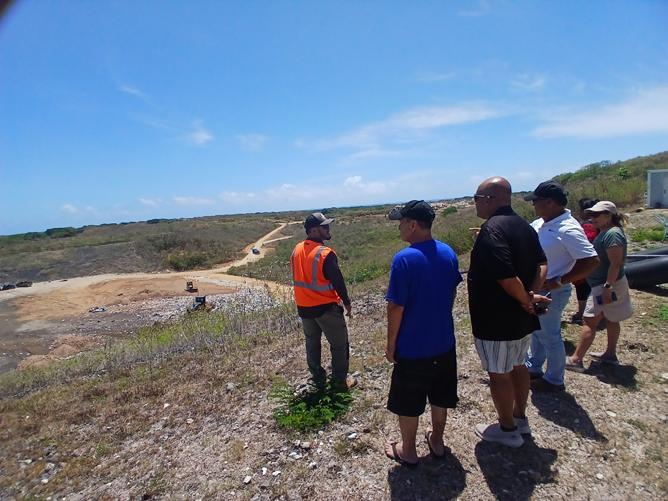
as Guam Memorial Hospital and Guam Regional Medical City.
May 19, 2025
Guam—While in Guam returning from Saipan, Governor Joseph met with a longtime resident of Pohnpei and experienced IT professional, Mr. Sepehr Sohrab. Mr. Sohrab is currently based in Guam, working as an IT Manager for the only Nephrology Clinic on Guam, which provides clinical healthcare services to the hemodialysis medical care units across Guam as well
During the meeting, Governor Stevenson A. Joseph and Mr. Sohrab engaged in a wide-ranging discussion that included innovative approaches to improving public health services in Pohnpei. One idea shared by Governor Joseph involved the possibility of exploring how Medicaid benefits—


May 20, 2025
KOLONIA, Pohnpei— His Excellency Wesley W. Simina, President of the Federated States of Micronesia (FSM), led a high-level delegation to the United Nations Multi-Country Office (UNMCO) in Kolonia on May 15, 2025, marking the first official visit by an FSM President to the UNMCO since its establishment.
Accompanied by the Honorable Vice President Aren B. Palik, members of their Cabinet and heads of FSM overseas missions, President Simina’s visit highlights the administration’s commitment to strengthening multilateral cooperation and ensuring that the voices and needs of the North Pacific are represented on the global stage.
In his remarks, President Simina underscored the critical role of the UN’s presence in the FSM and the wider Micronesian region, calling the UNMCO a “symbol of our region’s voice being heard and our needs being recognized.” He reflected on the historic establishment of the office, made possible through persistent advocacy and collaboration, and expressed profound gratitude for the deepened engagement and tangible support that the office has brought to the region.
The Kolonia-based UNMCO serves not only the FSM, but also the Republic of Palau, the Republic of the Marshall Islands, the Republic of Nauru, and the Republic of Kiribati. President Simina celebrated the evolution of the UNMCO into a vibrant hub of international cooperation, now home
Continued from previous page
to 17 UN agencies actively working with Micronesian governments and communities.
From climate resilience and public health to digital transformation and sustainable development, the UN’s work in the North Pacific has yielded meaningful progress. President Simina emphasized that this success is not simply measured in figures, but in trust, mutual respect, and a renewed partnership rooted in shared goals.
Looking ahead, the President expressed strong support for the construction of the One UN Micronesia House, a planned permanent, carbonneutral facility in Pohnpei that will unify UN agencies and other regional partners under one roof. He affirmed the FSM’s commitment to supporting the fundraising and realization of this important initiative.
Despite global funding constraints, including significant cuts to the UN system, President Simina stressed the importance of a unified, multilateral approach to confronting the challenges faced by FSM and other small island developing states, especially in the areas of climate change and development.
“We are proving that multilateralism works—and that no one is truly left behind when we walk forward together,” said the President.
The Office of the President extends its deep appreciation to UN Resident Coordinator Mr. Tapan Mishra and the entire UNMCO team for their hospitality and continued dedication to the people of Micronesia.
available to citizens of the Federated States of Micronesia (FSM) under the Compact of Free Association (COFA)—might be made available here in the FSM principally to help support hemodialysis needs primarily for citizens currently receiving the service in the U.S. and its territories.
Governor Joseph believes that this arrangement might compel hemodialysis patients to return home to receive treatment. And in doing so, it could potentially reduce the burden our people have imposed on the various social programs utilized by FSM Citizens in the U.S and its territories. The Governor said that the basic idea here is to “bring our people home and

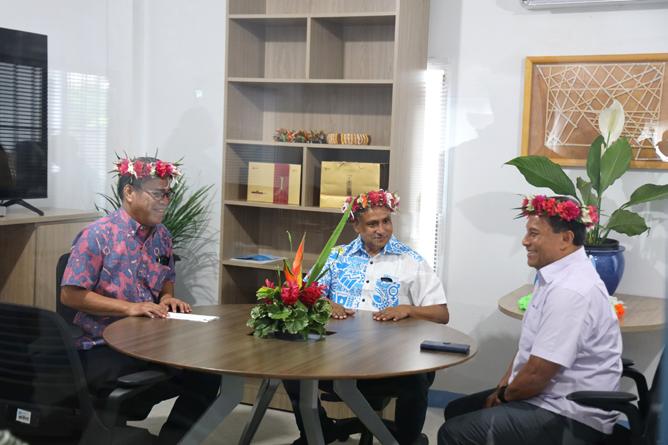
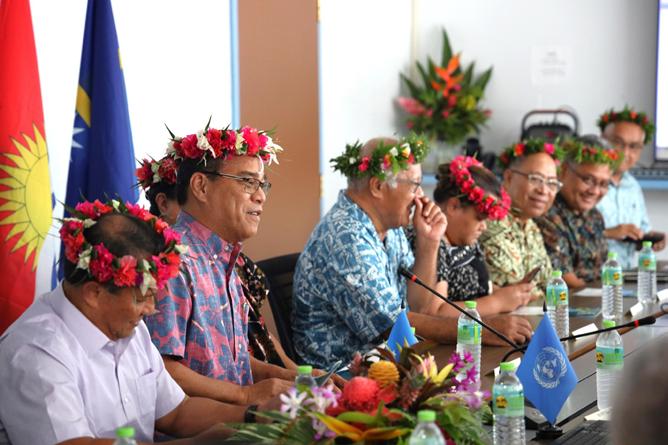
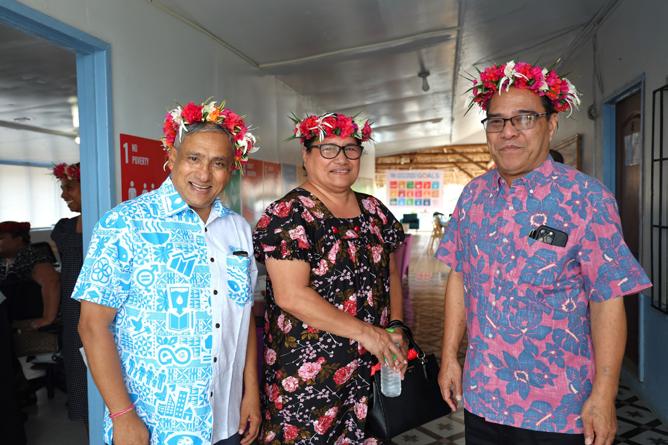
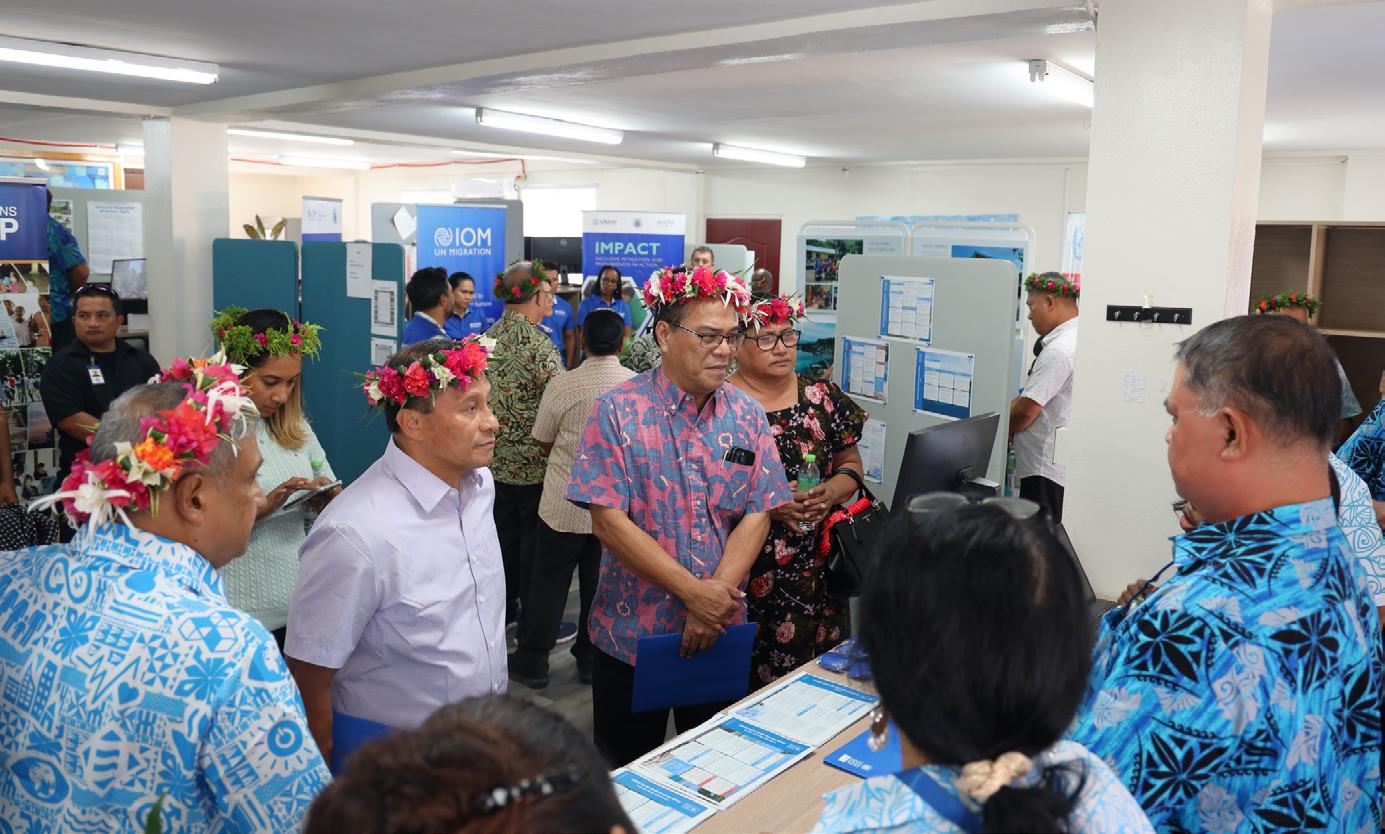


continue the hemodialysis service that they are already getting”.
Given Mr. Sohrab’s professional experience with technology systems and medical service providers, particularly in the hemodialysis field, the conversation touched on the technical and logistical aspects of such a potential initiative. Governor Joseph emphasized that any such effort obviously would require further
research, coordination and serious dialogue with relevant stakeholders. And of course, comply with federal and FSM health policy frameworks.
Mr. Sohrab expressed appreciation for the opportunity to engage in this conversation and reaffirmed his continued commitment to supporting the people of Pohnpei in areas where his experience may be of value.

Secretariat of the Pacific Community
May 21, 2025
Deuba, Fiji—The Ministry of Environment and Climate Change in Fiji, in partnership with the Climate Finance Access Network (CFAN), the Rocky Mountain Institute (RMI), the Pacific Community (SPC) and the Global Green Growth Institute (GGGI), officially launched the 4th Pacific Regional CFAN Workshop on Monday, 12 May2025, at the Pearl Resort in Deuba, Fiji.
The four-day workshop brought together the 12 CFAN Pacific advisors, respective government partners, technical partners, and donor partner representatives from across the Pacific to accelerate access to and mobilisation of climate finance in the region. Countries that are currently supported by CFAN in the Pacific are the Cook Islands, Federated States of Micronesia, Fiji, French Polynesia, Kiribati, Papua New Guinea, Samoa, Solomon Islands, Tonga, Tuvalu, Vanuatu, and SPC; CFAN also supports 8 advisors embedded within the Caribbean region.
In his opening remarks, the Permanent Secretary, Ministry of Environment and Climate Change - Dr. Sivendra Michael underscored the urgent need for strategic collaboration to unlock climate
finance for transformative action across the Blue Pacific, “CFAN advisors are catalysts of change in a rapidly evolving multilateral climate finance landscape. We need highquality, coordinated finance aligned with national priorities that enables resilient, lowemission development,” said Dr. Michael.
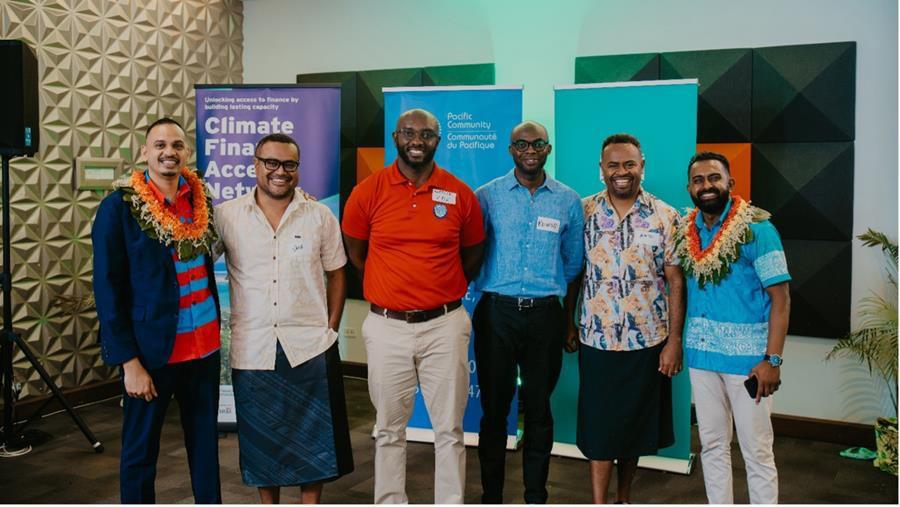
This workshop follows the completion of CFAN’s advisor training programme and three prior regional workshops, which have collectively established a strong network of incountry climate finance advisors, who are strategically embedded in Pacific countries and are now shaping pipelines of impactful, country-driven projects.
Dr. Kaitlyn Bunker, Director of CFAN at the Rocky Mountain Institute (RMI), acknowledged the growing expertise within the network, “Our advisors have built a pipeline of transformative climate projects. The next step is unlocking and scaling finance. This workshop is designed to equip advisors with the tools, strategies, and partnerships to bridge the gap between ambition and implementation,” she said.
Key sessions throughout the workshop
focused on strengthening bankability and feasibility of projects, donor engagement strategies, financial structuring, and effective project proposal pitching. A highlight of the workshop programme was the Donor Roundtable and Project Pitching Session, where advisors engaged directly with financing partners to present shovel-ready projects that they have been working on.
Peer-to-peer learning amongst the Pacific participants attending the workshop was further strengthened by the attendance of a senior technical representative from the CARICOM Development Fund (CDF) –Mr. Kenrick Burke. This allowed Pacificbased participants to gain insights on the strategies that have been adopted in the Caribbean Region in mobilizing critical finance for their climate change priorities
The Government of Fiji has reaffirmed its
May 15, 2025
Suva, Fiji—The Pacific Community’s Director General, Dr Stuart Minchin, has received a lifetime achievement award for his dedication to unlocking access to data for communities in the Pacific and abroad.
The 2025 Group on Earth Observations (GEO) Lifetime Achievement Award was presented to Dr Minchin for his decades long leadership in taking hard to use satellite imagery and turning it into useful decision-making products for communities.
Dr Minchin championed Digital Earth in Australia, Africa, and most recently in the Pacific, which provides free and accessible tools to show how coastlines
are changing, how mangroves are changing, or how illegal river gravel extraction is impacting rivers, for example.
Dr Minchin recognizes the importance that data plays for the Pacific, especially in the face of the climate crisis.
“This award belongs to every Pacific community turning satellite imagery into decisive action”, Dr Minchin said. “With the right partnerships, it can also anchor climatefinance deals and sharpen the Pacific’s voice in global policy rooms.
SPC is the Pacific’s scientific and technical
agency, serving Pacific Island countries and territories by accessing, catalysing, and using the best available science for effective decision-making.
Digital Earth Pacific, launched in 2023, has provided real-time tools to governments across the region to understand how remote islands are being impacted by climate change or to better understand how erosion is impacting key sites such as the Runit Dome in the Republic of the Marshall Islands.
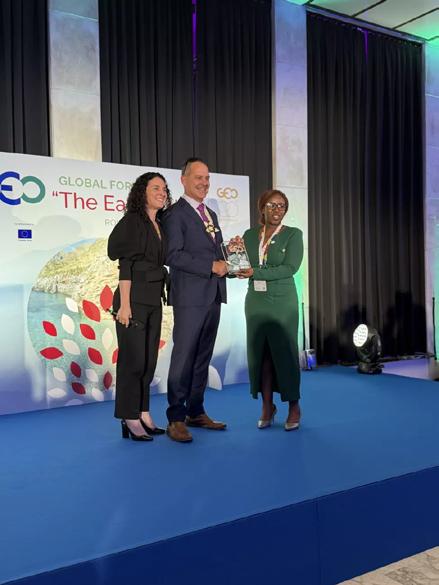
The system uses the global satellites that fly over the region daily and turns the data into useful information that is free and accessible however in the past this
strong support for CFAN’s role in enhancing national capacity to access climate finance not only in Fiji but across the region.
“The Pacific’s climate priorities demand enduring partnerships and consistent investment in local expertise. CFAN’s support remains integral to achieving both our national goals and our collective regional resilience,” said Dr. Michael.
SPC also sees the importance of the CFAN initiative for its members.
“We have seen the value-add of our CFAN advisors in places like FSM and French Polynesia, where they become an external deployment of SPC’s climate finance capabilities according to the direction of the national government,” commented Dirk Snyman, Climate Finance Coordinator for SPC. “We are hoping to extend and expand this network to additional SPC Members in the coming months and years.”
The Regional CFAN Workshop represented a vital step in unlocking the climate finance urgently needed by Pacific Island nations to deliver on their adaptation, mitigation, and sustainable development commitments.
data cost countries thousands of dollars.
Democratizing access to data and scaling investment in digital transformation alongside countries is paramount for the Pacific and an area of work that Dr Minchin continues to champion through SPC and regional organizations of the Pacific.
This work is already being recognized by countries and will continue to grow over the coming years.
About the GEO Lifetime Achievement Award:
The GEO Lifetime Achievement Award celebrates individuals whose careerlong contributions advance GEO’s core values of collaboration, open data and societal benefit. Dr Minchin joins a select group of global leaders whose work has expanded equitable access to Earth-observation science throughout his career.

Pacific Regional Council for Early Childhood Development
May 13, 2025
Apia, Samoa—Two years after the 2023 Pacific Early Childhood Development (ECD) Forum that took place in Fiji, 15 Pacific Island countries have gathered this week in Apia, Samoa to evaluate the progress on ECD in the past two years, highlight challenges, and share experiences.
“There is no greater calling than to shape the world through the heart of a child. And there is no deeper honour than to do so together — grounded in culture, lifted by purpose, and united by faith,” said the Chief Executive Officer at Samoa’s Ministry of Women, Community and Social Development, Ms. Loau Donina Va'a. “Samoa is proud to champion early childhood development across our region, ensuring every child is seen, heard, and

nurtured from the very beginning.”
For children to achieve their full potential, they need quality healthcare and nutrition, protection from abuse and violence, early learning opportunities as well as responsive caregiving.
Unfortunately, many disadvantaged children in the region, including those living in poverty, affected by emergencies, on the move, facing discrimination, or with disabilities, miss this window of opportunity for a strong start in life.
"As Minister for Children, I am committed to raising the visibility of children's needs and ensuring they have the opportunity to thrive. We must be persistent in our efforts to ensure that every child is safe, supported, and empowered to reach their full potential," said Fiji’s Minister for Women, Children and Social Protection, Hon. Sashi Kiran.

Under the 2025 theme ‘Our Children, Our Heritage: Blue Pacific Resilience through ECD Leadership’, government ministers and representatives from several sectors, including education, finance, health and social welfare, will participate in cross-country and multisectoral dialogue during the threeday forum held from 13 to 15 May. This network is essential for fostering collaboration and to share learning.
"We have come a long way in progressing ECD in the region, and I am excited to see everything that has been achieved by the countries since we last met in 2023," said Jonathan Veitch, UNICEF Pacific Representative. "Embracing a whole of region approach is not only about protecting our young children, but it also means shared support to stop cycles of poverty and under-development undermining the strength and stability of our societies.”
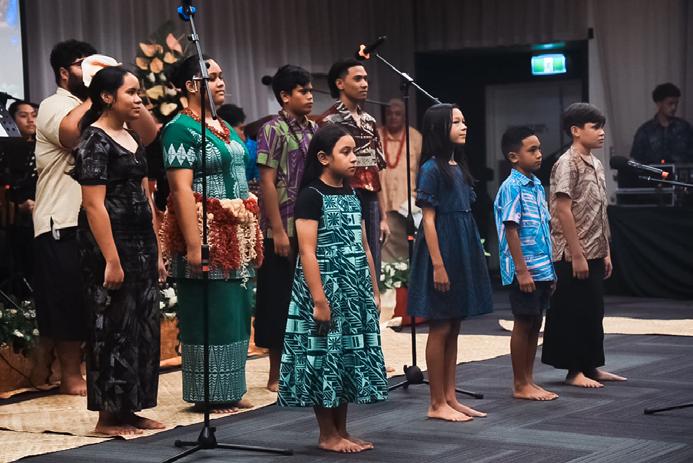
The region will discuss the need for more investment in the culture and traditions that are so rich in the Pacific to drive change and address gaps in ECD. For example, massaging babies is a common tradition of love and connection, but this also comes with health benefits. This includes improving digestion, boosting the immune system, enhancing sleep patterns, and strengthening bonds between parents and young children.
By strengthening these values, young children will be able to get more opportunities for positive physical growth and brain development.
The Forum, hosted by the Government of Samoa, is organized by the Pacific Regional Council for ECD (PRC4ECD) and UNICEF, with the financial support of the Governments of New Zealand and Australia as well as technical support from the Pacific Islands Forum Secretariat.
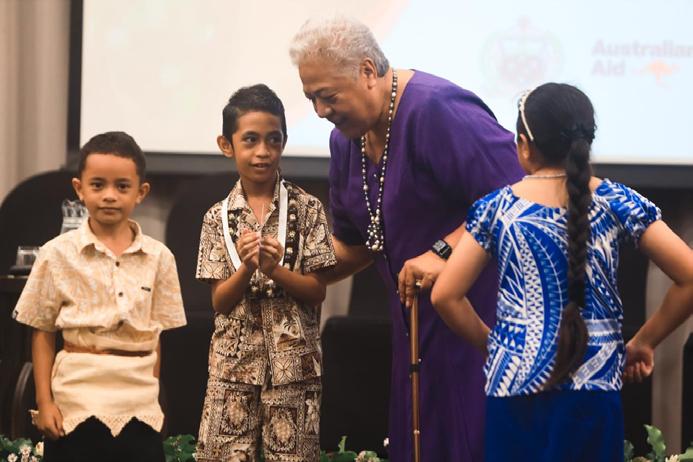
May 23, 2025
Guam--The National Oceanic and Atmospheric Administration’s tropical cyclone outlook for the Federated States of Micronesia and the Republic of the Marshall Islands will likely see below-normal tropical cyclone (TC) activity for the remainder of 2025.
While TC activity across Guam, the CNMI, Yap State in the western FSM and the Republic of Palau is anticipated to be near-normal for the remainder of 2025.
This outlook comes as the Pacific transitions from La Niña to Ensoneutral conditions, according to the National Weather Service and NOAA’s climate prediction center.
During La Niña years, typhoons tend to track farther west. In El Niño years, they shift east.
With Enso-neutral in place, NOAA expects a slight eastward shift compared to 2024, resulting in a typical number of storms for Guam and the Marianas, and fewer for the FSM and RMI.
They advised that even a “near-normal” season can bring strong typhoons.
Storm peaks usually occur between September and November but systems can form at any time, so year-round preparedness is essential.
This outlook is a general guide to the predicted, overall TC activity across the USAPI and does not indicate how many of these systems will actually make landfall.
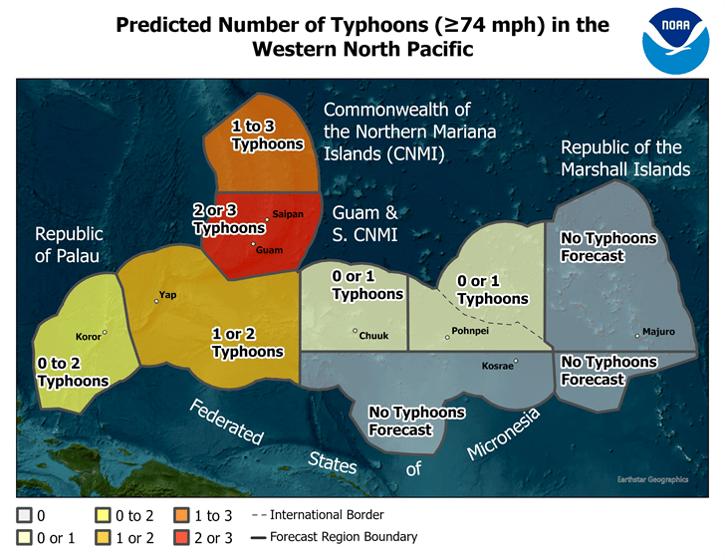

13 May 2025
Suva, Fiji—The inaugural Pasifika Futures Forum officially opened today at the Pacific Islands Forum Secretariat in Suva, bringing together over 150 Pacific Island leaders, policymakers, traditional knowledge holders, youth, disability advocates, and development partners from across the Pacific region.
Hosted by the Pacific Islands Forum Secretariat and the United Nations Development Programme (UNDP) Pacific Office in Fiji – with the generous support of the Government of Australia – the Forum will explore and shape long-term pathways for a resilient, sustainable, and inclusive Blue Pacific Continent.
The Forum follows the launch of the Pasifika Futures Report, a Pacific-led foresight publication that builds on the foundations laid by the 2050 Strategy for the Blue Pacific Continent and the groundbreaking work undertaken by the Pacific Community (SPC). Drawing from Pacific epistemologies and contemporary foresight tools, the report highlights 10 emerging themes – from ocean governance and climate security to technological change and intergenerational decision-making.
Baron Waqa, Secretary General of the Pacific Islands Forum, opened the event and said:
“Our Blue Pacific Continent is the ocean that connects us through our shared culture, diversity, common challenges, and unique vulnerabilities. We must be vigilant of the emerging trends and signals, as our role is to build a region that thrives in unity and resilience.”
Munkhtuya Altangerel, UNDP Resident Representative for the Pacific Office in Fiji, in her opening remarks, said that the forum comes on the back of decades of work across the Pacific community:
“We stand today on the shoulders of remarkable regional leadership: the foresight of the Pacific Islands Forum Secretariat, the pioneering tools of the Pacific Community, and the shared vision laid out in the 2050 Strategy for the Blue Pacific Continent. The future therefore is not something we wait for; it is something we build together.”
Over the next two days, the Forum will host a series of talanoa centred on identity, agency, and adaptive leadership in the face of accelerating global change. Guided by the Pacific concept of wayfinding, the Forum will invite participants to explore how Pacific knowledge systems – grounded in interdependence and connection to place – can guide development thinking and practice in new directions.
The broader Pasifika Futures Initiative aims to strengthen inquiry into how strategic foresight and Pacific

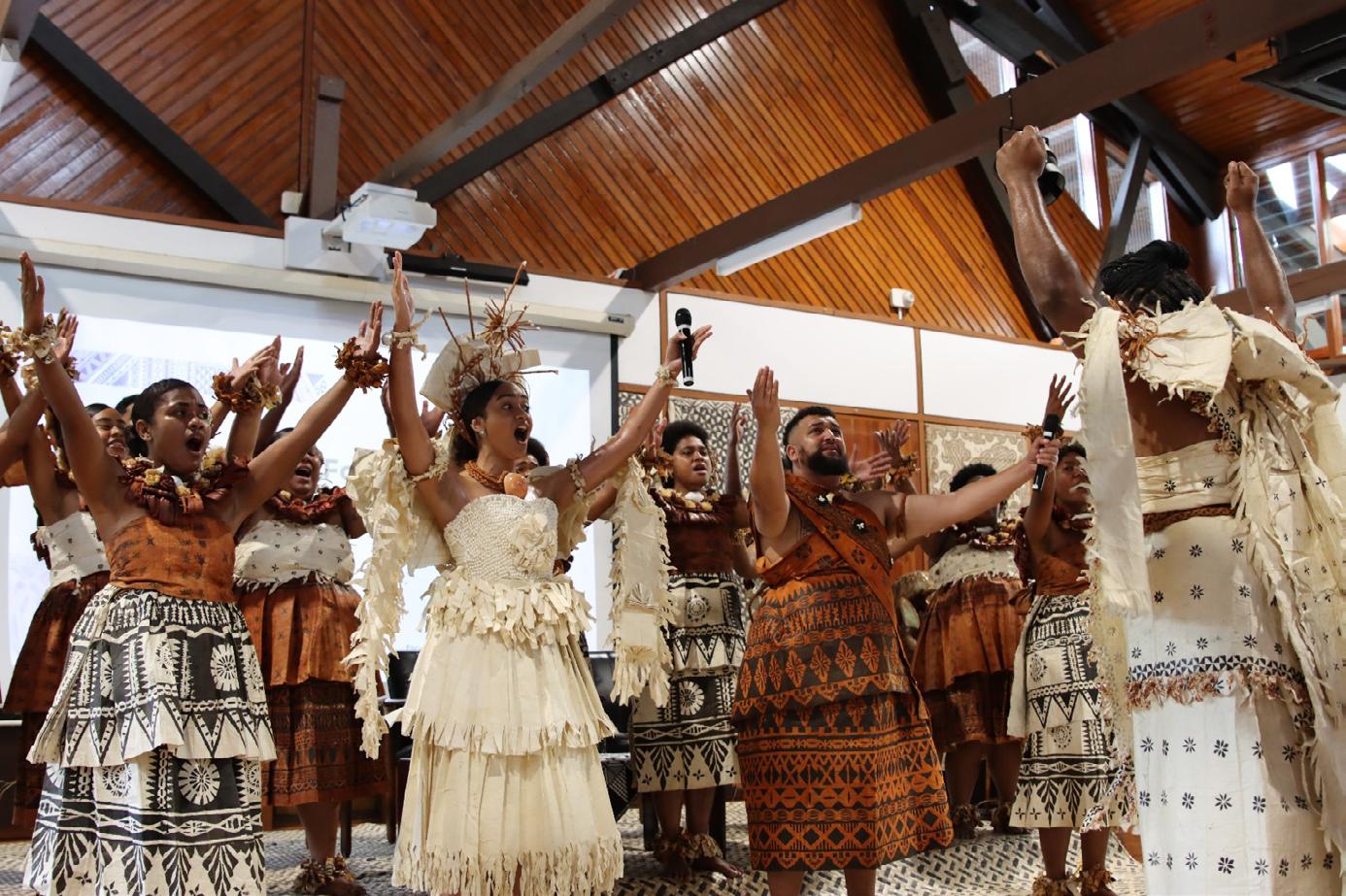
partnerships.
May 16, 2025
Palikir, Pohnpei—The Federated States of Micronesia (FSM) Department of Finance and Administration (DoFA), in partnership with the World Bank, has commenced an intensive training program to support the nationwide implementation of a new Revenue Management System (RMS). This comprehensive capacity-building initiative aims to equip FSM Tax staff with the skills necessary to effectively operate the RMS, which is set to go live in July 2025, a month after the FSM
Financial Officers Conference 2025, which this year will be celebrated in Kosrae between the 13th and 19th of June.
A total of 48 Customs and Tax staff from across FSM’s four states are participating in the training. The program began with an online component from May 13 to June 4, followed by in-person training sessions scheduled from June 23 to July 4. These sessions are designed to ensure that FSM’s tax administration is wellprepared for the operational rollout of the RMS.
The RMS development and implementation are key activities under the World Bank-funded Public Financial Management (PFM) Project. The system is being delivered by IU Networks Ltd, an experienced vendor based in Armenia, specializing in tax administration solutions.
“This training is a critical milestone in modernizing FSM’s revenue management capacity. The RMS will not only streamline tax collection processes but also improve compliance, transparency, and taxpayer services,” said Mr. Randy Sue, Assistant Secretary of the Customs and Tax Administration (CTA).
The RMS will bring substantial benefits to the FSM, including enhanced revenue collection efficiency, real-time monitoring, automated compliance checks, and improved data analytics for informed policy-making. By reducing manual processing and standardizing workflows, the system will also increase operational efficiency across all jurisdictions.
“Modernizing our tax administration through the RMS is essential for

Embassy of the People’s Republic of China
May 20, 2025
Pohnpei—On May 16, 2025, the handover ceremony of the China-aided National Convention Center in the Federated States of Micronesia (FSM) was held in Palikir, the capital of the FSM. Wasalapalap Nahnpwutak Pukiniap, Nanmwarki of Sokehs, along with the Isonahnken, Nahnalek, and Nahnkeniei of Sokehs, H.E. Wesley W. Simina, President of the FSM, and First Lady Madame Ancelly Simina, T.H. Aren B. Palik, Vice President of the FSM, and Second Lady Madame Adelita Palik, T.H. Esmond B. Moses, Speaker of the 24th FSM Congress, T.H. Madame Beauleen Carl-Worswick, Acting Chief Justice, members of the Congress, heads of the States, Secretary of Foreign Affairs, Secretary of Transportation, Communications and Infrastructure (TC&I) and other cabinet members, members of the Diplomatic Corps in the FSM, representatives from the People’s Government of Guangdong
Province of China, the project contractor of China Construction Science and Industry Corporation, and Chinese companies in the FSM attended the ceremony. Nearly 500 people including friends from all walks of life and overseas Chinese were present.
In his speech, Ambassador Wu reviewed the construction of the National Convention Center and stressed that the National Convention Center project was constructed with the personal commitment of the leaders of two countries and it now stands as a landmark for China-FSM friendly cooperation in the new era. The National Convention Center was successfully handed over thanks to the support of both governments and the unrelenting efforts of construction teams from both sides. This is a vivid example of ChinaFSM joint efforts in implementing the Global Development Initiative, the Global Security Initiative and the Global Civilization Initiative, promoting high-quality Belt and Road cooperation, and building
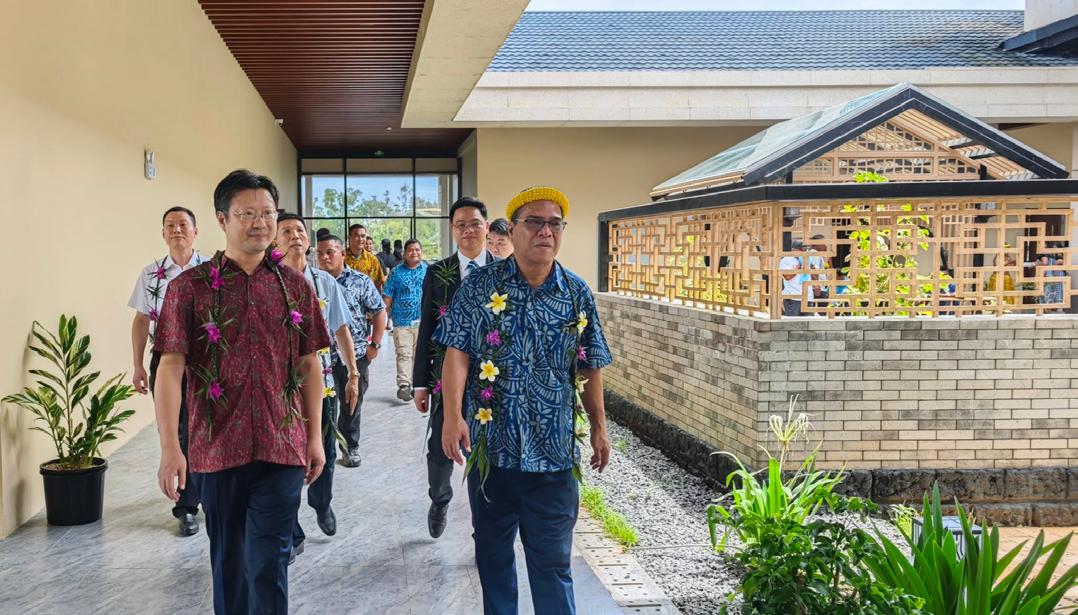
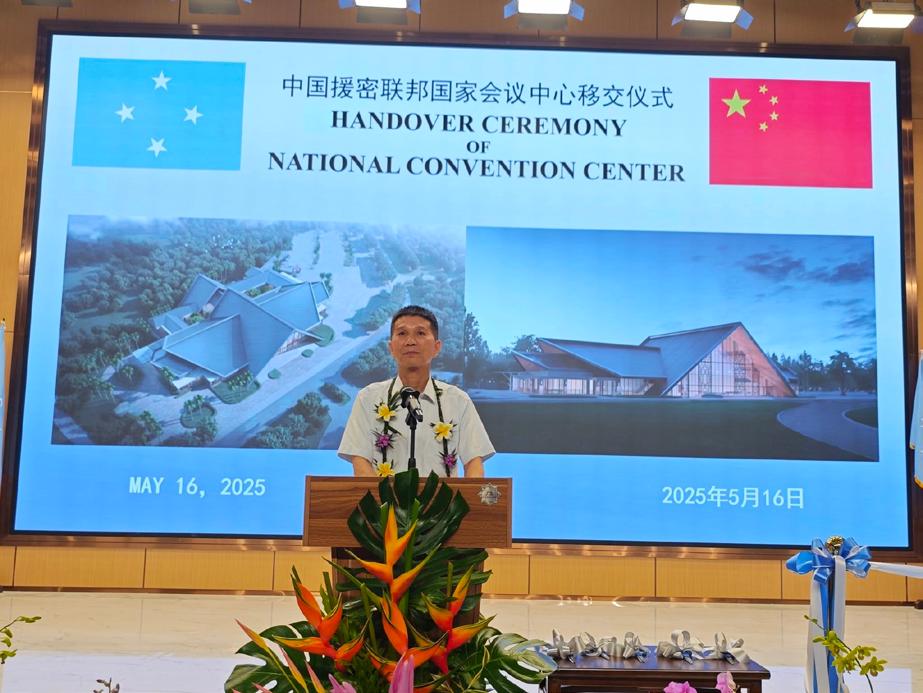
a community with a shared future for mankind. China stands ready to work with the FSM in earnestly implementing the important consensus reached by the two heads of state, deepening practical cooperation in all fields, and advancing the ChinaFSM Comprehensive Strategic Partnership, so as to bring more benefits to the two peoples.
President Simina expressed his sincere gratitude to the Chinese government and people for their selfless help to the development of the FSM. He highly praised the National Convention Center, noting that it is more than a landmark structure of concrete and steel; it is a testament to the generosity and support of the Chinese government. It is a symbol of friendship and a vivid example of the Comprehensive Strategic Partnership between the FSM and China. He also delivered special gratitude to the Guangdong Provincial Government for their immense support and the project contractor for their restless efforts. He said that the FSM will
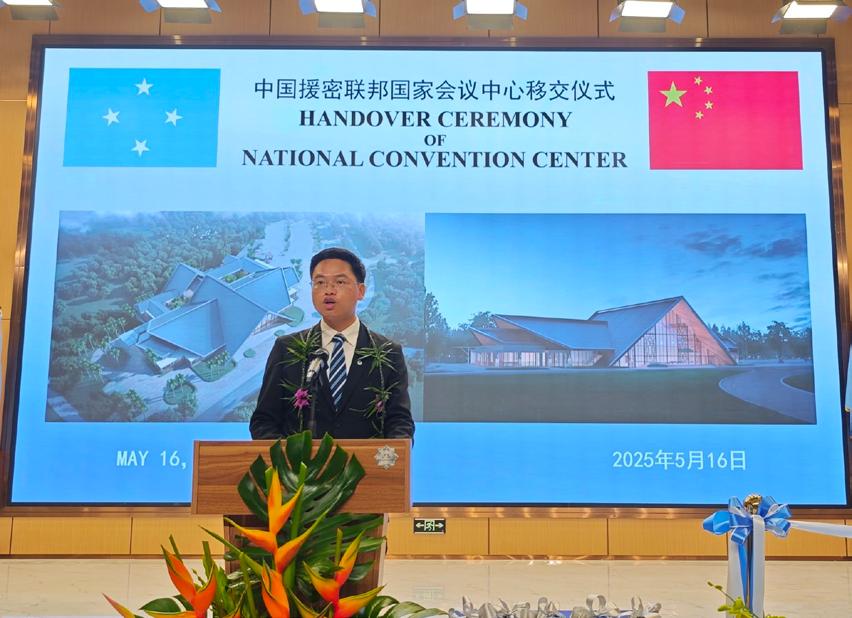
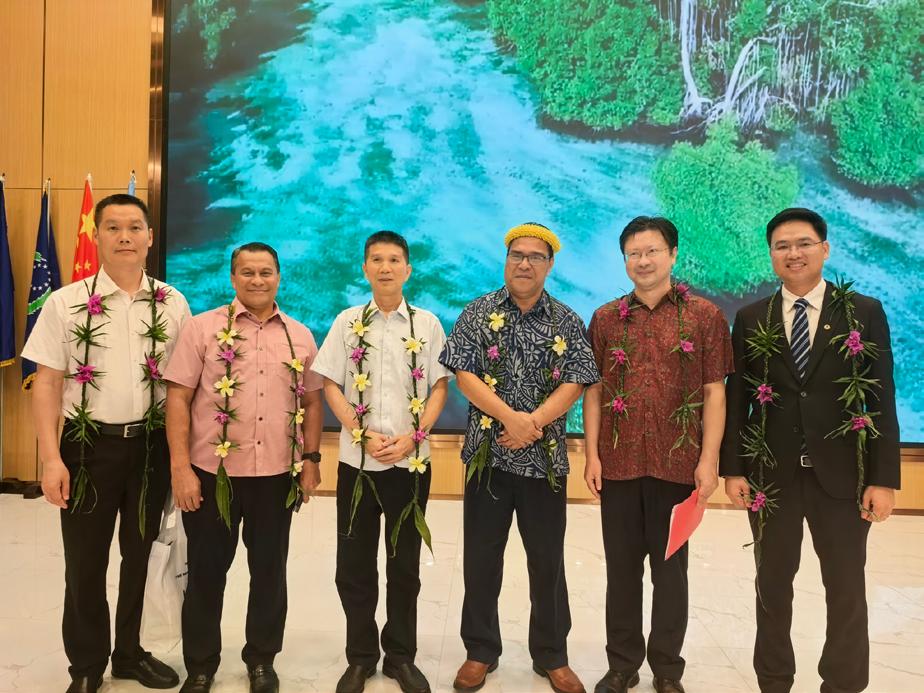
continue to develop the friendly relations with China and to further collaboration in the years ahead, adding a new chapter in the history of our partnership.
Speaker Moses delivered a welcoming speech and expressed gratitude to the Chinese government for aiding the FSM National Convention Center. He praised the Center as a precious gift from the Chinese people that will support FSM’s national development.
In the presence of all the guests attending the ceremony, the two sides signed the handover certificate of the China-aided National Convention Center project and handed over the “Golden Key” of the project. The ceremony was conducted in a solemn and warm atmosphere.
The FSM National Convention Center was aided by Guangdong Province. The construction started in October 2019, and it was forced to suspend due to the COVID-19 and resumed in July 2023.
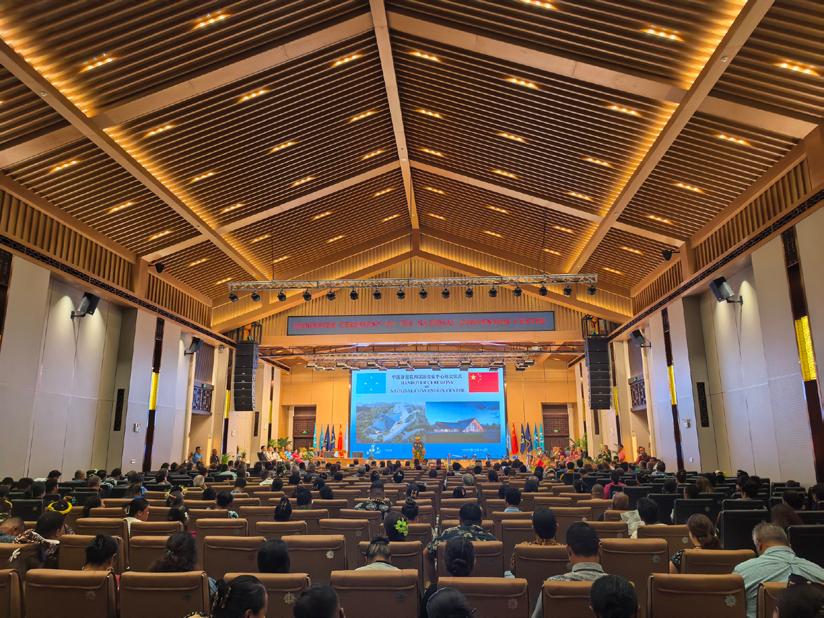


Central Implementation Unit, Department of Finance and Administration
May 19, 2025
Pohnpei, FSM—"This program is not just another initiative—it’s a commitment to our youth, our workforce, and our future,” declared Governor Stevenson A. Joseph, as he addressed students, officials, and development partners at PICS High School during the ceremonial handover of equipment and renovation commencement. “Let’s deliver it with conviction, purpose, and passion.”
The event, part of the FSM Skills and Employability Enhancement Project (SEE Project) funded by the World Bank, marked a key milestone in strengthening vocational education across the nation. Governor Joseph called on teachers and administrators to lead with purpose: “Our students will remember every word you say. Teach not only for the job but for life. Inspire them to be builders of our economy— not just with their minds, but with their hands and hearts.”
Recalling his time in the legislature, the Governor expressed concern about years of declining vocational funding. He praised the performance-based structure of the new program: “This approach demands results—and that’s what we need. I hope this same model applies across other sectors too.”
Also addressing the audience, Assistant Secretary of Education Wayne Mendiola, Jr. shared the vision behind the SEE Project. He pointed to sharp drops in school enrollment after Grade 10—particularly among boys—and explained that many students were simply not engaged by traditional academic pathways. “We are Pacific Islanders. We learn with our hands,” he said. “This project meets our students where they are—by giving them relevant, practical skills.”
He also noted that FSM citizens living abroad often struggle to find goodpaying jobs due to limited vocational training, limiting their ability to support families back home through
remittances. “Whether students remain in the FSM or pursue opportunities abroad, our goal is to equip them with the skills and confidence to succeed anywhere in the world.” Mendiola added.
Mr. Mendiola also praised PICS High School for its commendable progress under the SEEP performance grant program, which provides funding based on tangible results and continuous improvement. He emphasized that such grants not only strengthen vocational education but also hold schools accountable for delivering measurable impact. Mr. Mendiola closed by underscoring the importance of strong collaboration between the National Department of Education (NDOE) and the Pohnpei State Department of Education, calling it essential to sustaining momentum and ensuring that vocational education continues to expand and evolve across FSM.
World Bank Reaffirms Long-Term Commitment
Speaking on behalf of the World Bank, Country Officer Suzanne Lowe Gallen emphasized the project's role in building long-term economic resilience. “We are not just teaching young people how to fish—we are giving them the tools to innovate, lead, and succeed,” she said.
She congratulated PICS High School on completing Year One of the performance grant and highlighted the progress already underway in Year Two, including curriculum upgrades, teacher training, and infrastructure investments. “These classrooms and tools will shape future careers. We’re proud to support FSM’s youth in building sustainable livelihoods.”
The event was also attended by several dignitaries, including Stanley Etse, Director of the Pohnpei Department of Education (PDOE), and Belsipa Miguel Isom, Attorney General of Pohnpei State, alongside faculty, staff, contractors, and—most importantly— the students of PICS High School.
Each was recognized for their continued commitment to empowering
young Micronesians through education, collaboration, and leadership.
The ceremony concluded with a symbolic equipment handover, as Assistant Secretary Wayne Mendiola, Jr. formally presented a Performance Grant Years 1 & 2 “trophy” to Director Stanley Etse of PDOE, representing the strong partnership between national and state education departments in advancing youth opportunities.
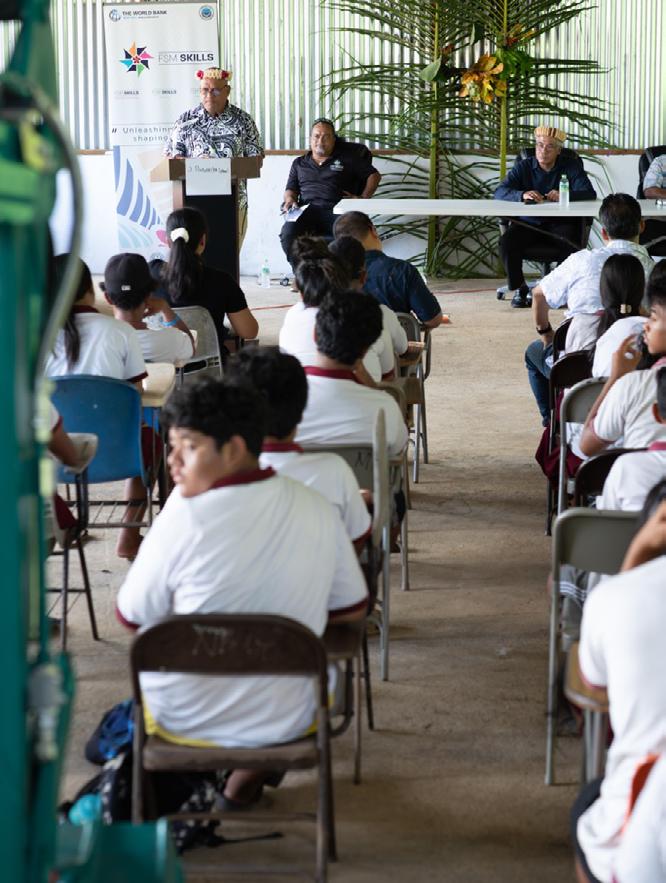
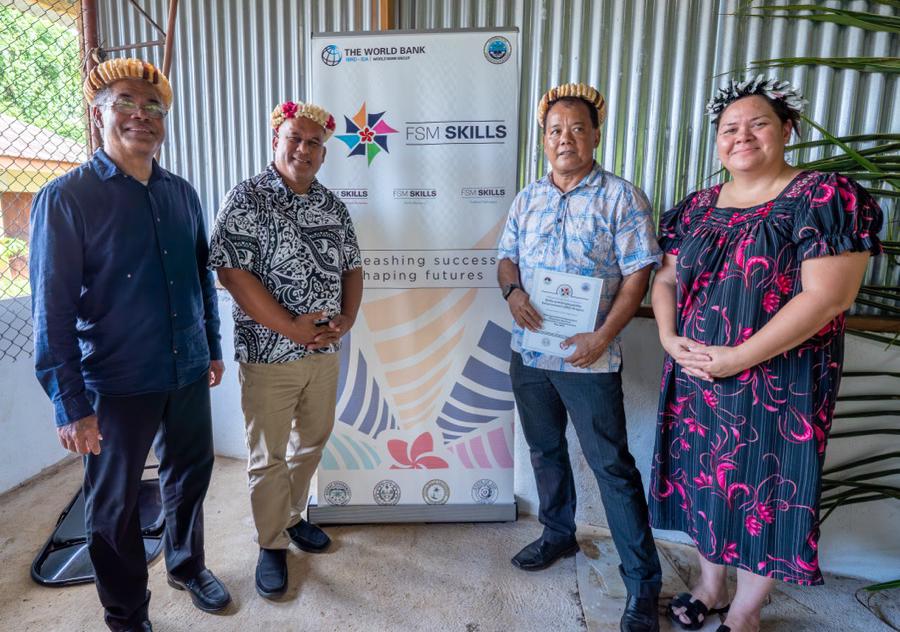

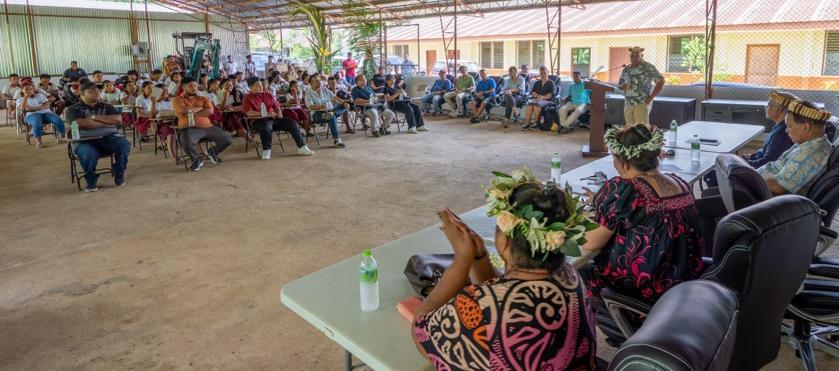

April 3, 2025
Pohnpei, FSM—The World Bank and the Government of the Federated States of Micronesia (FSM) have reaffirmed their strong partnership through a highlevel Joint Country Portfolio Performance Review (CPPR) aimed at bolstering the performance of a growing and impactful development portfolio.
With 10 active projects totaling US$344 million, the World Bank’s support is helping to drive transformative change across key sectors in FSM —from improved connectivity, boosting access to jobs and training, and improving public services. Hosted at the World Bank’s North Pacific Office in Pohnpei, the CPPR brought together government officials, project teams, and development partners for a full day of technical discussions focused on accelerating progress, addressing delivery challenges, and ensuring real impact for communities across FSM. The World Bank’s portfolio in FSM continues to grow and now includes two new projects— the Strengthening Public Financial Management Phase II and the Access and Renewable Increase for Sustainable Energy Project—recently added.
Opening the event, Honorable Sohs John, Deputy Secretary of the Department of Finance and Administration (DoFA), emphasized the importance of collective ownership and accountability. “This portfolio review is a chance for all parties— implementing agencies, departments, and our key partner the World Bank—to reflect on how to further improve implementation, with the goal of ensuring timely delivery so that project benefits can be seen and felt by the people of FSM,” he said.
Continued from page 31
strengthening domestic revenue mobilization and fostering greater trust in the system. This initiative reflects FSM’s commitment to good governance and financial sustainability,” stated Mrs. Rose Nakanaga, Secretary of DoFA.
The training also emphasizes the RMS’s user-friendly interface, mobile
The agenda included detailed sessions on flagship projects such as the FSM Skills and Employability Enhancement Project (SEE), the Digital FSM Project, the Sustainable Energy Development and Access Project (SEDAP), the Pacific Regional Connectivity Program, and major road infrastructure initiatives like the Strategic Climate-Oriented Road Enhancements (SCORE) and the Prioritized Road Investment and Management Enhancements (PRIME). Each session offered a platform to present updates, highlight systemic issues, and outline clear, time-bound actions.
“The World Bank’s growing portfolio in FSM is delivering real results for the people of this country—supporting job creation, expanding access to essential services, and helping government institutions better serve communities,” said Mr. Omar Lyasse, World Bank Resident Representative for FSM, RMI, and Palau. “We are proud of the progress made, and are committed to work with the government to build capacity for improved implementation across the portfolio for the people of FSM.”
Assistant Secretary Senny Phillip, who led the CPPR planning alongside her colleagues at DoFA and the Central Implementation Unit (CIU), underscored the importance of inter-agency coordination. “This CPPR was a joint effort, organized with dedication from across departments. Our goal is not just review but continuous improvement,” she said. “We appreciate the responsiveness of all implementing units and the guidance from the World Bank team.”
One session of particular focus was the FSM Skills and Employability Enhancement (SEE) Project, which highlighted how critical this year is for the project and its stakeholders. Key activities, such as school
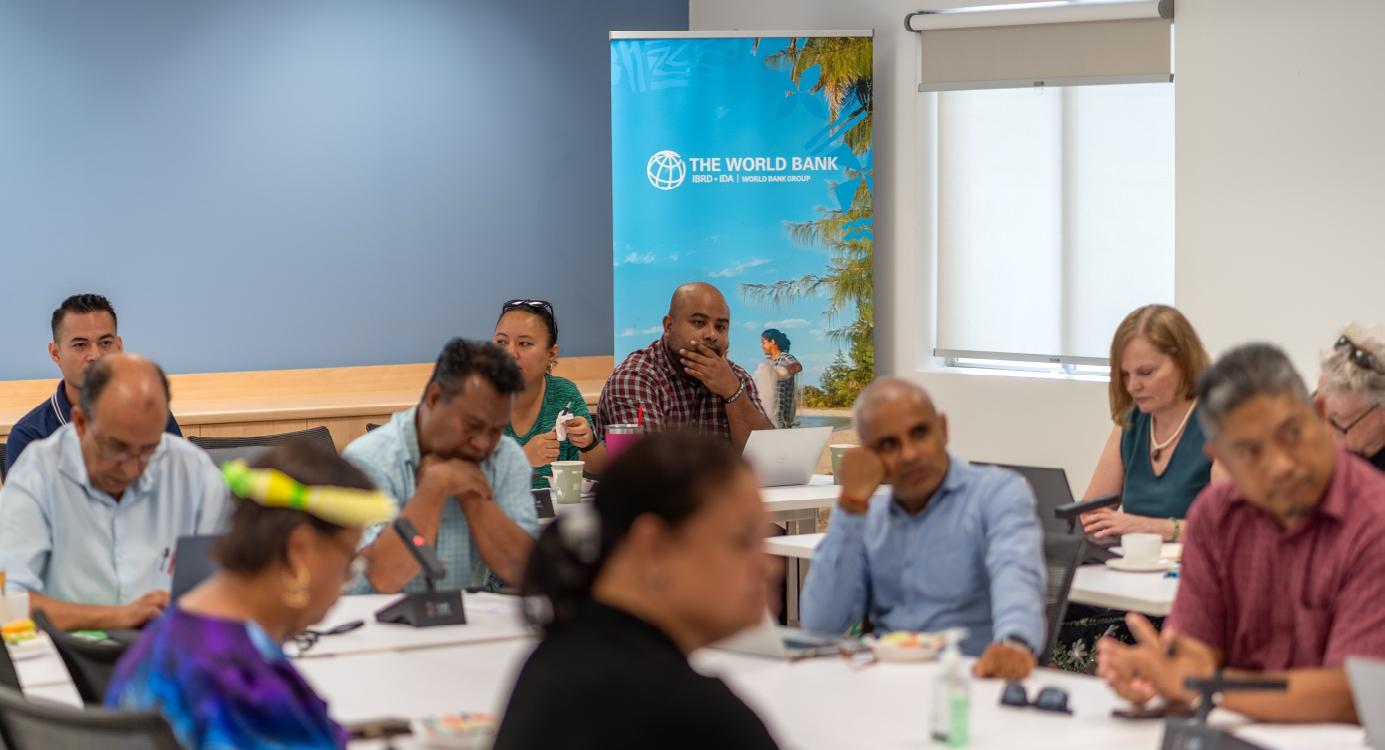

facility construction, new curriculum development, and the training of master trainers, are currently underway. Hyunjeong Lee, SEE Project Manager, acknowledged that while challenges remain, the overall progress has been encouraging. "We’re proud of the progress and the collaborative spirit shown by all stakeholders,” she said. She added that disbursements are expected to continue improving as implementation advances.
Ms. Karlene Collette Francis, Senior Operations Officer for the World Bank, who co-moderated several sessions, commended the country’s momentum. “FSM’s portfolio
accessibility, and improved taxpayer services, ensuring that tax processes are more convenient and transparent for citizens.
“With this RMS implementation, we are not just introducing new technology — we are introducing new processes and enhancing the way we serve our taxpayers and manage public funds. This training ensures our team is fully prepared to make the most of the RMS” added Mr. Andrew Haigh, Tax Administration Advisor and RMS Implementation Lead.
The FSM RMS Go-live is scheduled for July 2025, marking a significant step forward in the country’s efforts to strengthen public financial management and support broader economic reforms.
is growing in complexity and ambition, but the government has shown strong leadership. We are confident that with continued coordination and proactive risk management, we can exceed this year’s implementation targets,” she stated.
The CPPR also laid the groundwork for upcoming engagements, including further technical missions and strategic discussions to support FSM’s development goals. With just a few months remaining in the fiscal year, the joint review served as both a stock-take and a recommitment to shared priorities: transparency, inclusion, and impact.
